Pay online
Privacy notice
Contact us
Map
Client login
01332 202660
e-signing
guide
Pay online
Privacy notice
Contact us
Map
Client login
01332 202660
e-signing
guide
TERMS OF YOUR CONTRACT
TERMS OF YOUR CONTRACT
CONTRACTING & IR35 CASE LAW

IR35
IR35
YOUR WORKING PRACTICES
YOUR WORKING PRACTICES

OUR
PROCESS
GET IN TOUCH
WITH US
GET TO KNOW
US
>>> HMRC Employment Status Tool <<<
Contractor Pages ► Contractors & Freelancers ■ IR35 & Personal Service Companies ■ IR35 Advice ■
At some point during an IR35 enquiry it may be necessary to refer to useful case law to help a contractor support an aspect of their contractual arrangements.
Over the years the courts have laid down a number of tests which should be considered in determining employment status.
It is the principle established by a court in a particular case that is important as it may set a binding precedent but even then the courts may restrict or widen the application of a principle established in an earlier case.
IR35 has been with us now for over a decade and during that time there have been numerous cases that have been heard before the Special Commissioners (now Tax Tribunal), but fewer have proceeded to a higher court. Whilst Special Commissioners/First Tier Tax Tribunal decisions are useful to refer to they do not set legal precedents in the way that court decisions do and therefore do not carry the same weight. HM Revenue & Customs refer to some of these cases in their own manuals and it is useful for contractors to be aware of these and the status issues they relate to.
March 2015, David Gauke, Financial Secretary - Treasury "Four IR35 cases have progressed to Tribunal in the last 5 years, all in 2011. These tribunal actions represented civil litigation and in all four cases the customer’s appeal was allowed."
01332 202660
61 Friar Gate Derby DE1 1DJ
JLJ Services Limited v HMRC 2011 FTT - IR35 outside, then inside
IR35 and a Six Figure Tax Bill
The latest IR35 case to be publicised is that of an IT contractor who has been left with a bill for unpaid taxes, national insurance contributions and penalties totalling £141,000, following a four year battle with HMR&C. The case has really set the cat amongst the pigeons because previously significant factors, which were relied on in all previous IR35 cases, were considered to have little or no impact in this case.
John Spencer, 66 and now retired, was operating through his own limited company, JLJ Services Ltd, for the end client Allianz. Clearsky Accounting provided the accountancy services for Spencer's limited company and had originally deemed that his working practices fell outside of IR35. HMR&C disagreed and ruled that the contracts between 2000 and 2007 were all caught by IR35, and therefore, Spencer was liable for the outstanding tax and NI contributions across the whole 7 years. In a recent appeal, however, it was accepted that IR35 did not apply for the first 3 years, until 2003, when Spencer became integrated into the client's business and 'regarded as an employee'.
The main points of the case were:
The Right of Substitution (RoS) clause in the contract was added, in the words of the tribunal judge, to achieve the desired tax purpose and that it had 'virtually no bearing on their approach to deciding the case'. As a one man limited company, Spencer had no other employees to send in his place, in the event that he was unable to do the work himself and Allianz would have had to interview any substitute to confirm suitability. The judge stopped short of calling it 'a complete sham' but intimated that the clause was added purely as 'window-dressing'.
Control - Spencer changed from being on a series of different contracts for specific projects to having a rolling one year contract that was extended repeatedly over four years. During this period the client could ask him to work on any tasks, rather than have him undertake specific projects. This change in control was considered 'breaking the link with projects, and indicating that Mr. Spencer would work generally within the organization' and therefore placed him inside IR35 from 2003.
Financial risk – The judges disagreed that suffering financial loss if the agency went bankrupt was an indicator towards being in business on one's own account. It was further clarified that 'the sort of financial risk that sustains the 'own business' status is the loss, or the diminished profit that results from costs not being controlled' e.g. rectifying mistakes at your own cost and/or time.
Own Business - Mr Spencer failed the own business test because he was working under the direction, supervision and control of Allianz, ergo displayed characteristics of being an employee of the company. The judge stated that 'no opportunity to make more or less profit according to how efficiently he worked, how he managed to minimise and control costs and manage the cost of tools, assistants etc that would be involved if he was conducting a business in the ordinary sense. Mr Spencer was simply paid for hours worked.'
Mutuality of Obligation (MoO) – Allianz offered either employment or indefinite engagement in late 2003 and moved to a pattern of annual renewals on a non-project basis, which Mr Spencer continued to accept. The judge commented 'It seems perfectly evident to us that from that date onwards, Allianz regarded Mr Spencer as someone who they wished to engage and retain indefinitely, and when Mr. Spencer continued to work for Allianz, and accepted yearly contract extensions, it seem realistic to say that his status must have changed.'
Significantly the judge commented about the MoO test 'there is considerable case law in relation to this test, progressively indicating that the test is of diminished importance, or that it is indeed nearly meaningless'. MoO was previously a major consideration when determining ones status under IR35 so this latest revelation will really affect people's tax planning arrangements going forward.
The parties' intentions, which were that Mr Spencer was not to be considered an employee of the company, were reflected in the contract but were dismissed as having 'little or no importance' as the clause did not actually reflect the reality of the arrangements.
Lessons for contractors
Avoid long-term contracts - If contracts are extended, ensure that each one is a new contract and that it is for a specific project. Beware of morphing into the behaviours of an employee and becoming ‘part and parcel’
Get the story straight with the client - Spencer’s client provided evidence that put him clearly inside IR35 in the latter years of his contract. By agreeing in writing with the client the nature of the client-contractor relationship from the outset, HMRC can be halted in its tracks.
Marlen Ltd v HMRC 2011 FTT - IR35 outside
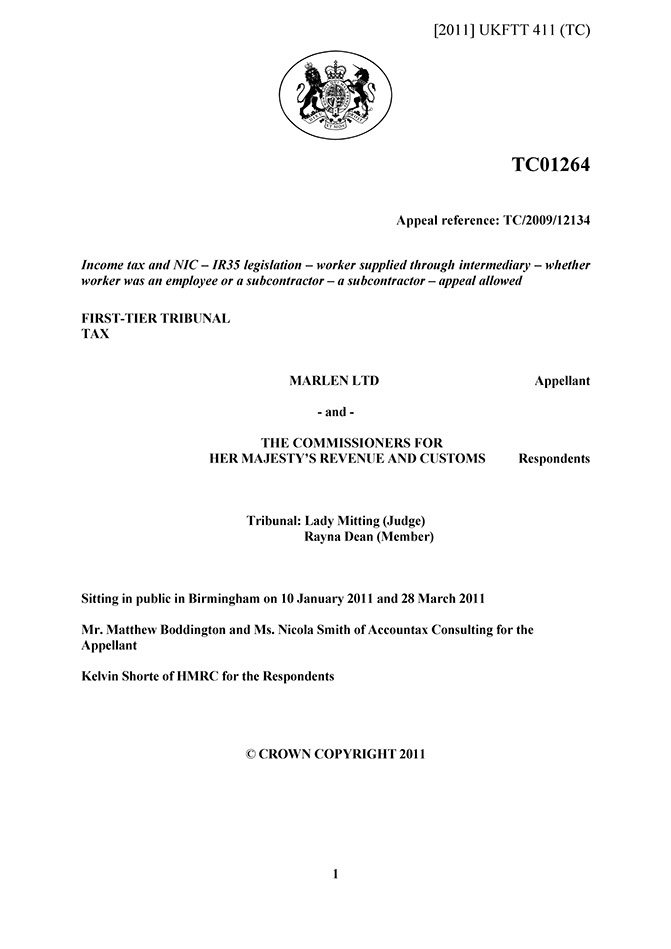
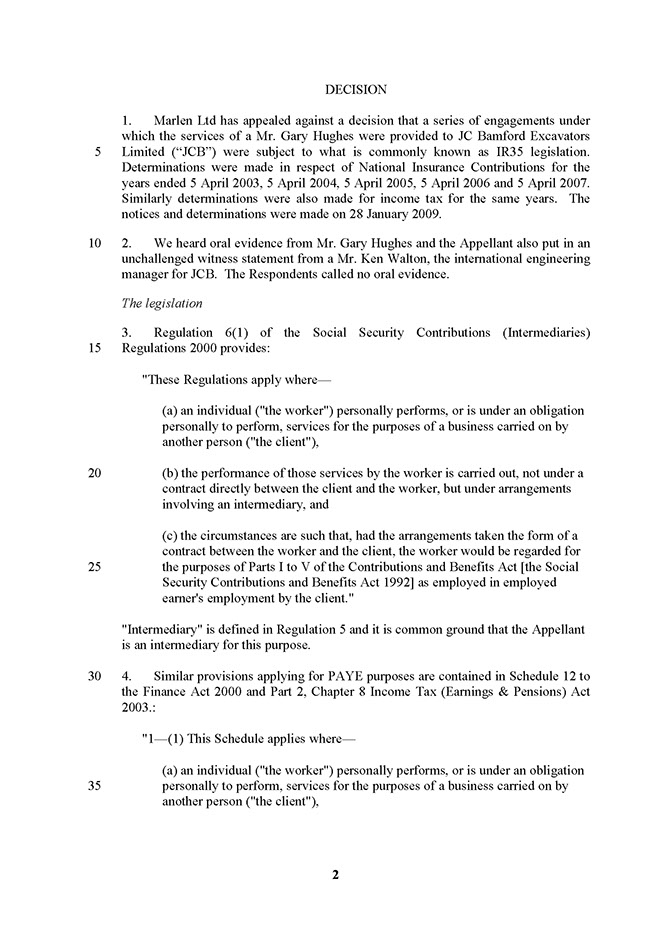
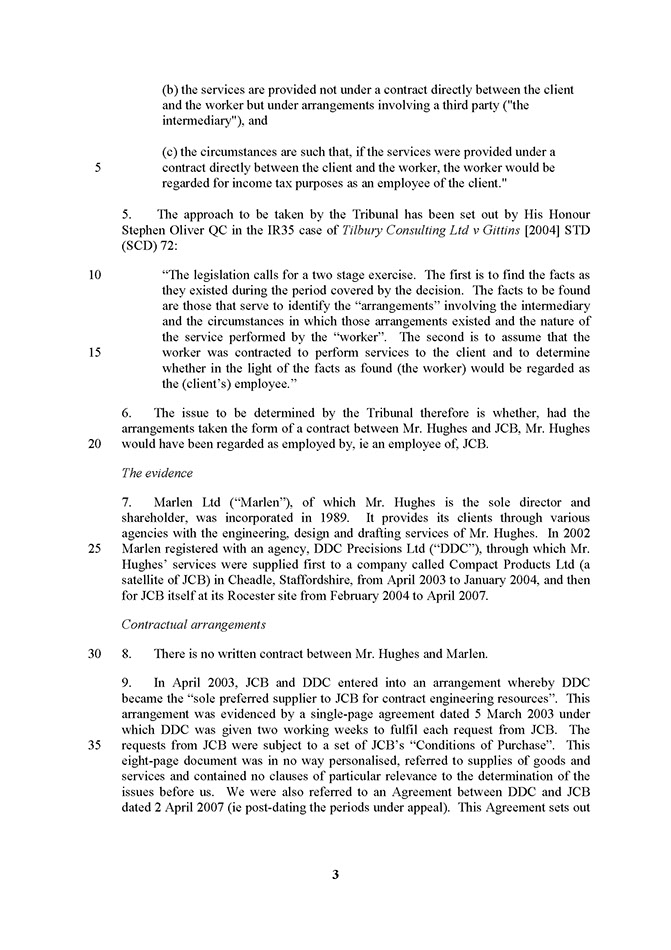
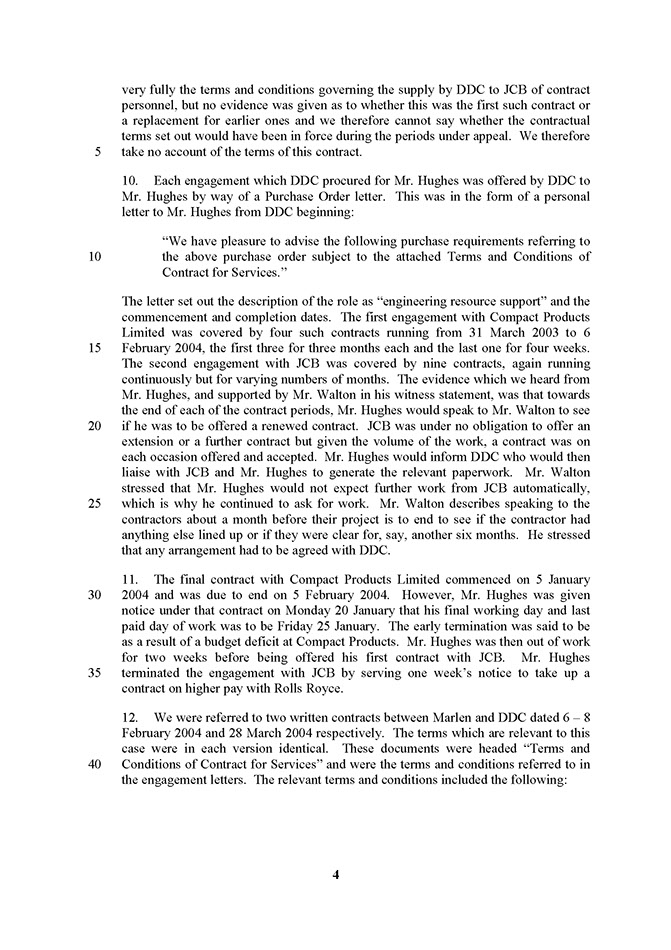
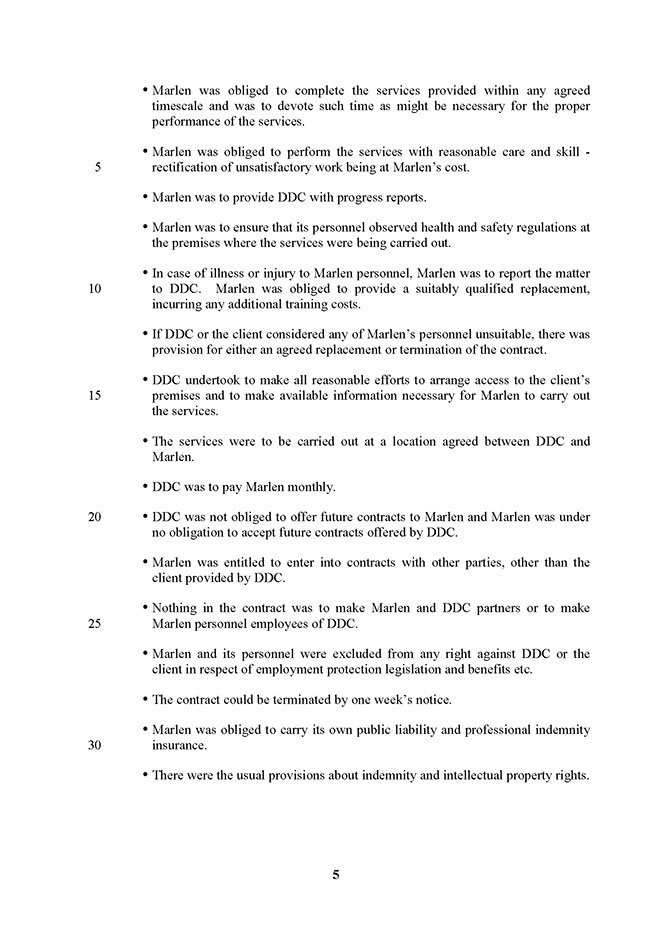
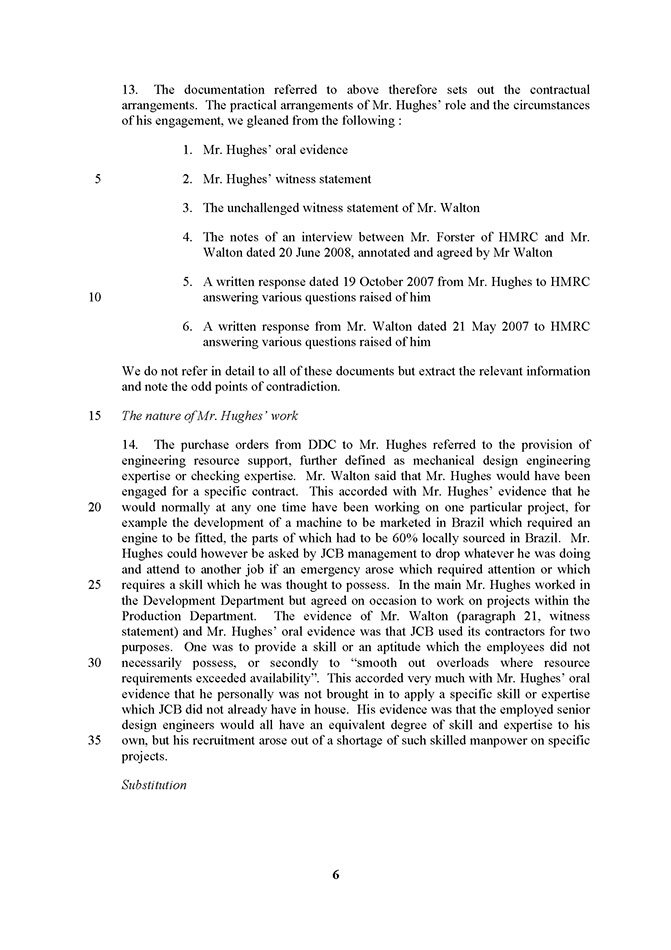
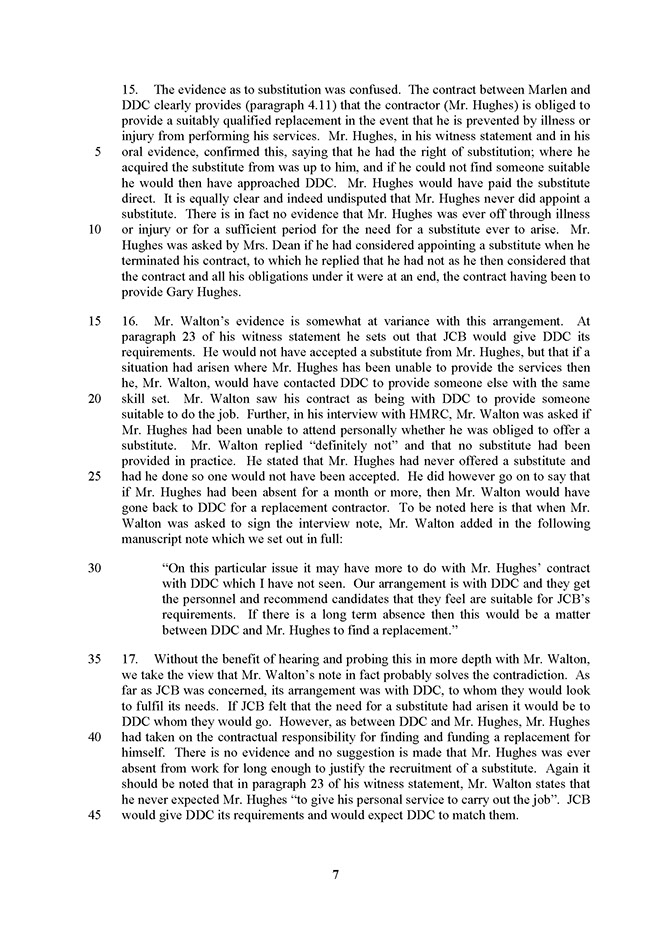
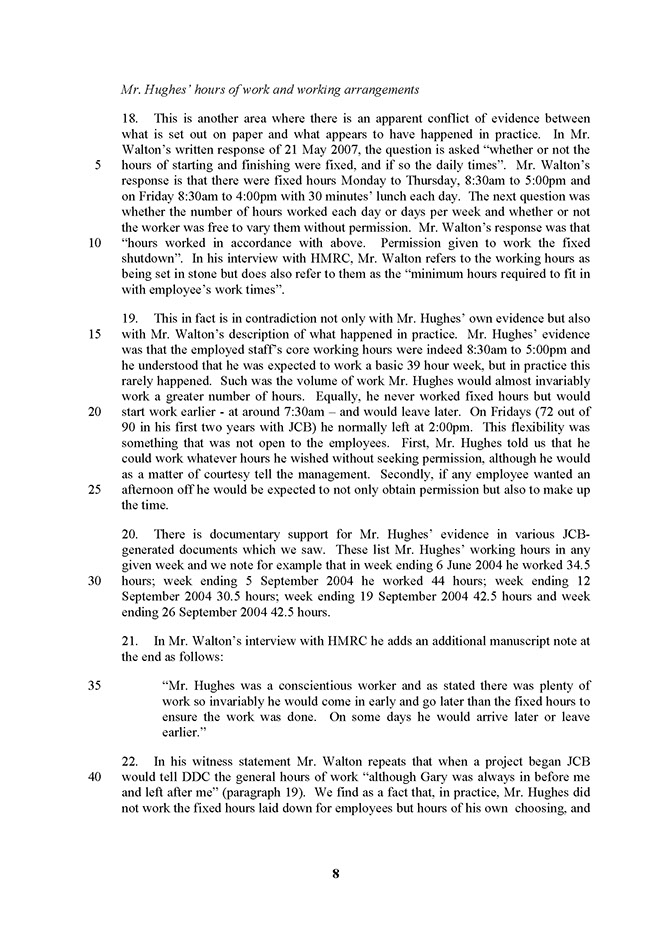
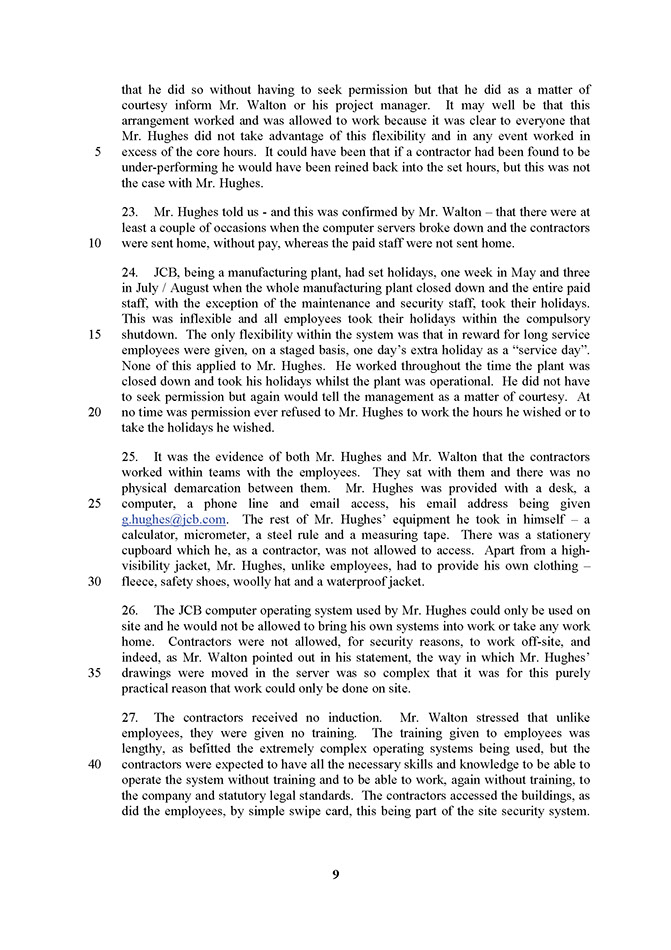
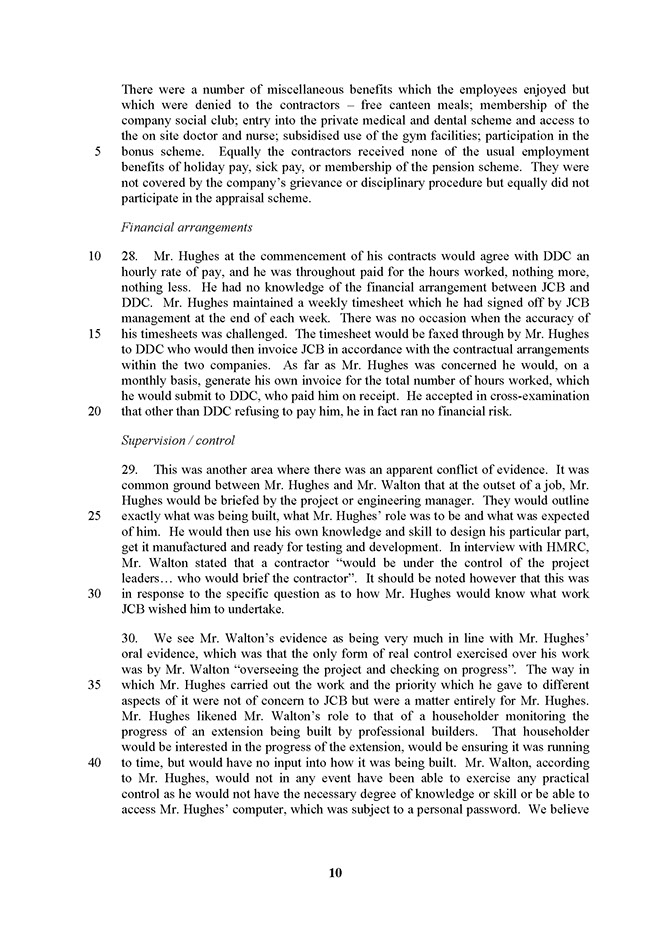
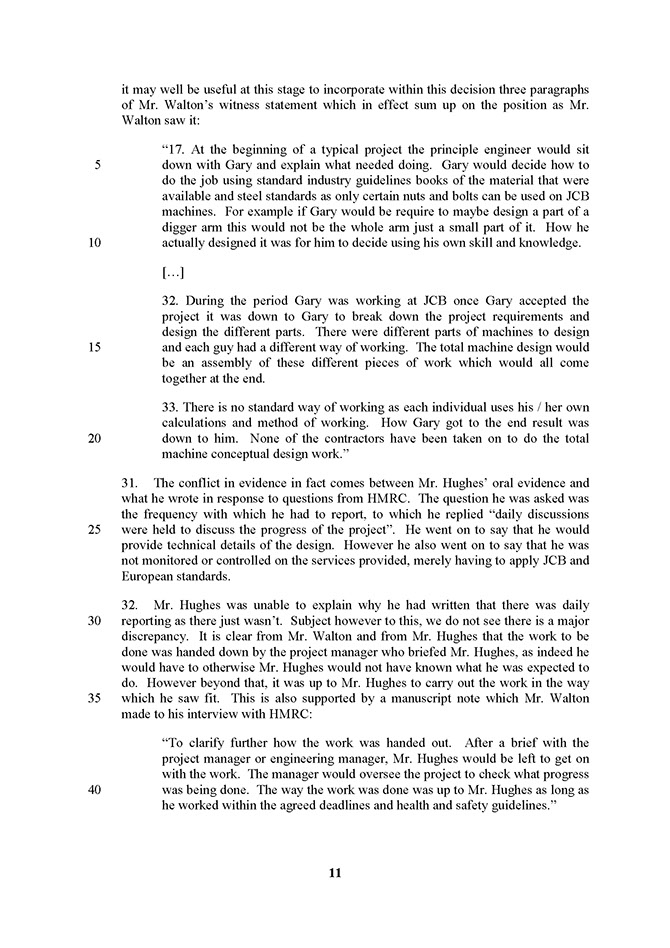
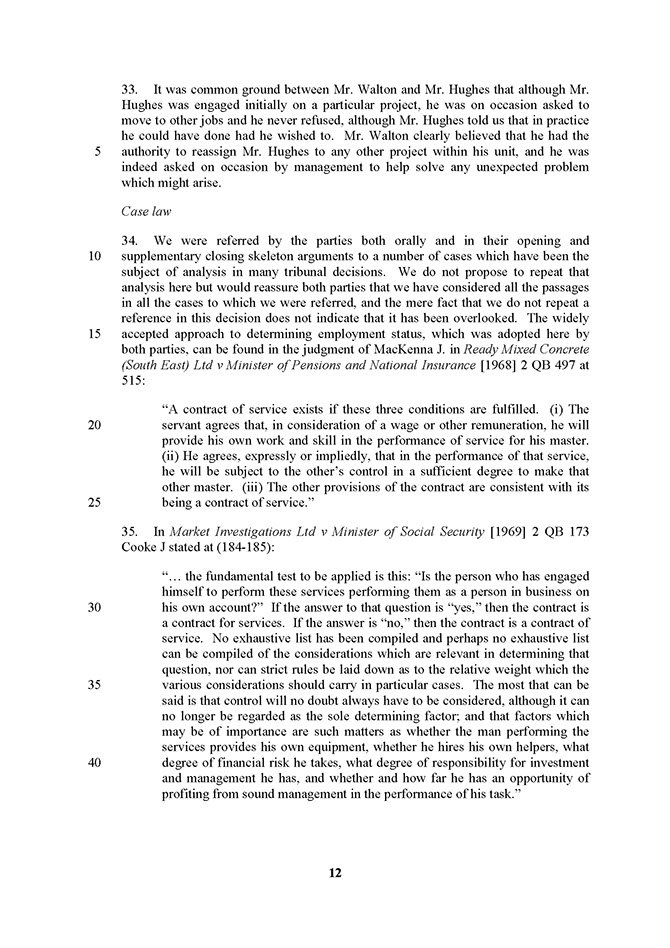
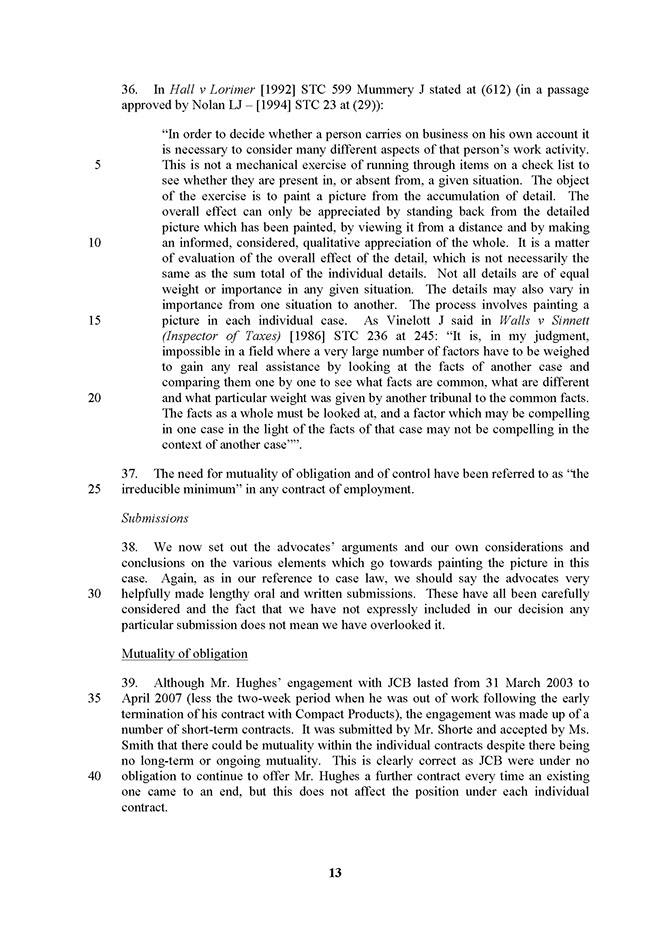
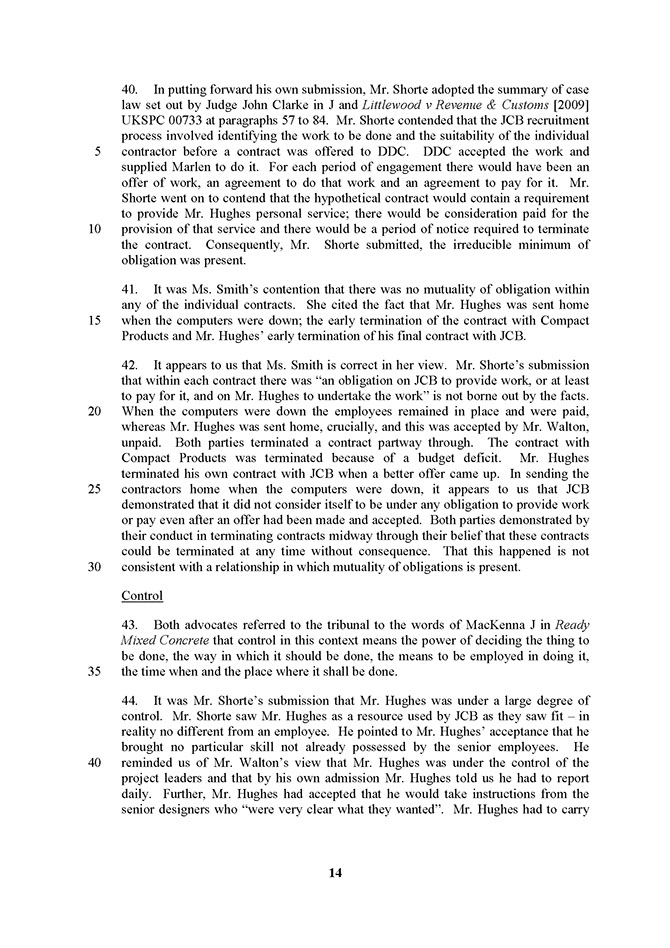
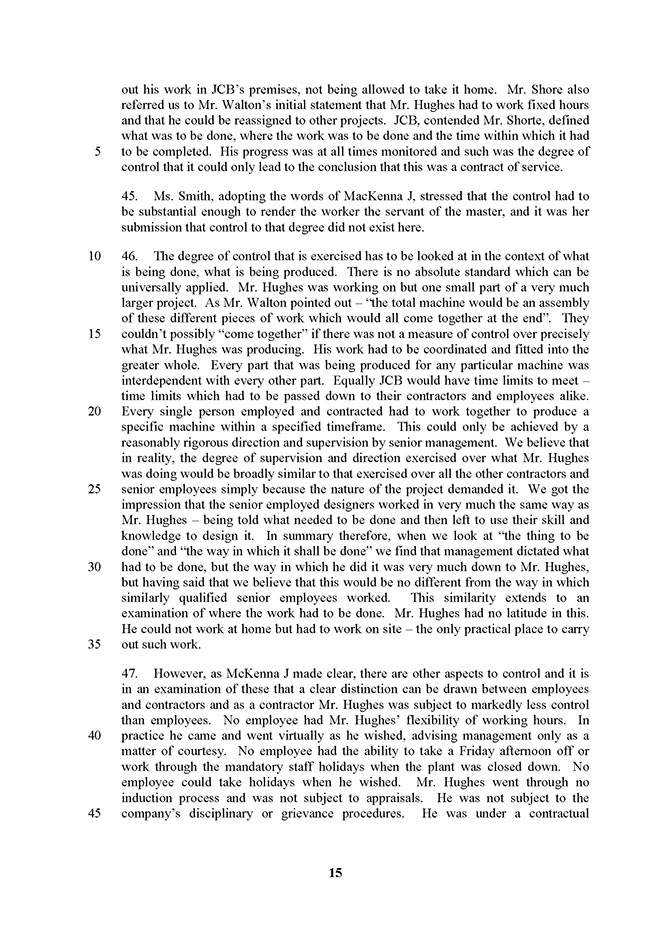
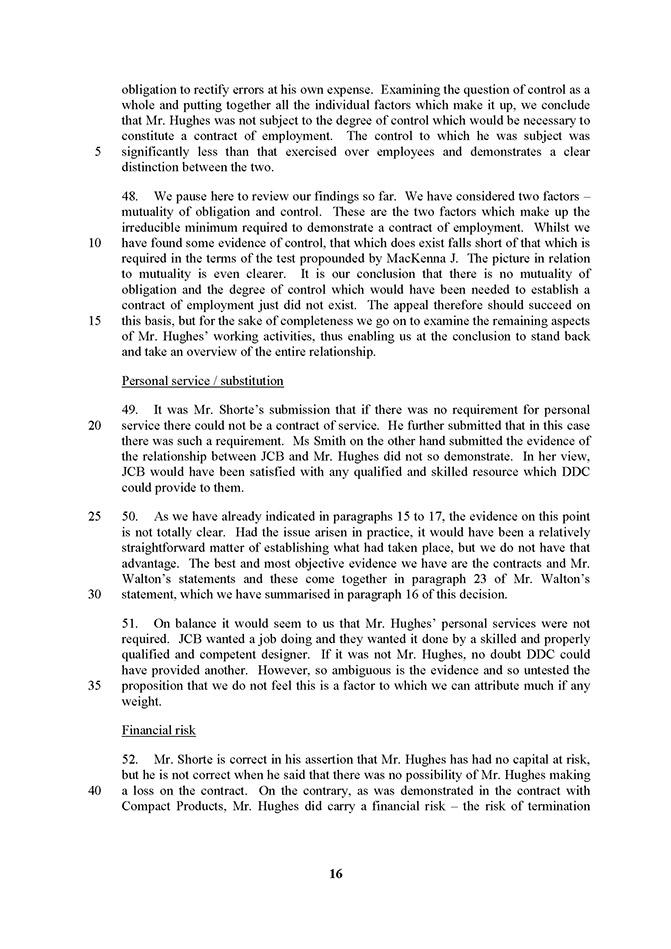
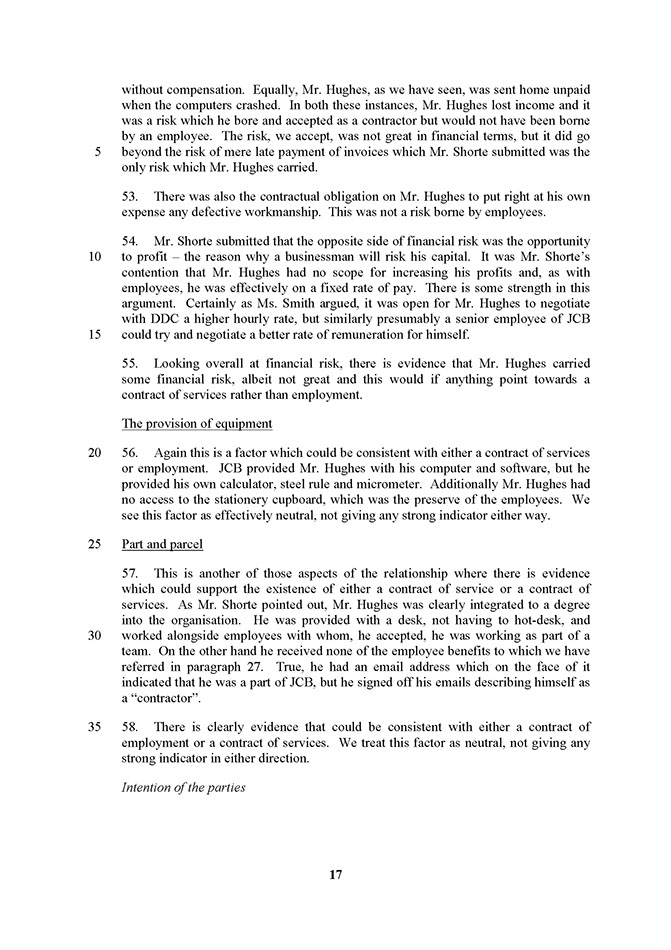
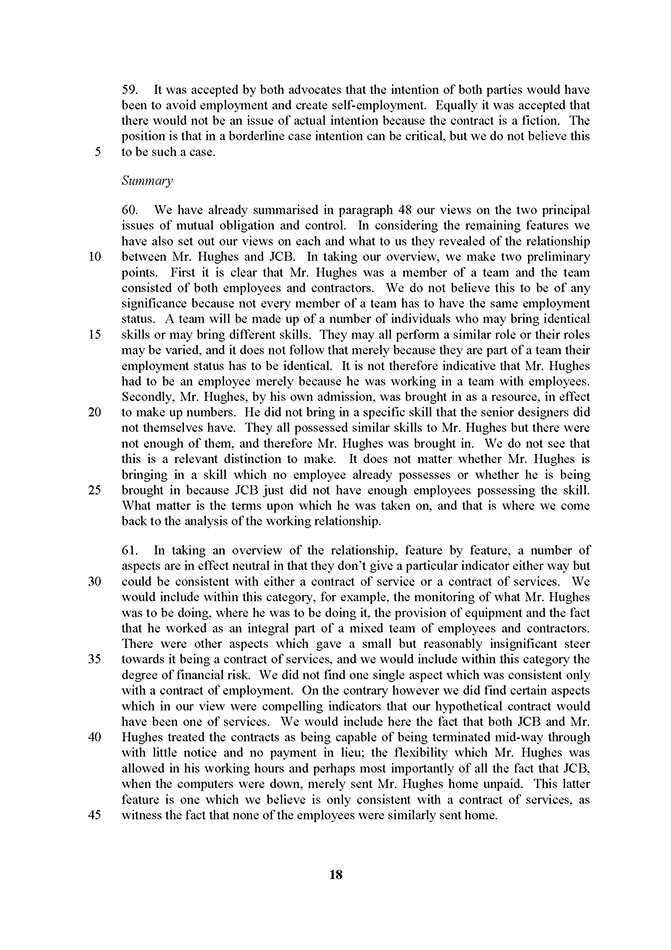
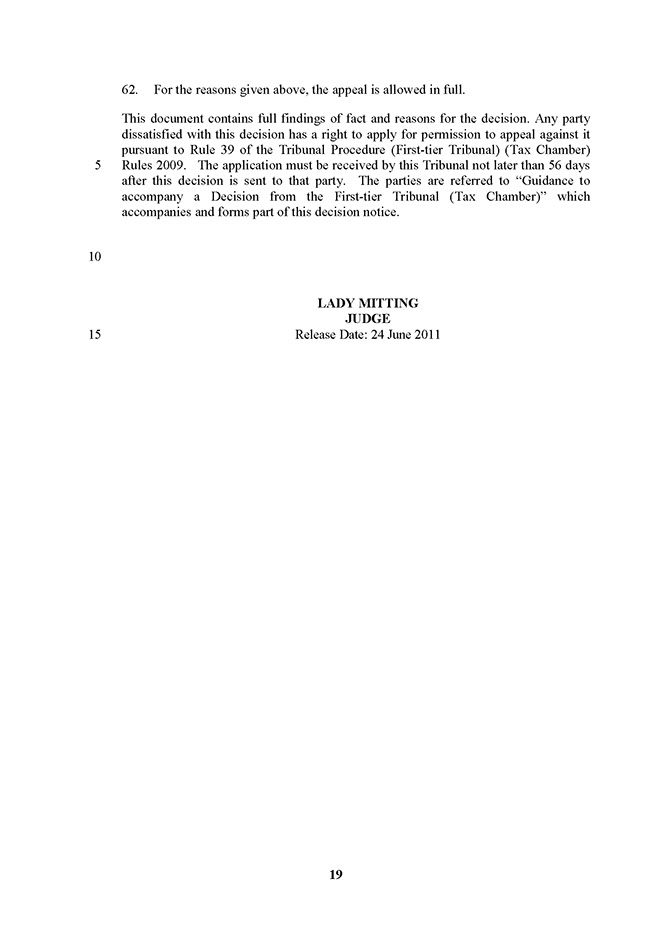
ECR Consulting v HMRC (2011) FTT - IR35 outside
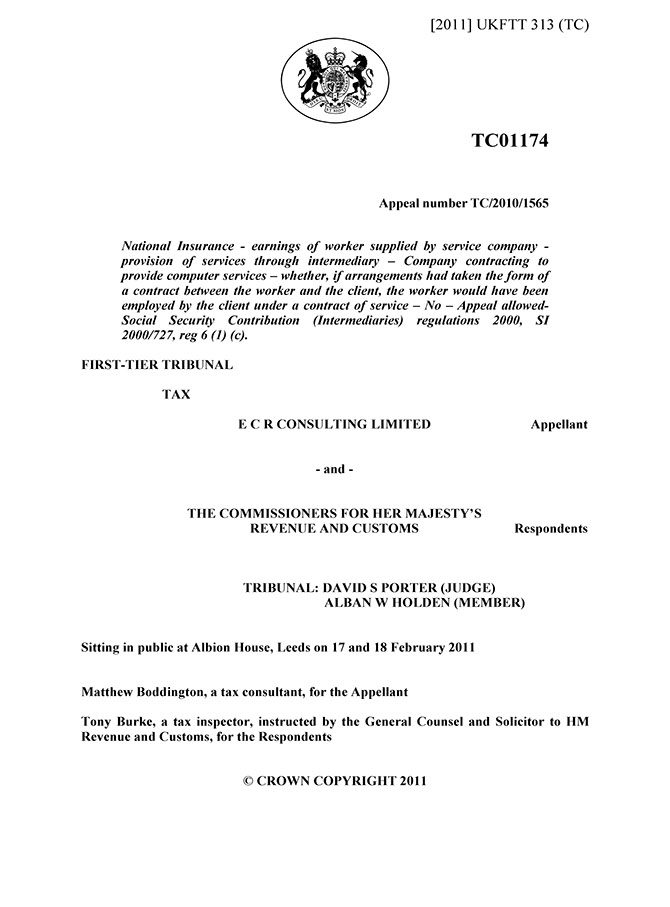
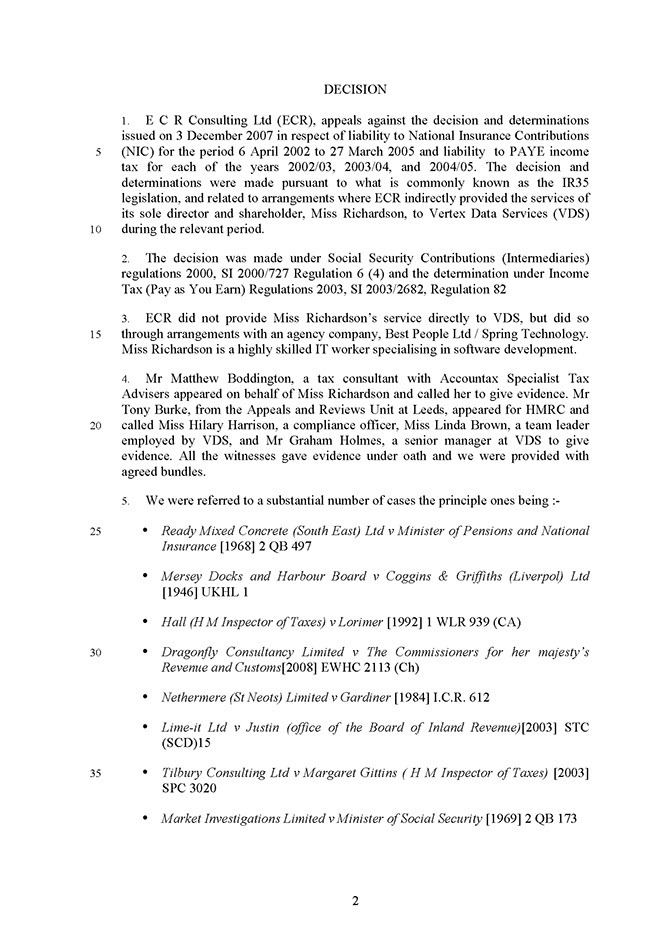
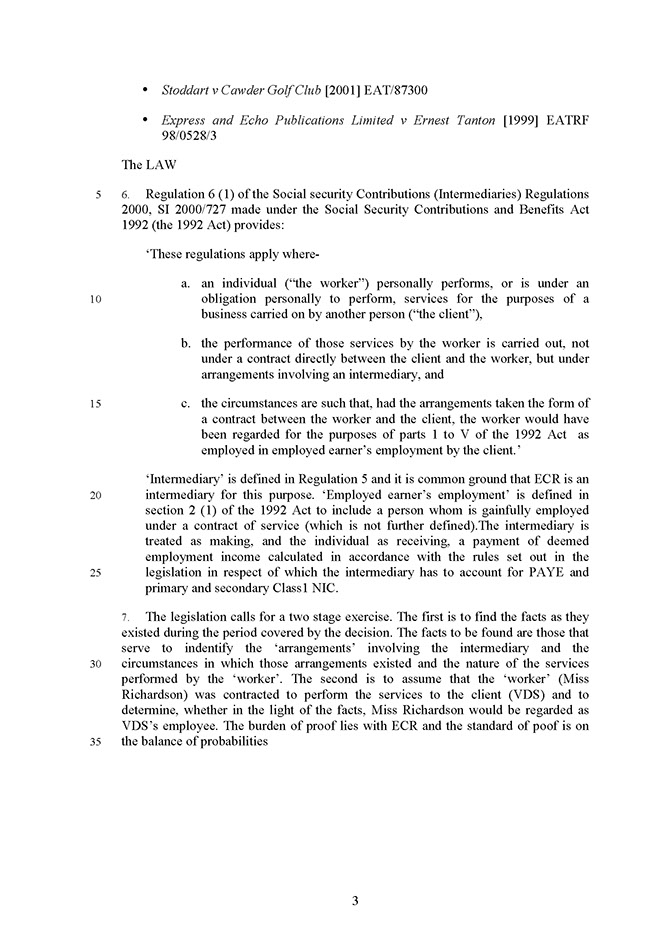
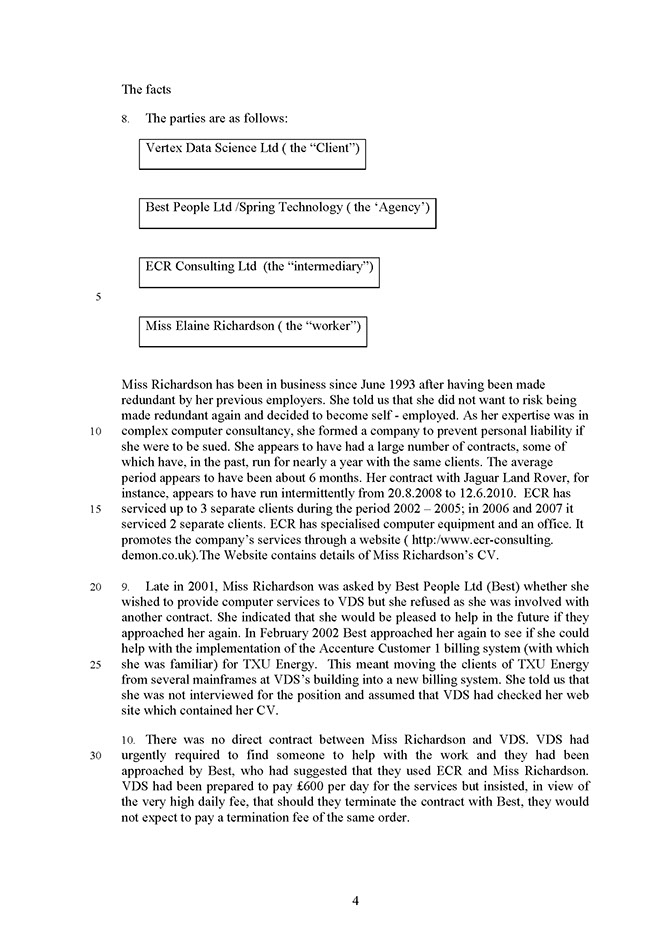
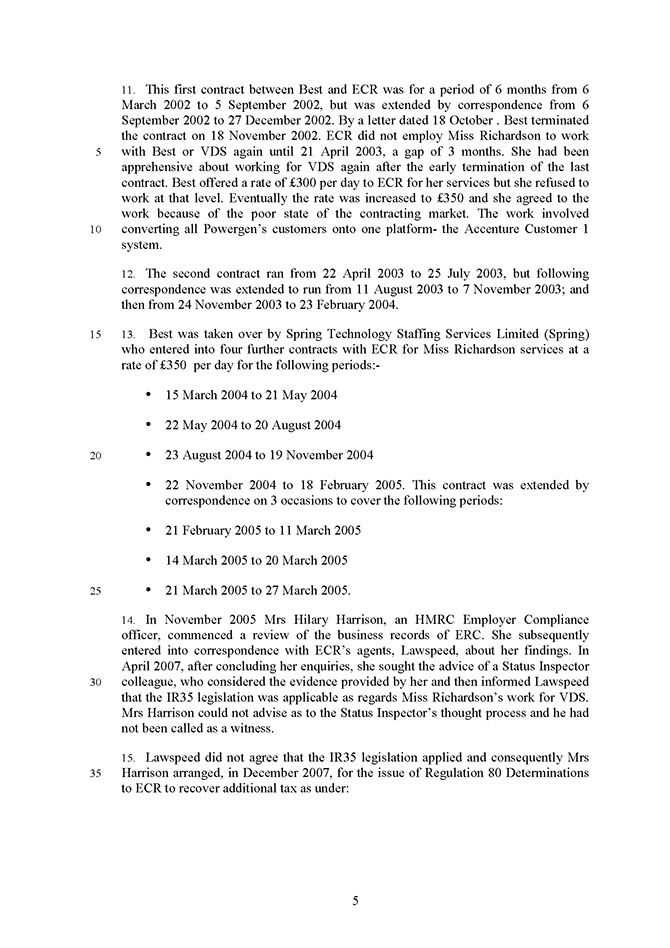
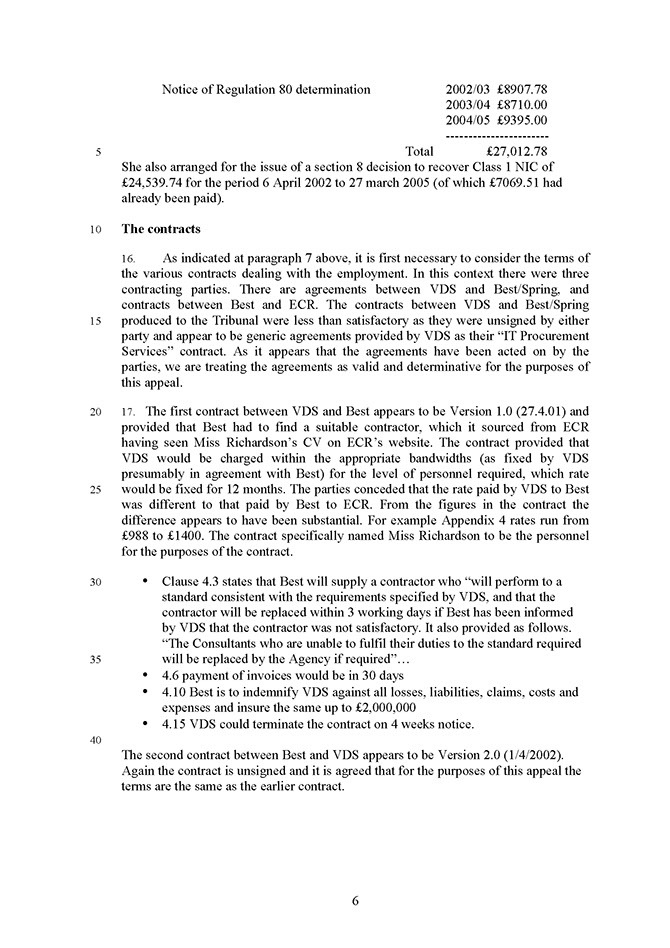
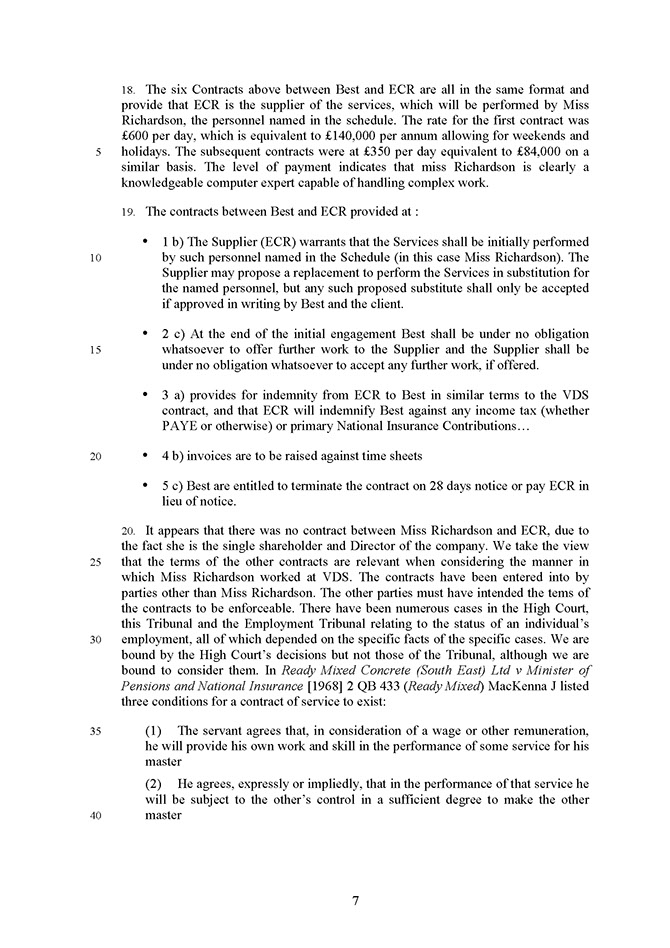
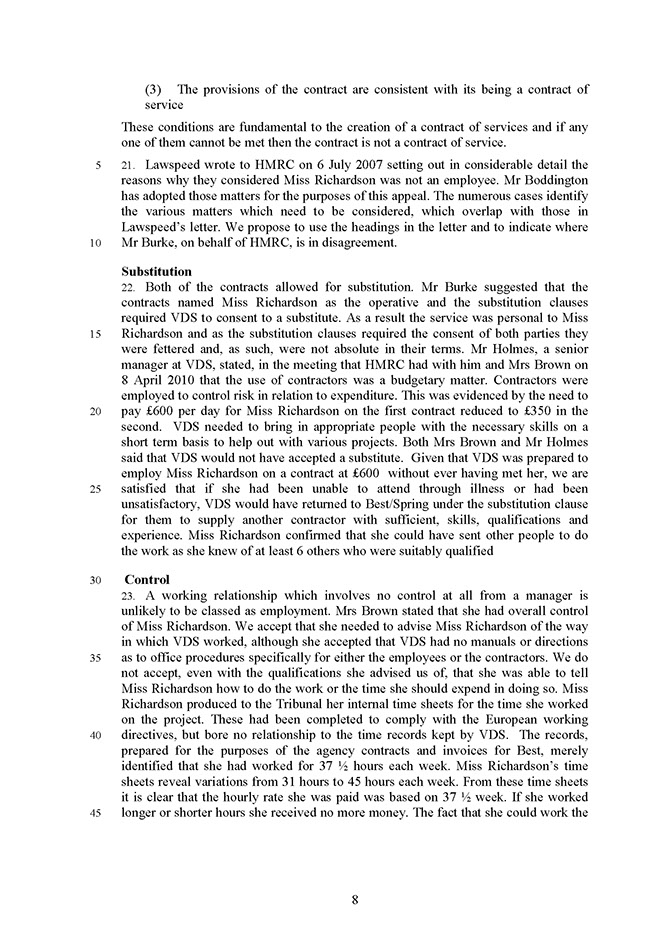
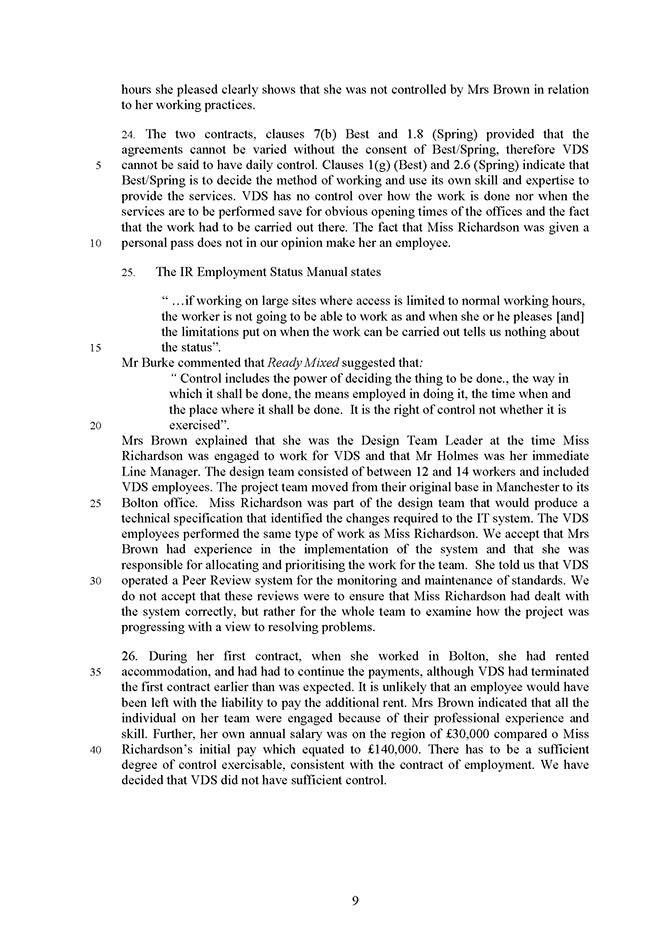
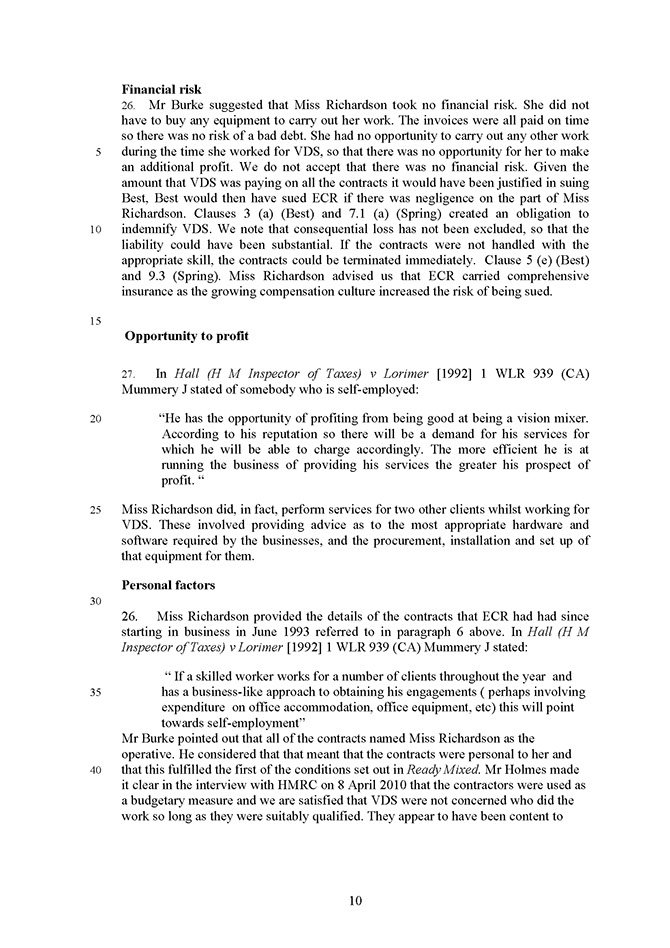
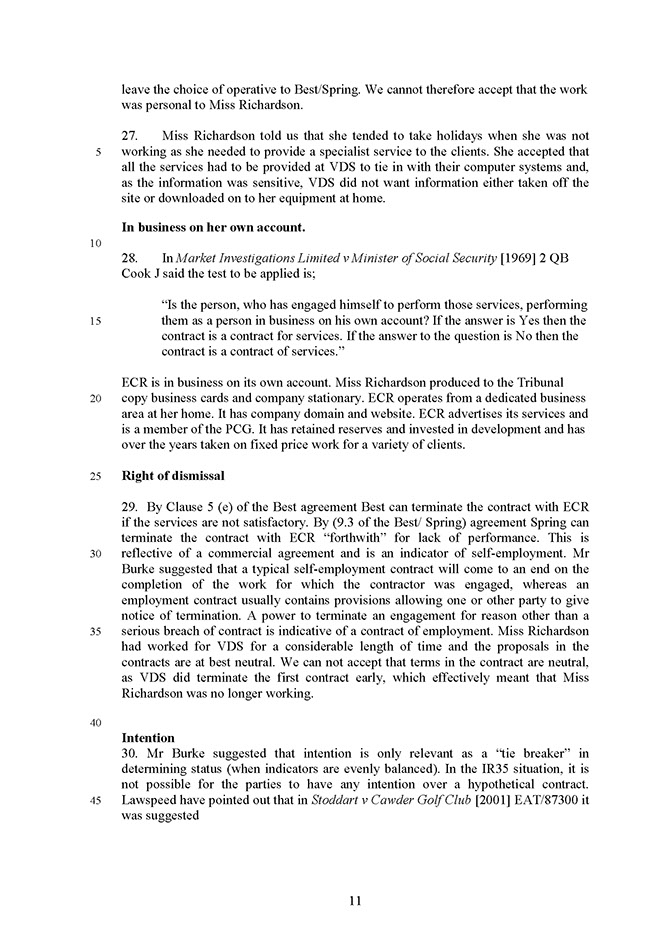
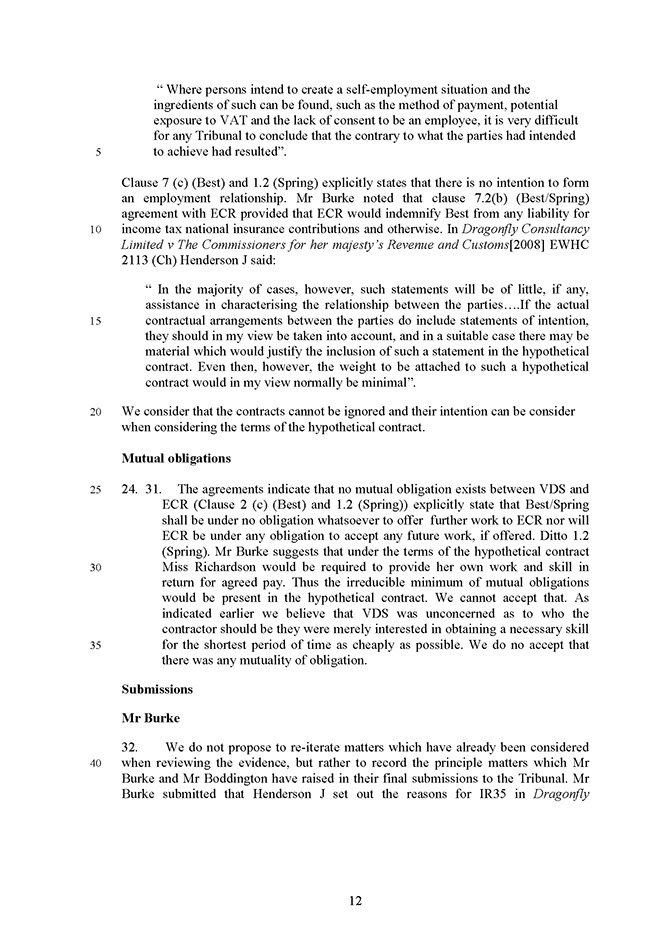
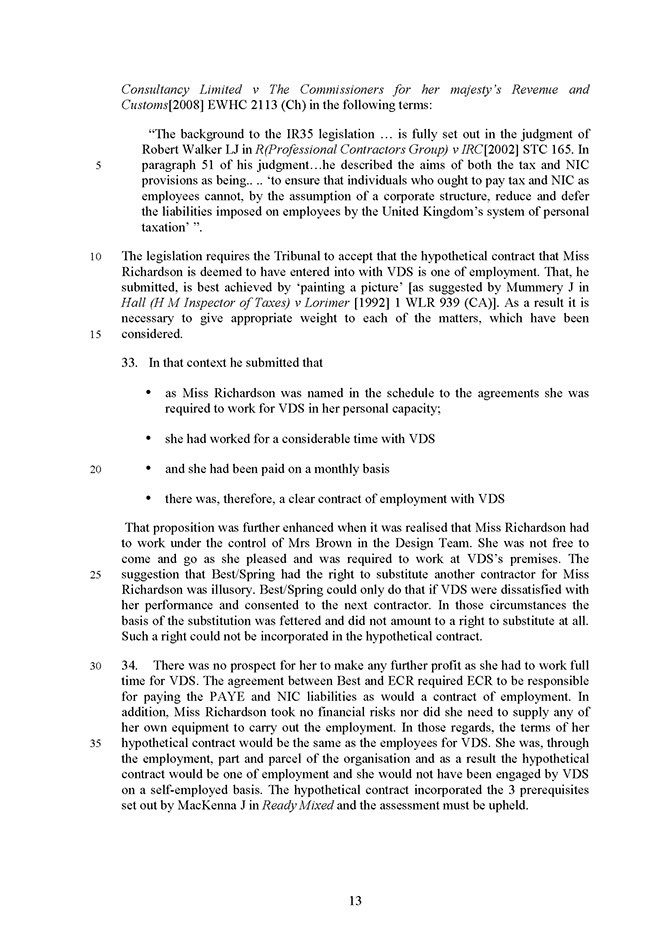
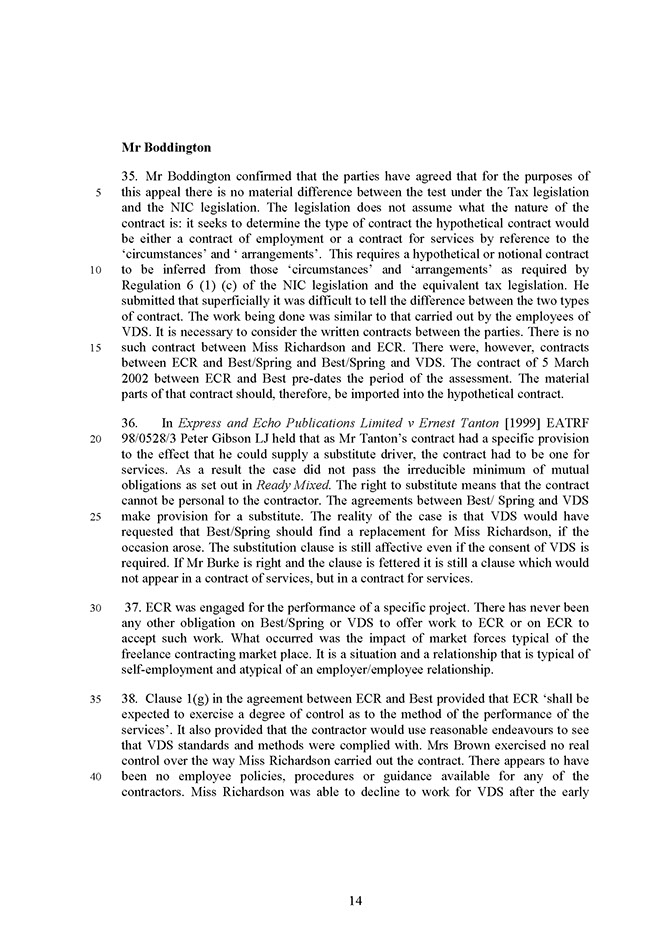
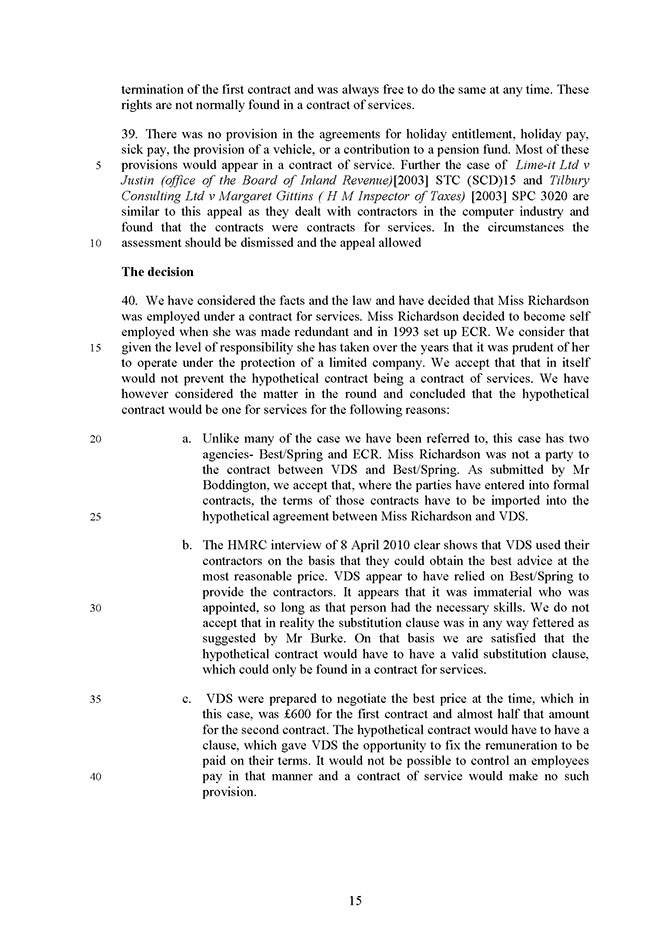
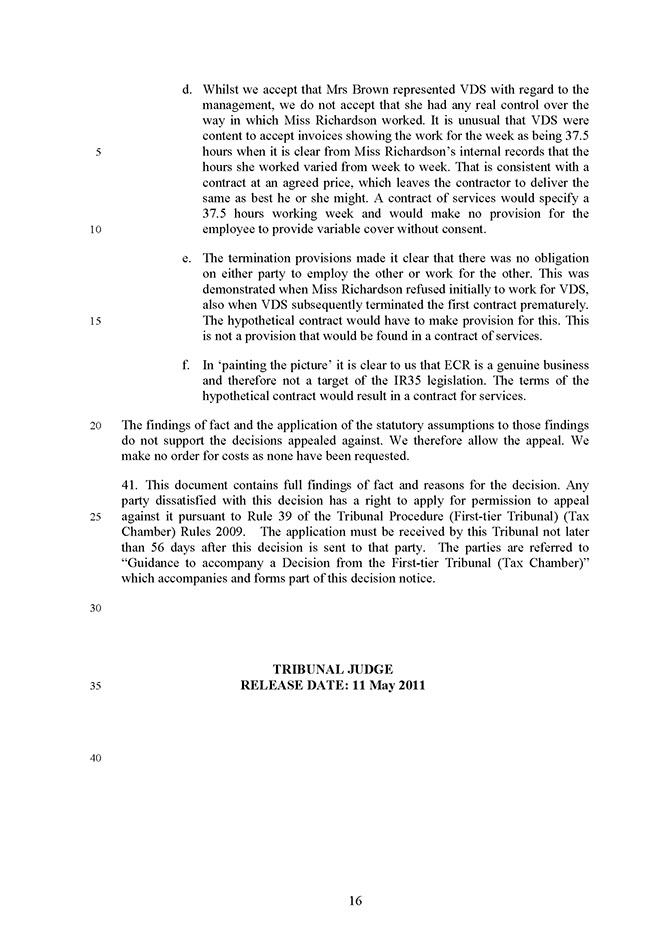
MBF Design Services Ltd v HMRC (2011) FTT - IR35 outside
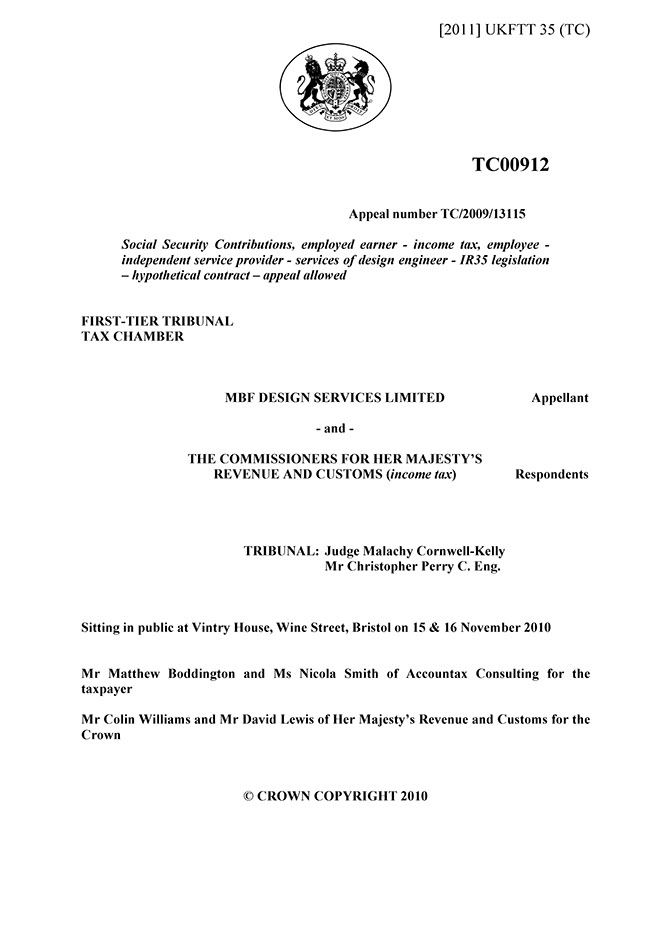
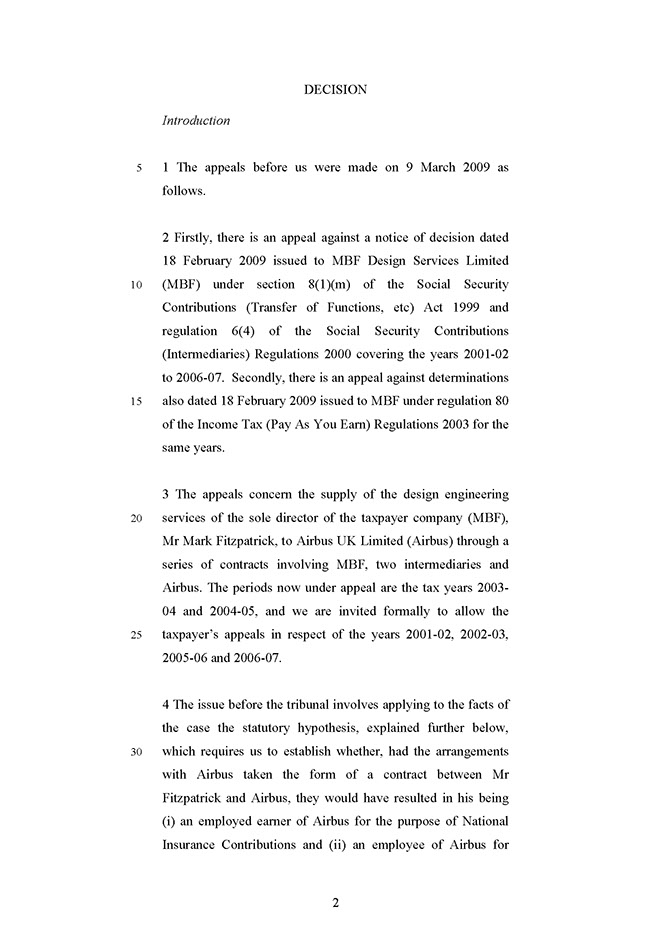
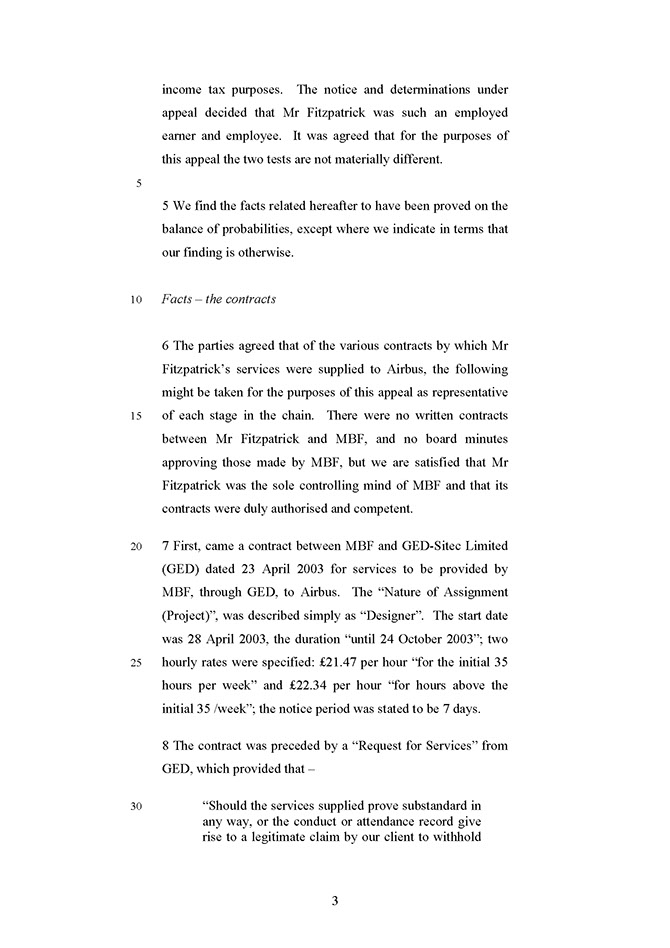
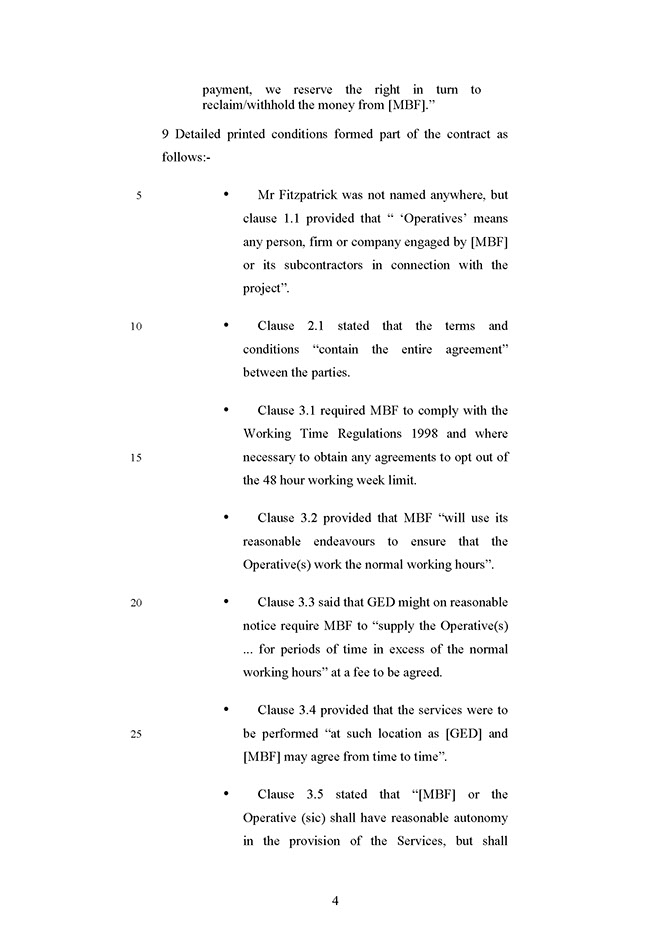
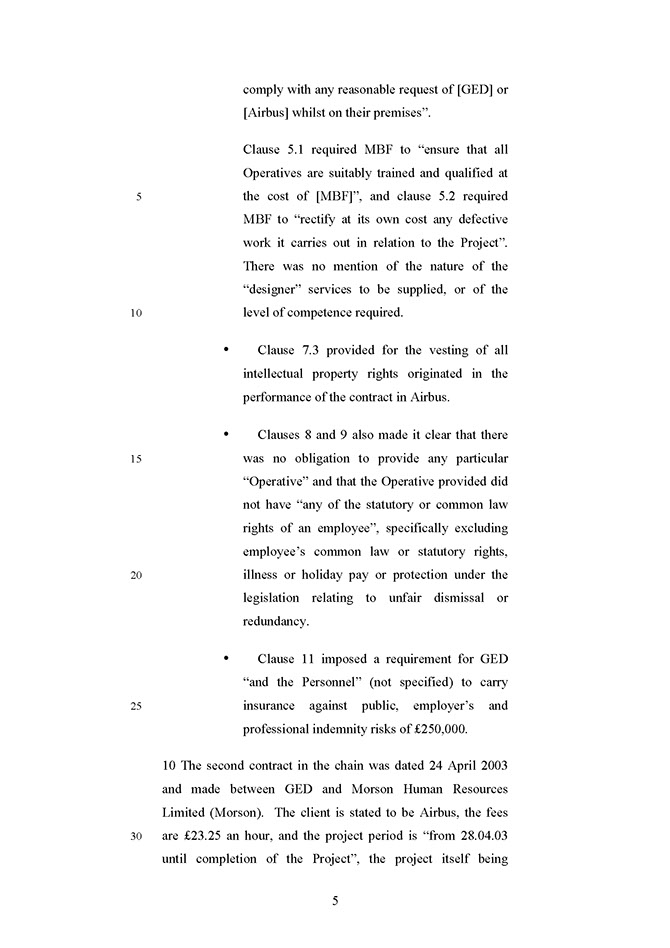
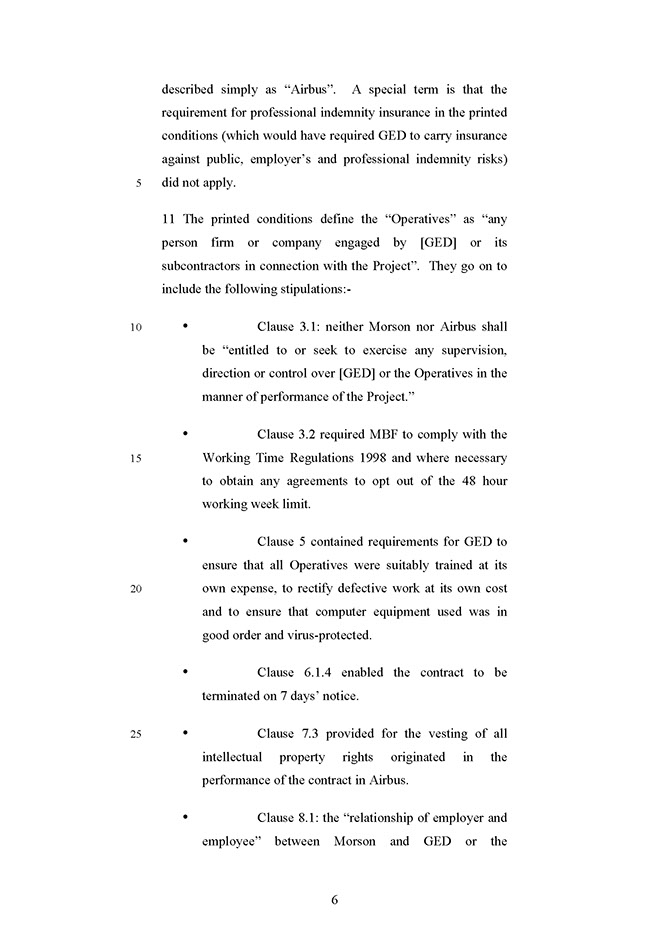
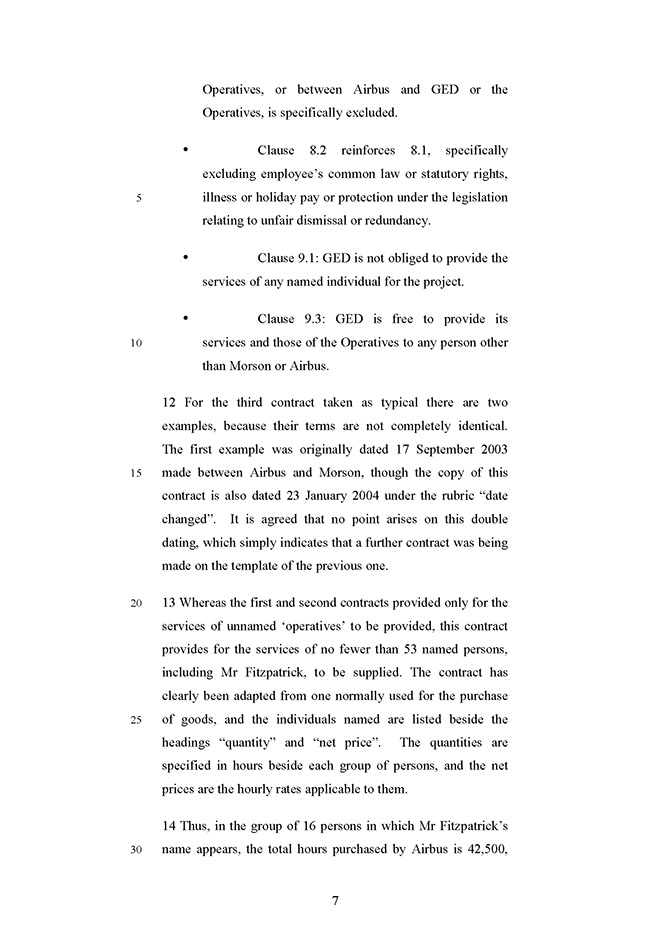
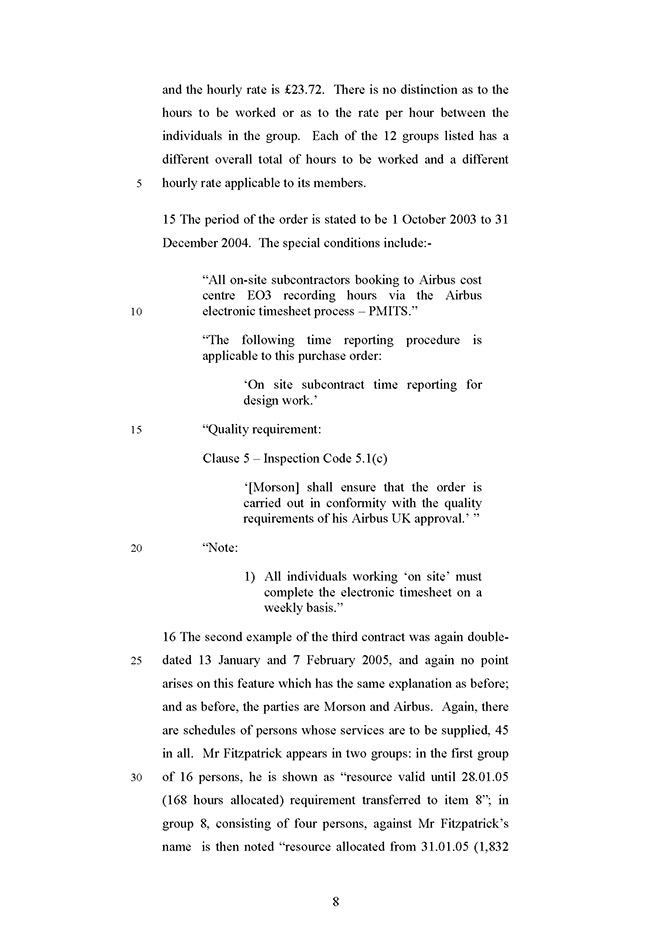
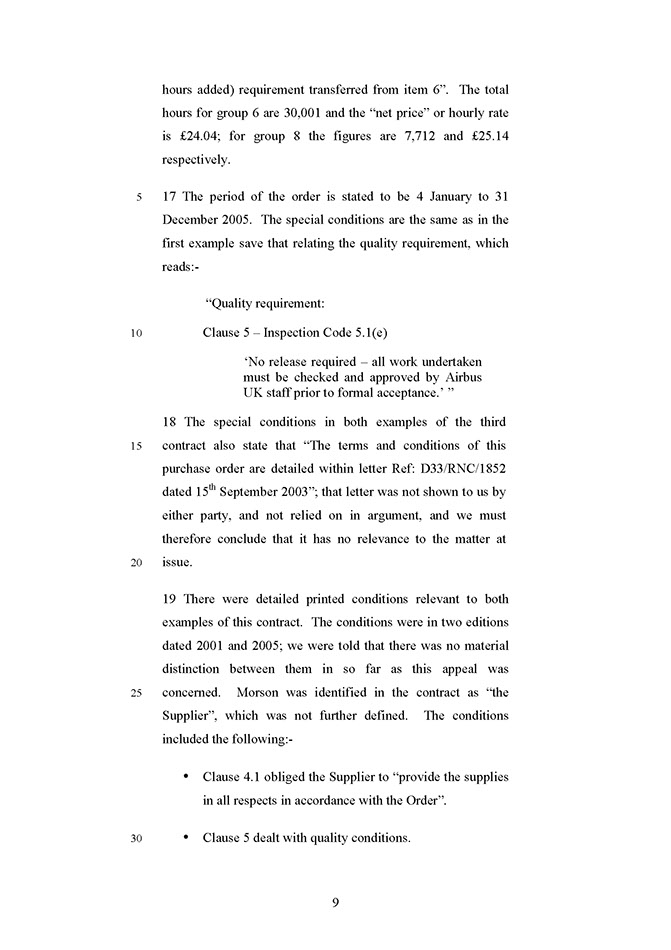
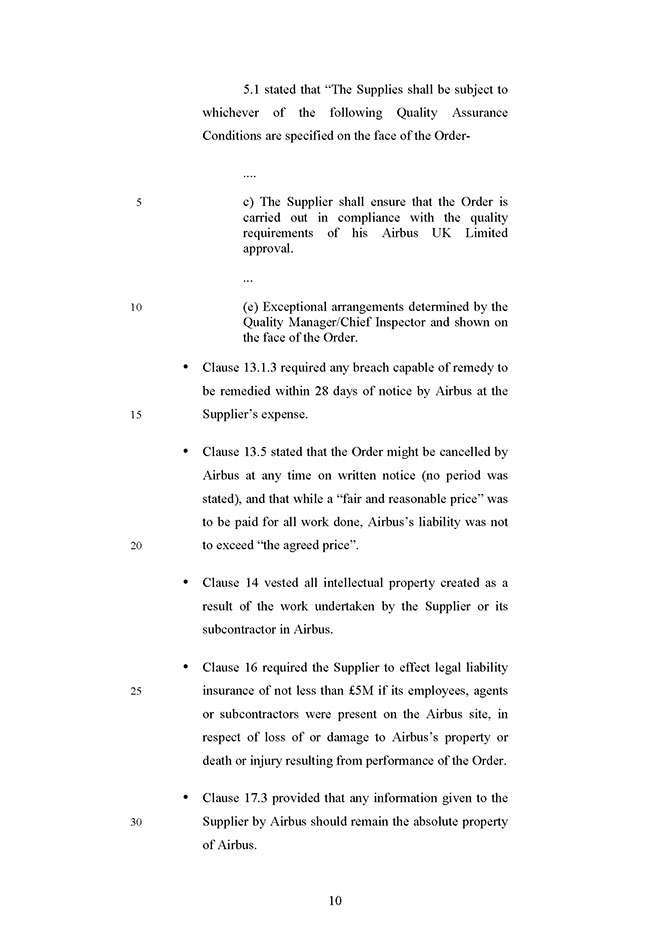
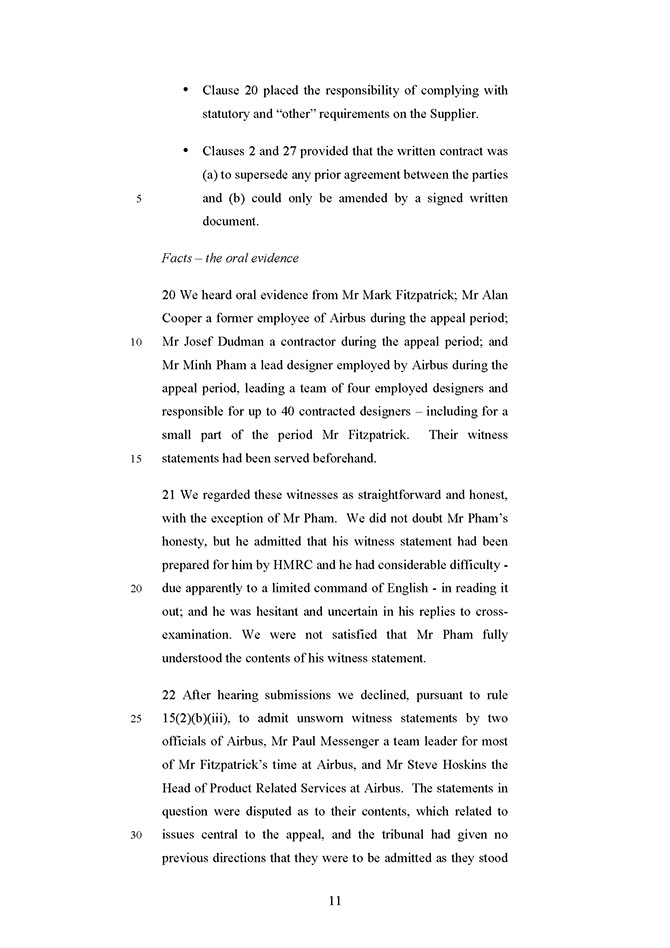
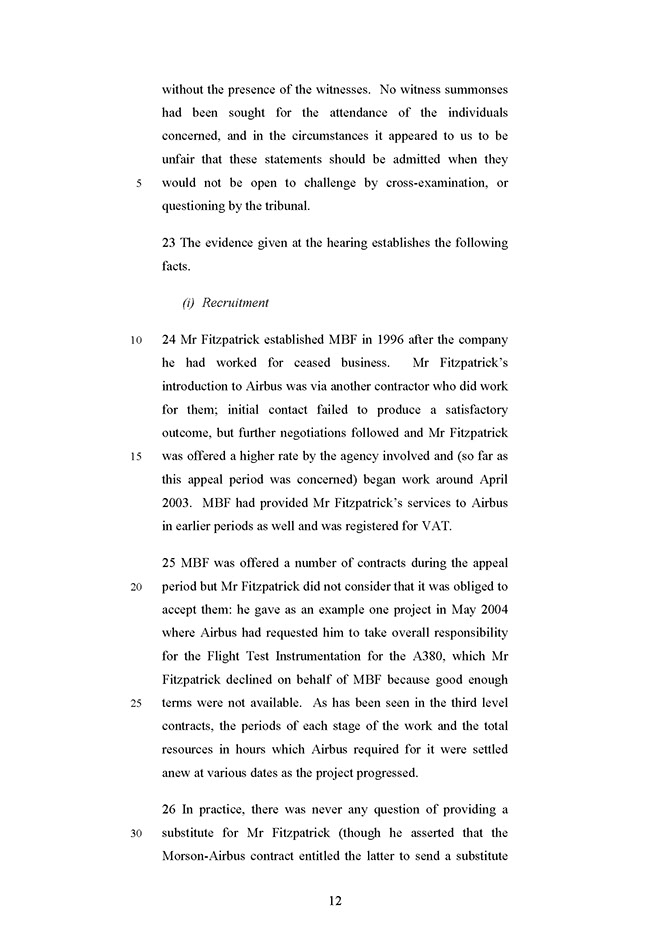
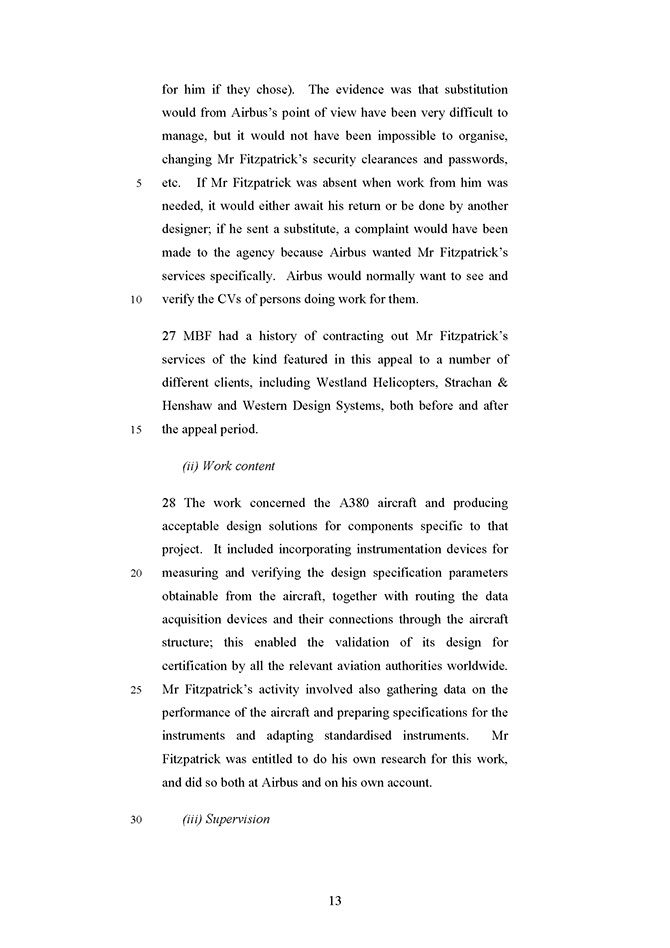
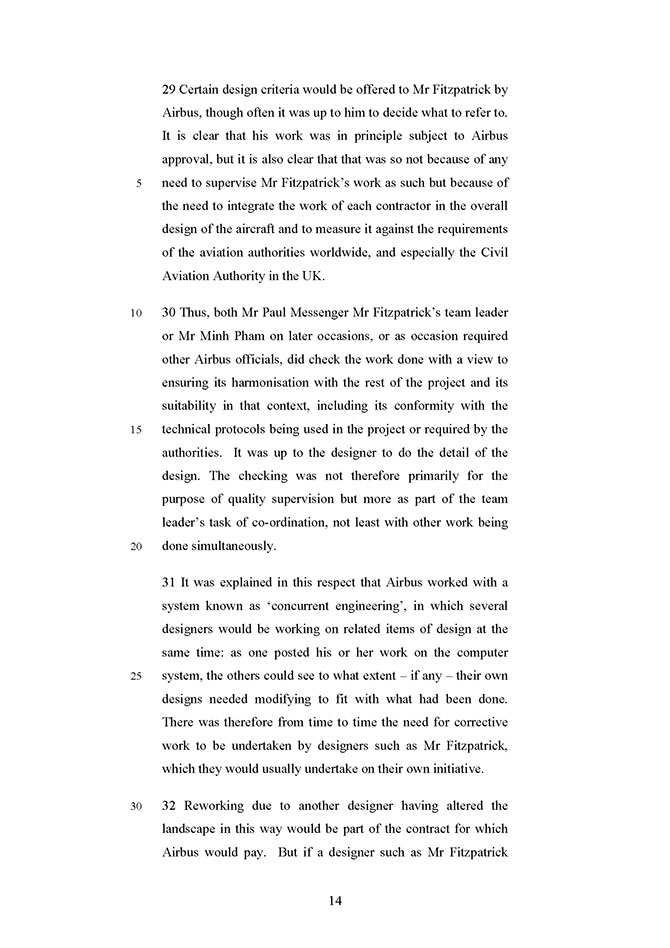
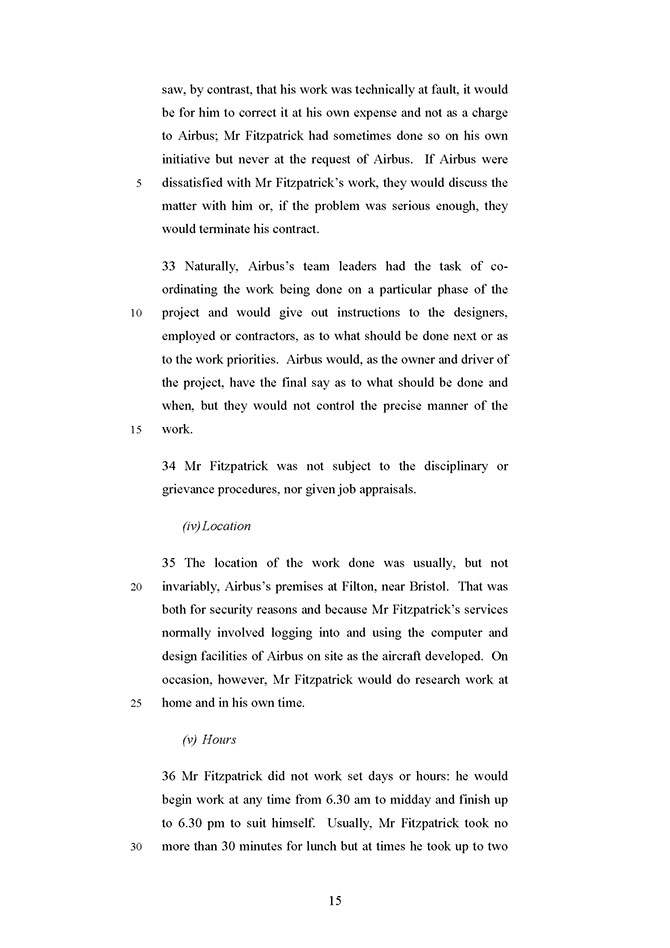
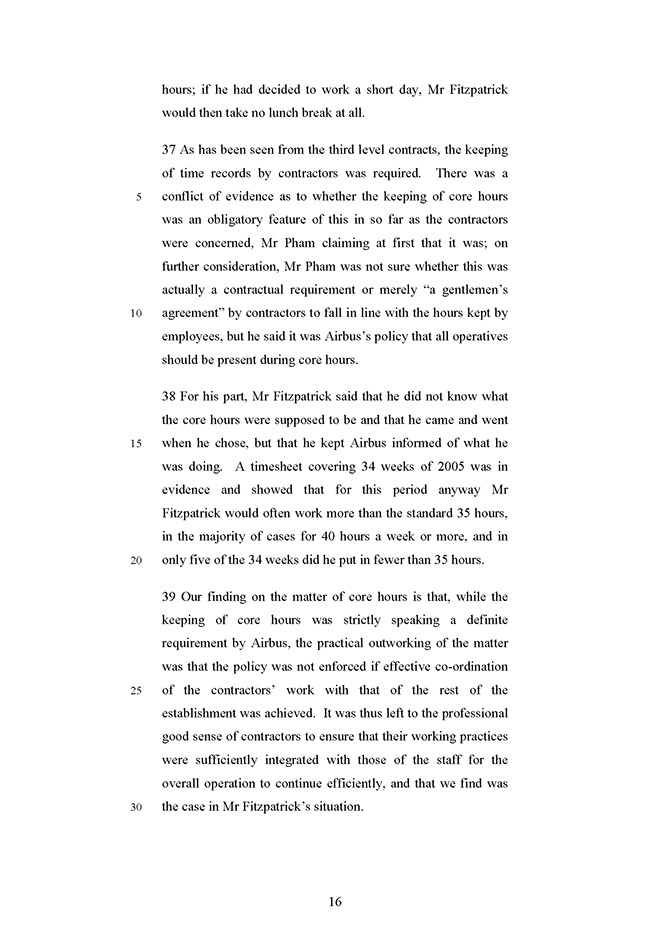
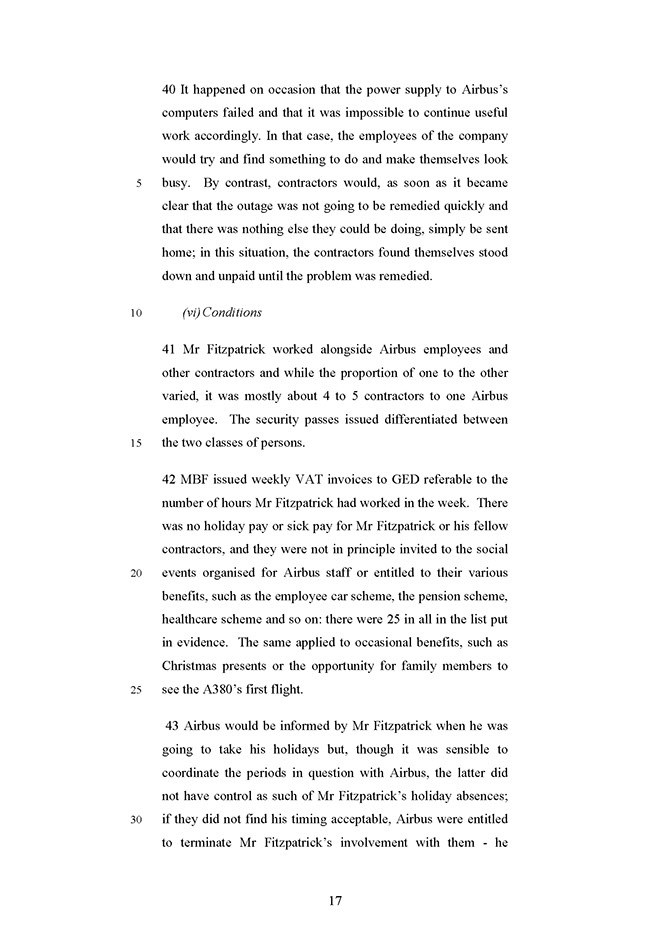
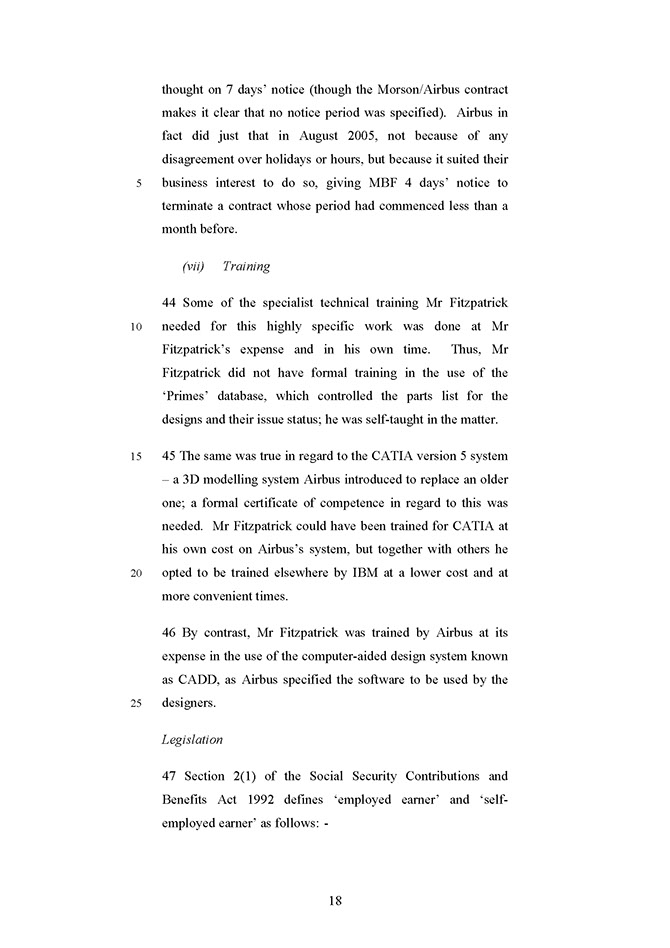
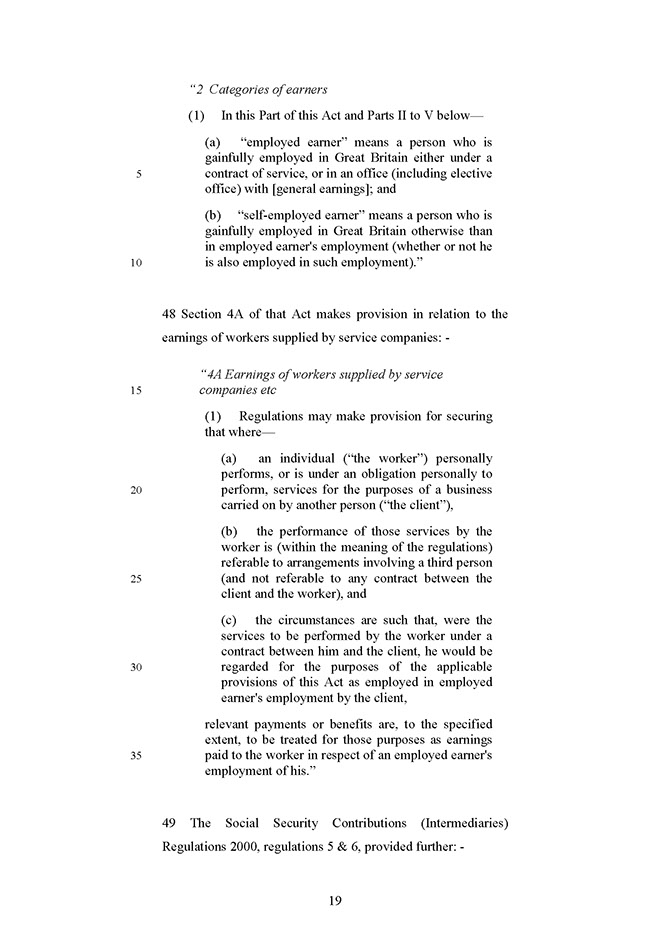
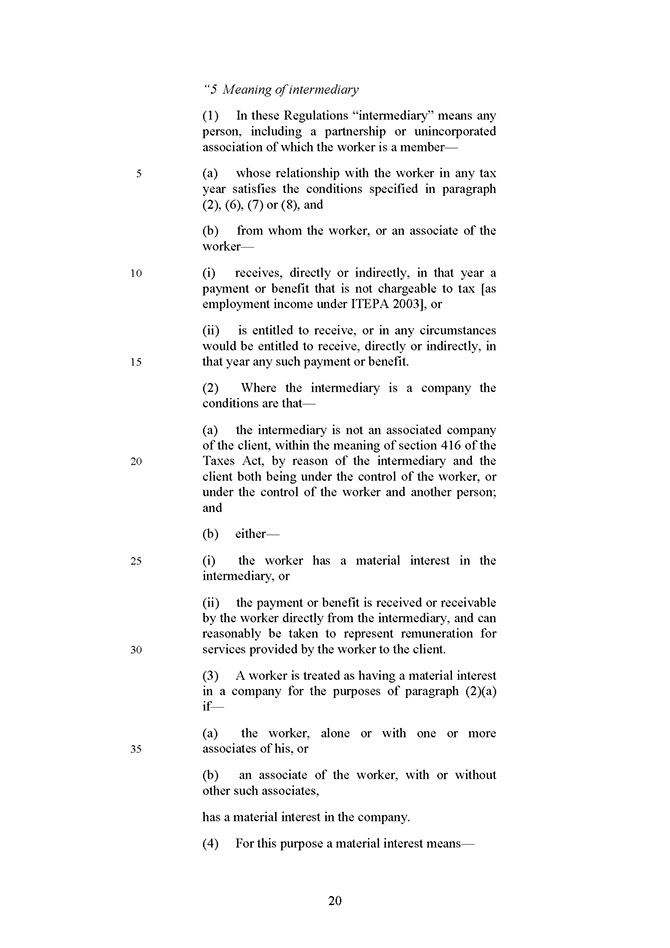
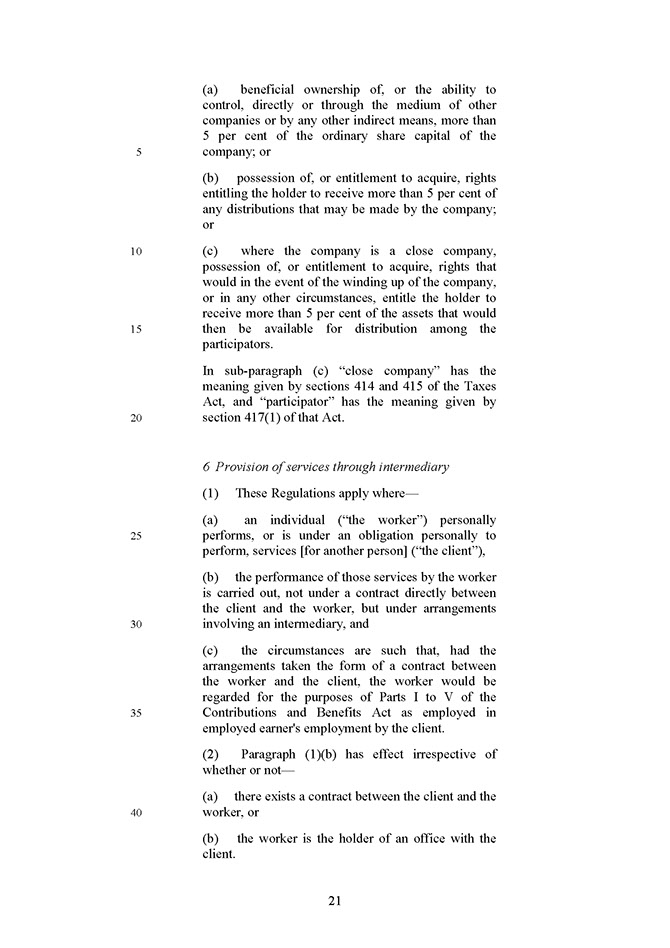
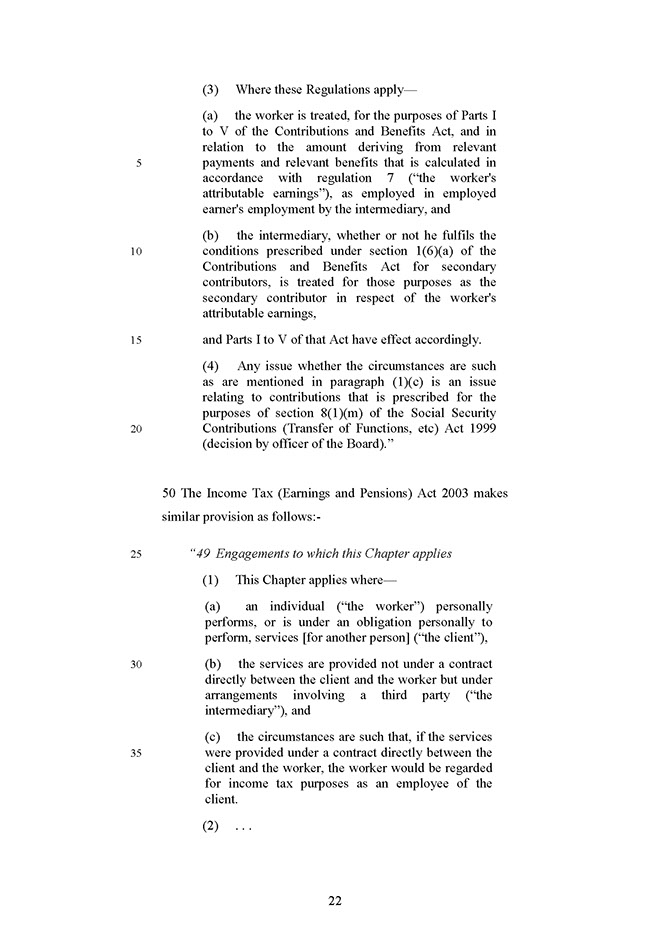
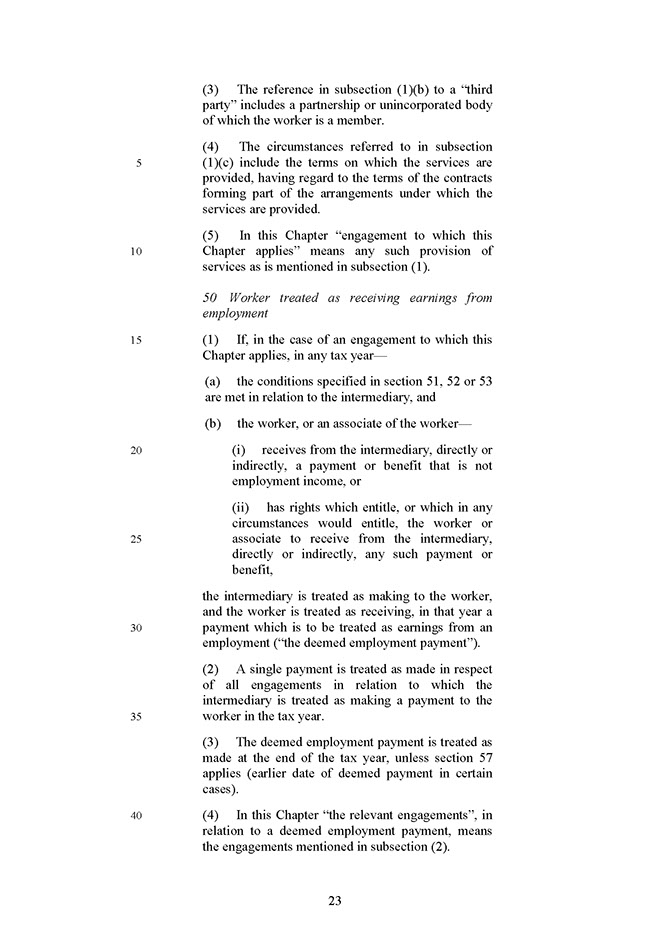
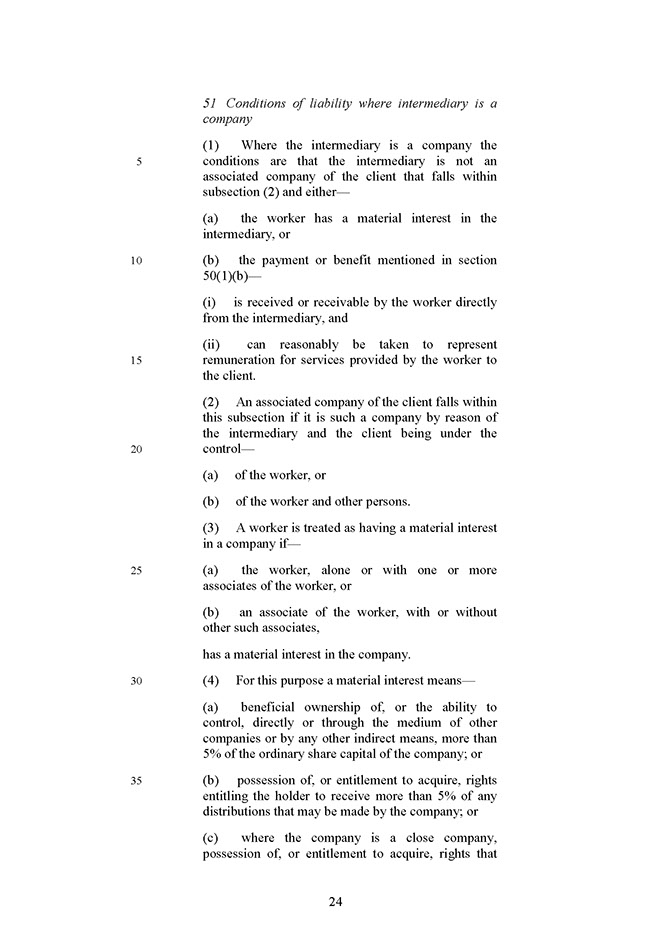
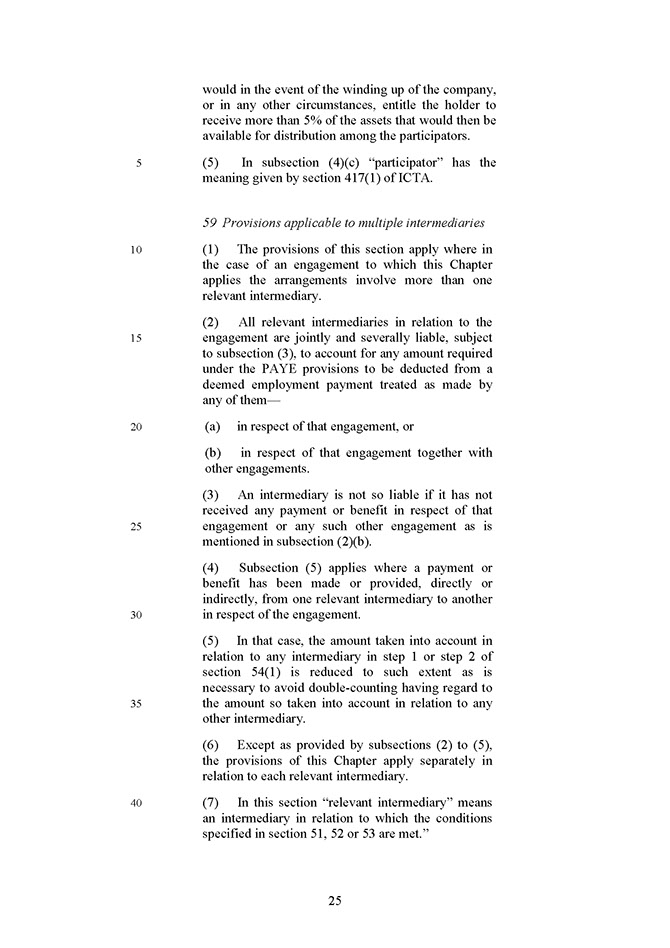
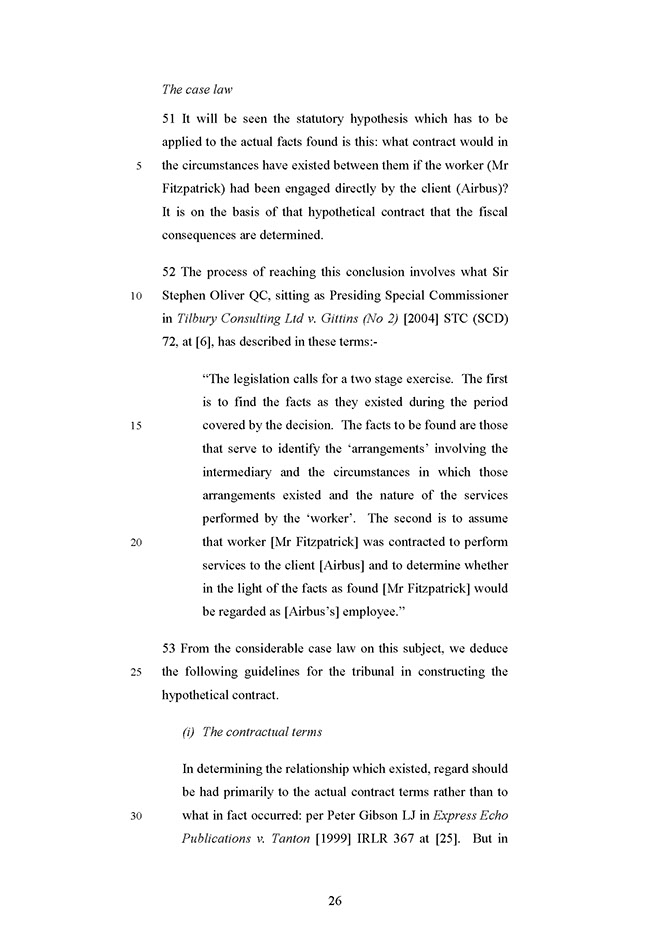
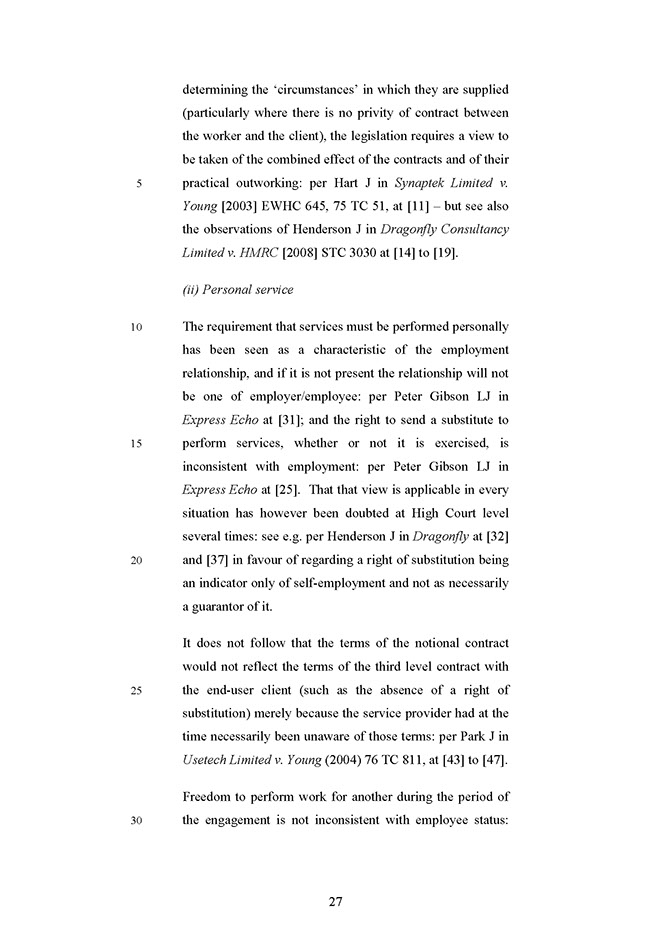
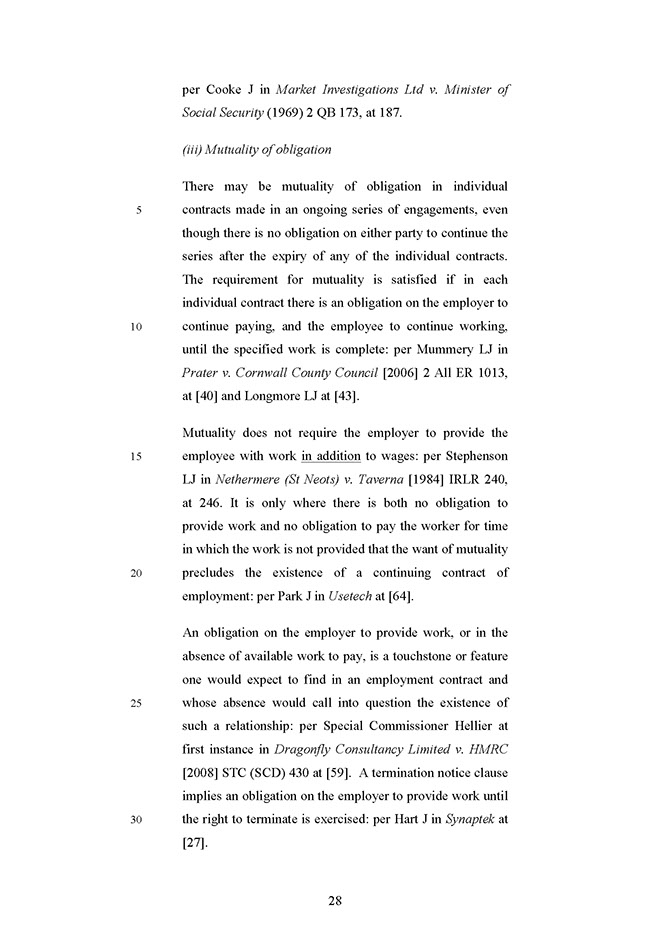
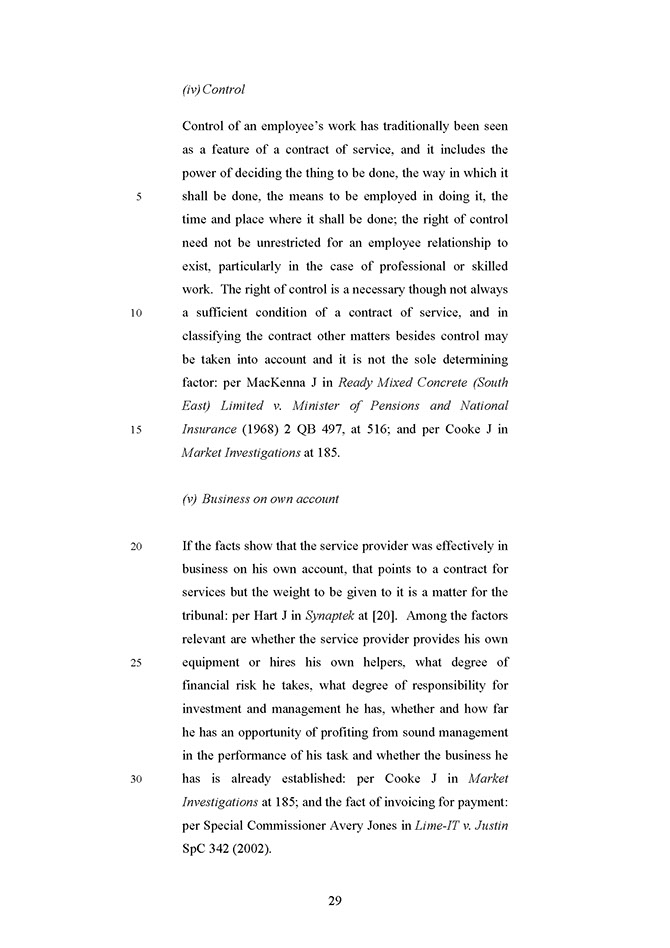
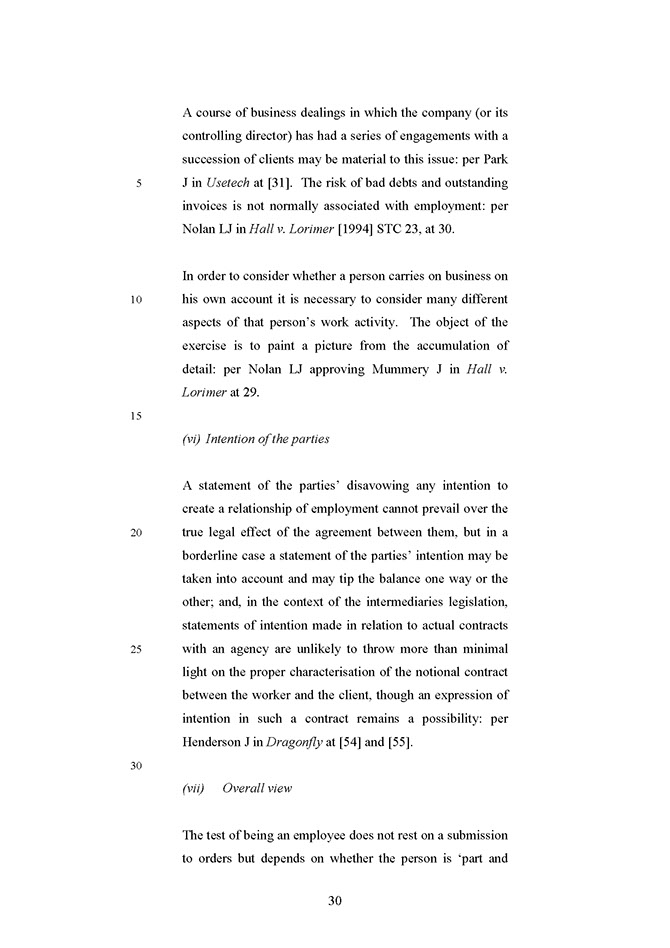
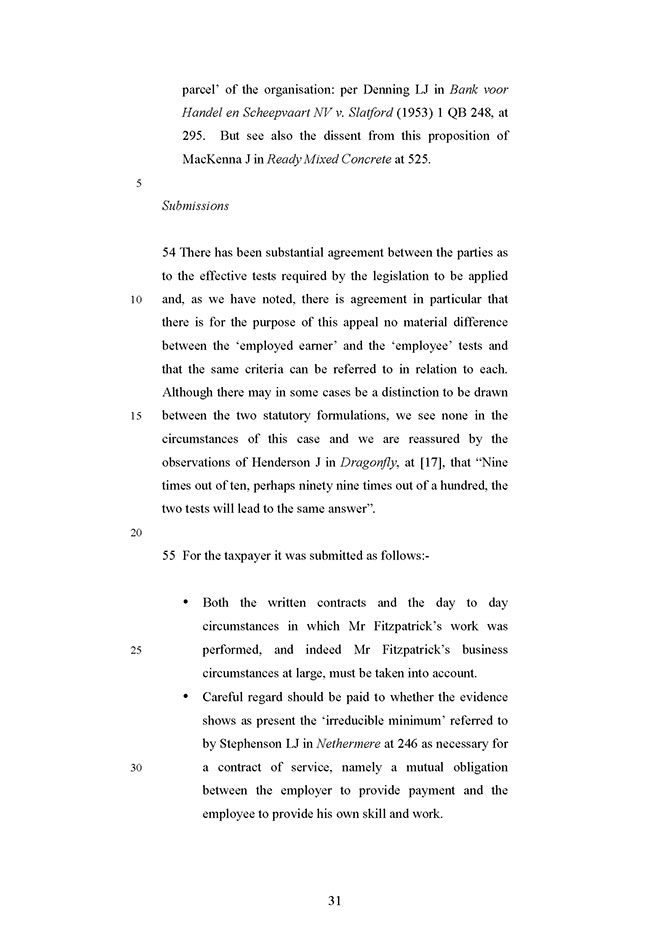
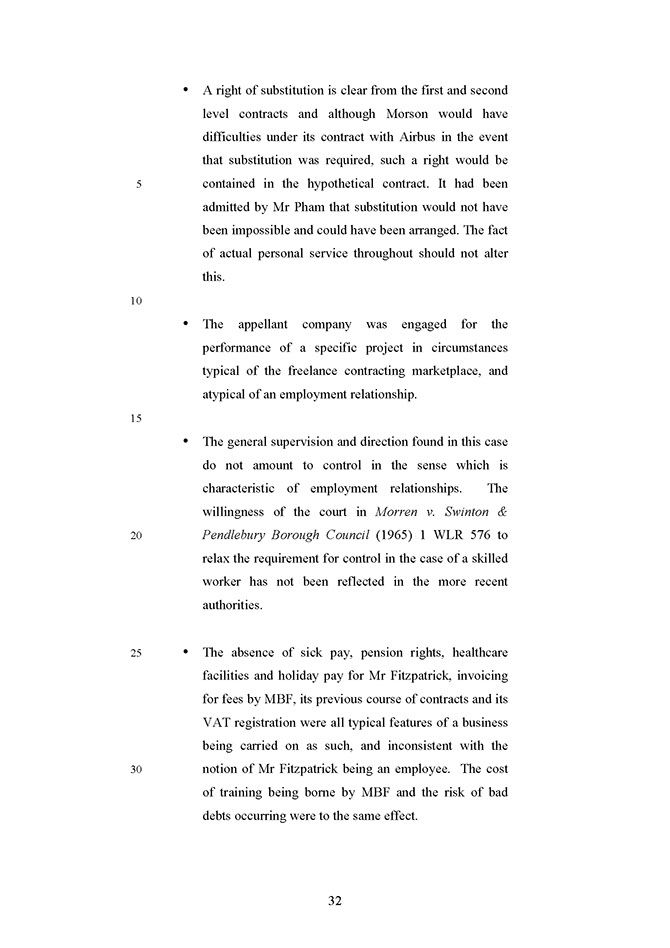
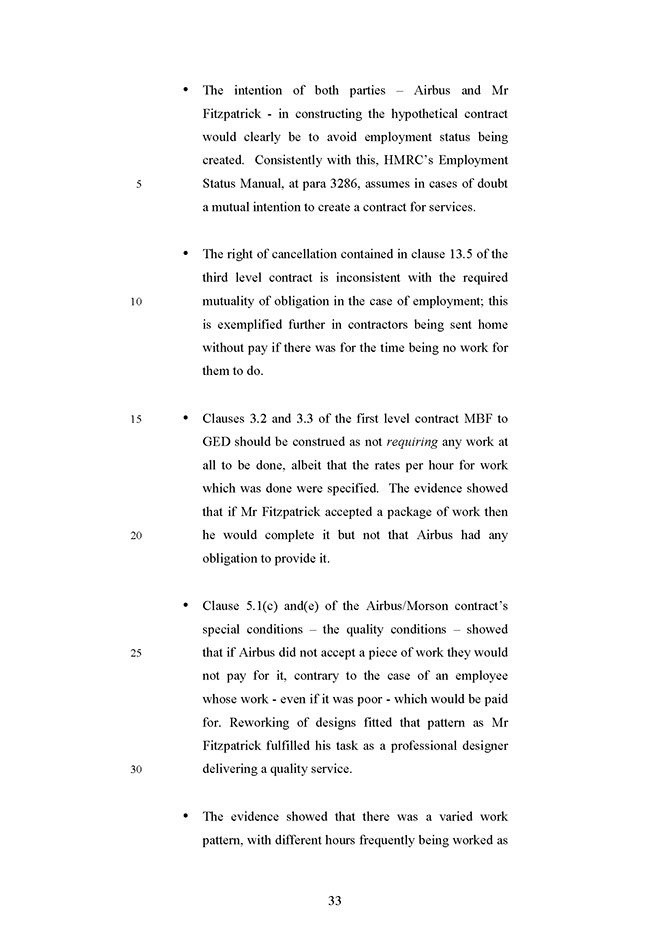
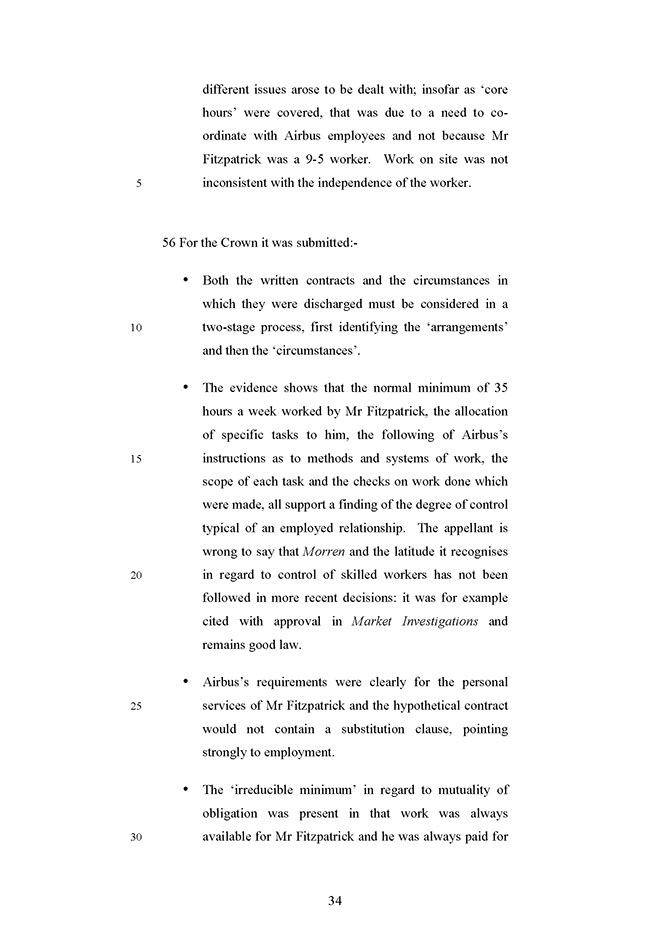
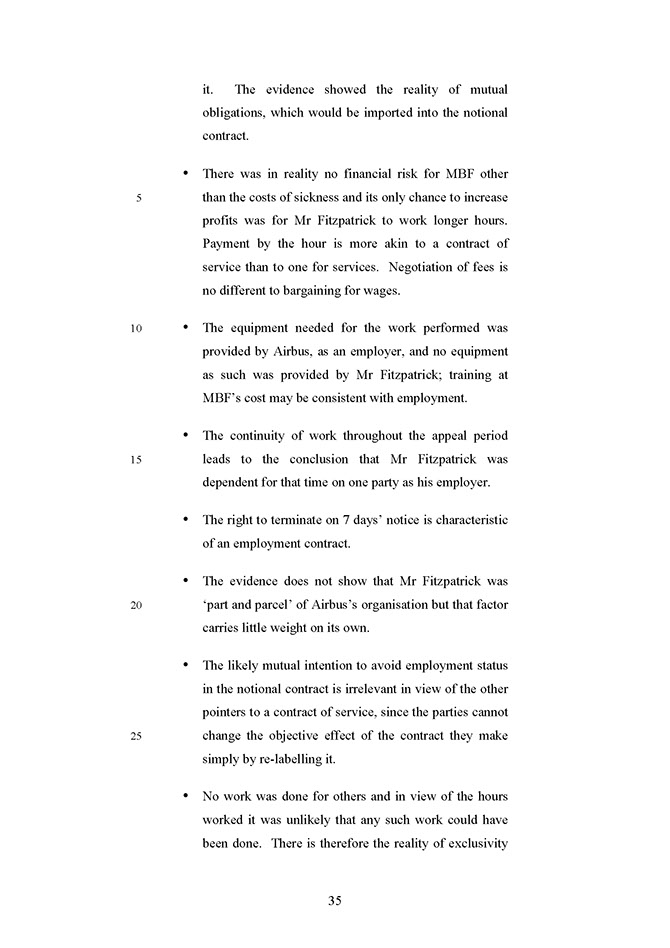
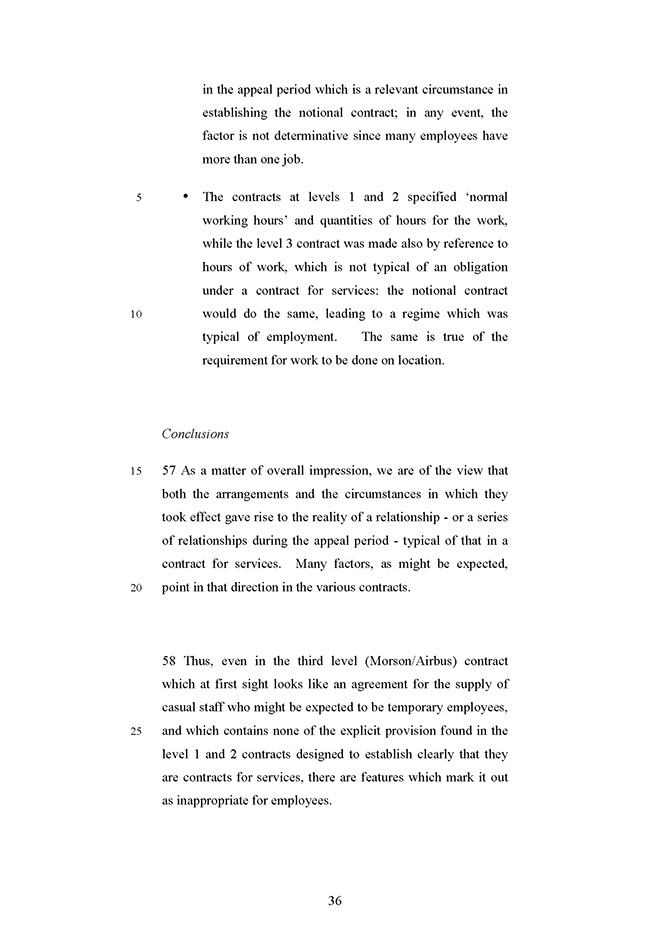
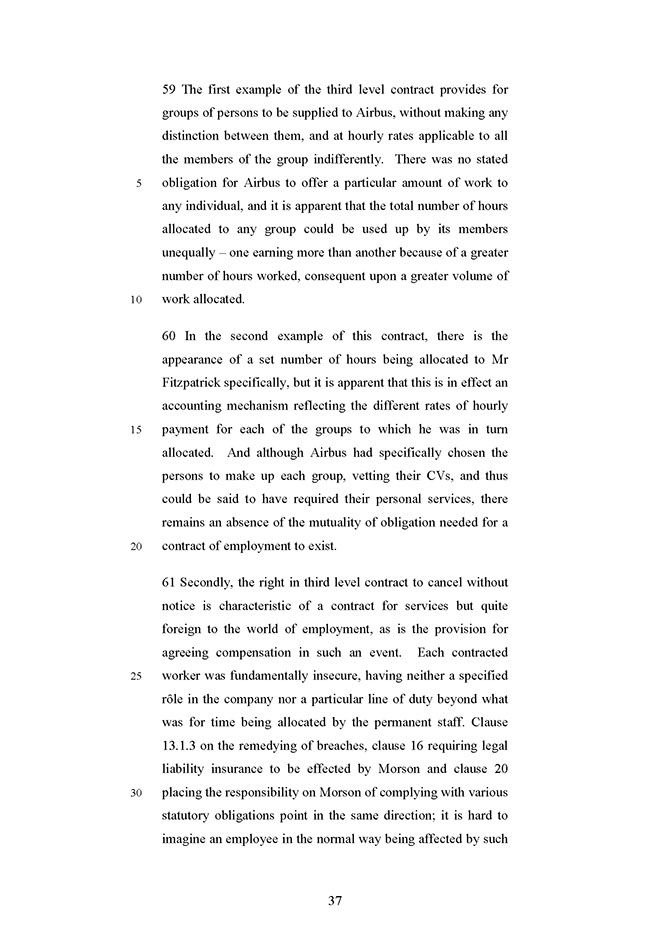
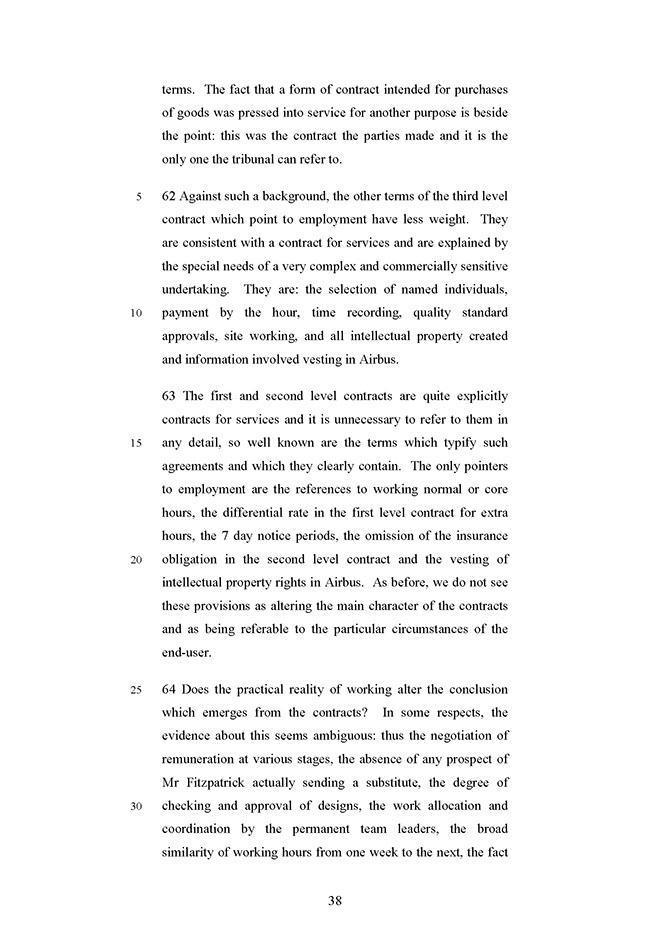
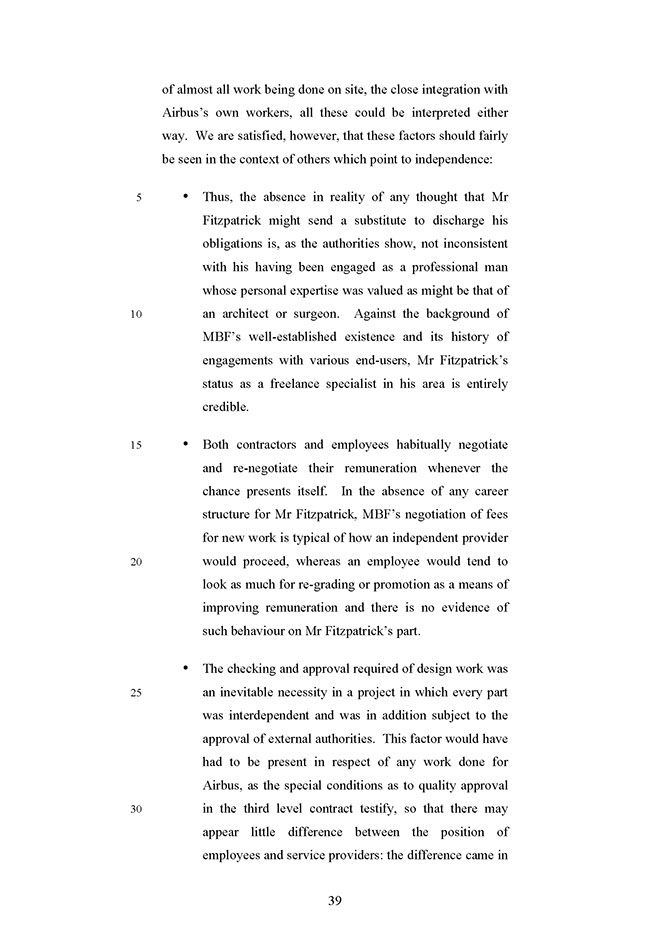
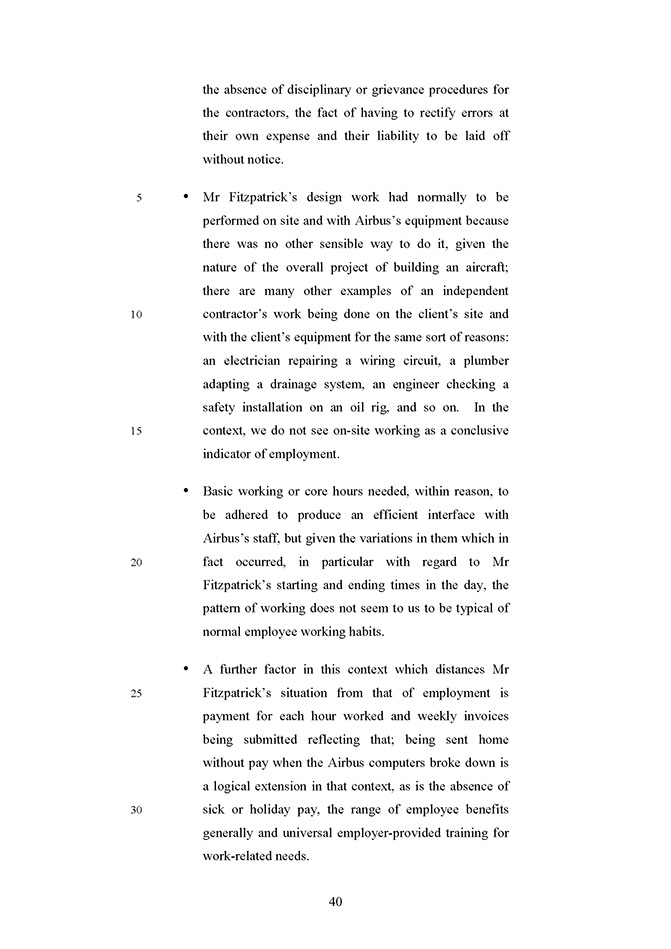
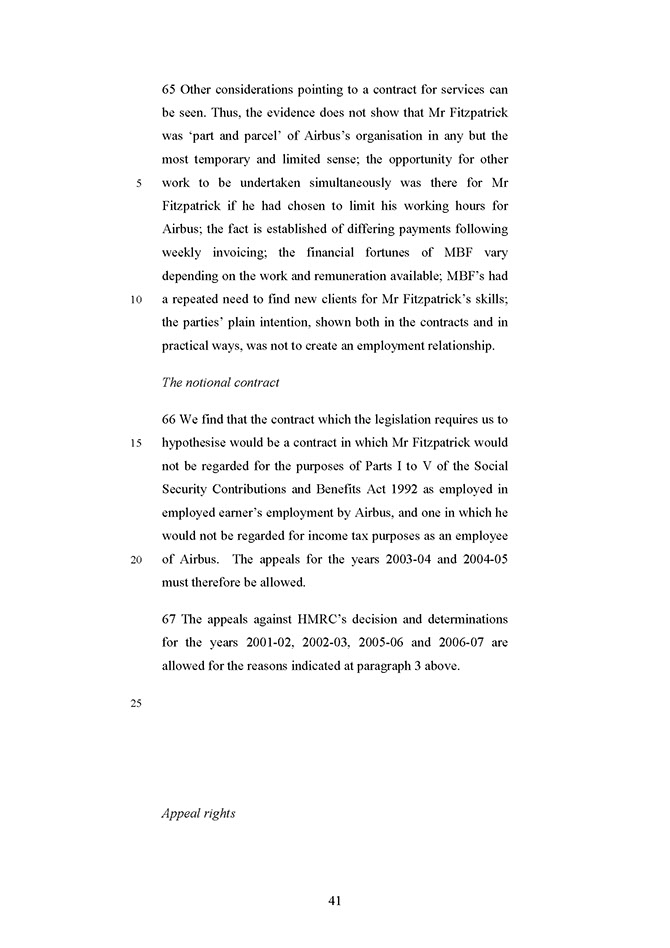
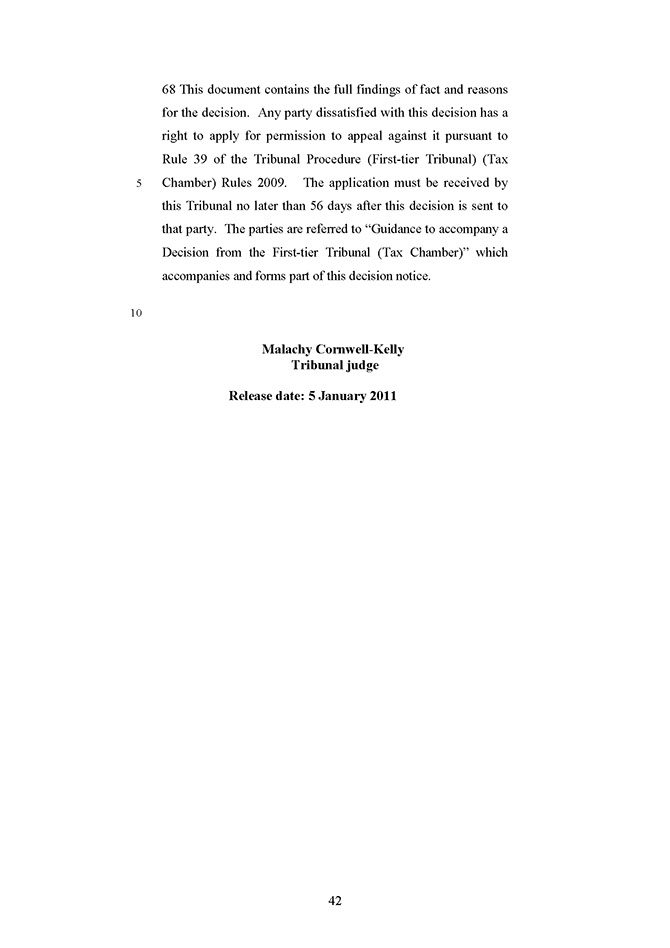
HMRC v Larkstar 2008 ChD - IR35
ESM7300 - Case law: HMRC Commissioners v Larkstar Data Ltd
[2008] EWHC 3284 (Ch)
Point at issue
The case was an appeal by HMRC against a decision of the General Commissioners which allowed an appeal by Larkstar Data Ltd against a determination by HMRC of liability to Income Tax and NIC under the Social Security Contributions (Intermediaries) Regulations 2000 and Schedule 12 FA 2000.
Date of hearing: 24 November 2008.
Date of decision: 15 January 2009.
Background Facts
- Larkstar Data Ltd’s (“Larkstar”) business is ‘the provision of computer consultancy services’.
- Mr Alan Brill is the sole director of Larkstar.
- Larkstar entered into agreements with the employment agency Technology Project Services International Ltd (“TPS”) to provide services to the end client Matra Bae Dynamics UK Ltd (“MBDA”).
- Determinations/decisions were made by HMRC on the basis that had there been a direct hypothetical contract between Mr Brill and MBDA that contract would have been one of service. Larkstar appealed against the determinations/decisions.
- The General Commissioners upheld Larkstar’s appeal, rejecting HMRC’s view that the IR35 legislation applied.
Facts found by the General Commissioners and set out in the Case Stated
- Larkstar entered into 5 successive six month agreements with TPS for the provision of consulting services to MBDA.
- An ongoing project known as ASRAAM, being worked on by MBDA, was the sole purpose of the contracts entered into between Larkstar and TPS.
- The work to be done by Mr Brill had to be performed exclusively at MBDA’s premises for security reasons.
- Each of the five contracts allowed a substitute to be provided for Mr Brill, however the overriding security arrangements required substitutes to undergo procedures as rigorous as contractors and in practice that did not happen.
- Each of the five contracts required Mr Brill to provide his own equipment, but the overriding security arrangements required him to use MBDA’s on-site equipment.
- Mr Brill had no financial risk apart from loss of income on premature termination or having to redo unsatisfactory work at his own expense.
- Mr Brill was encouraged to work during MBDA’s core hours for the purpose of co-ordinating his work with that of others, but he was free to decide when to work outside those core hours.
- MBDA exercised no control over how Mr Brill did his work.
- Mr Brill was deliberately set apart by MBDA from their company’s structure so that he could independently analyse, criticise and test their systems. His professional independence was what MBDA hired.
- Mr Brill occupied no post and had no title, with his badge describing him as a contractor.
- There was no obligation on MBDA to provide work outside or beyond each contract and, if it had been offered, no obligation on Mr Brill to do it.
- Mr Brill was free to work for other clients but did not in fact do so.
- The engagement could be terminated (i) at the end of each contract without notice (ii) by either party giving the other one month’s notice within the contract period (iii) at the end of the project without notice, as in fact happened.
- There was no provision in the contracts for sickness, holidays, pensions, bonuses or employee’s rights and privileges, such as car parking, sports facilities or medical services.
Grounds of Appeal
HMRC had four grounds of appeal, being the General Commissioners erred in law in that they
- Misdirected themselves in law having identified the correct question they did not answer it and applied the wrong test in determining whether or not the arrangements would have amounted to a contract of or for service if they had been entered into directly with the client.
- Misdirected themselves in law in their approach to the issues of (1) control (2) mutuality of obligation (3) the relevance of a number of considerations to the question they had to determine.
- Took into account irrelevant considerations and based their decision on a number of findings of fact which were either not supported by the evidence or inconsistent with other findings of fact.
- Reached a conclusion which was not open to them on the evidence before them.
Findings
1. Sir Donald Rattee found that although the General Commissioners did not express that they were performing their consideration of the point at issue in accordance with that required by the legislation; he was of the view that the General Commissioners had correctly considered the nature of a direct contract between Mr Brill and MBDA. As a consequence of his findings Sir Donald Rattee rejected HMRC’s first ground of appeal.
2(a). Sir Donald Rattee upheld HMRC’s ground of appeal in regard to the General Commissioner’s finding of Control, due to 2 significant aspects.
Firstly, the statement at paragraph 9(b)(iv) of the Case Stated in which the General Commissioners decided that as Mr Brill was a consultant, and there was no control by MBDA as to how he did his work, indicated that he was independent, suggested to Sir Donald Rattee that the Commissioners took no proper account of the authorities referred to at the hearing by HMRC on this aspect - most notably Lord Parker, CJ’s dictum in Morren v Swinton & Pendlebury Borough Council.
Secondly, one of the General Commissioners’ findings of fact was that Mr Brill was encouraged to work during MBDA’s core hours (paragraph 5.6 of the Case Stated). Mr Brill’s own evidence was he was required to work 37 hours a week - adhering to core hours (paragraph 7(4)(viii) of the Case Stated). As the General Commissioners’ found Mr Brill’s evidence to be convincing and to be preferred in all cases of apparent conflict, their finding of fact regarding hours of work was inconsistent, and had they found that Mr Brill was indeed required to work the hours they may have concluded this was a pointer towards employment.
2(b). The General Commissioners found there was a lack of mutual obligation, which they saw as one of the most compelling factors indicating independent contracting. This was found to be a clear misdirection by the General Commissioners on the relevant law as they only considered the obligation to offer work outside the terms of the contracts, which is irrelevant to the question of whether there is mutual obligations during an engagement. In reaching their decision the Commissioners ignored statements of principle by the Court of Appeal in Cornwall County Council v Prater. Sir Donald Rattee found a clear misdirection as to the law by the General Commissioners.
2(c). With the exception of the impact of a termination clause on the hypothetical contract, which Sir Donald Rattee found to be no clear point of law therefore there can be no misdirection, it was decided there was no requirement to review each individual factor under this ground of appeal as there was already a finding of misdirection in law on the fundamental aspects of control and mutuality of obligation.
3. We accepted that our third ground of appeal added little to ground 3, therefore this was not pursued.
4. With regard to ground 4, the analogy of a builder chosen by the Commissioners, Sir Donald Rattee found that although the analogy was “not a happy one”, it did not amount to a misdirection in law.
Conclusion
The appeal was allowed and remitted to the General Commissioners to be heard by a different constituted panel, as Sir Donald Rattee could not be satisfied that the Commissioners would have reached the same conclusion had they not made the errors of law and the unjustified finding of fact identified by him.
Dragonfly v HMRC 2008 ChD summary - IR35 inside Appeal decision
Dragonfly Consultancy Ltd v HMRC (2008)
Jon Bessell provided IT consultancy services to the AA through his own company, Dragonfly Consultancy Ltd. Dragonfly's arrangements with the AA were provided through an agency, DPP International Ltd.
In the High Court Mr Bessell made four contentions:
1. Personal service/substitution
Contention: That the notional contracts would have contained provisions relating to substitution which would have prevented them from being contracts of service.
Judgement: Mr Bessell was named as the consultant in two of the lower level agreements. Dragonfly was a one-man company whose purpose was to supply Jon Bessell's services and it was therefore obvious that the intention of both parties was that it would be Mr Bessell who would provide the services.
There was a substitution clause in the lower level agreement but this could only be used where the AA had expressly agreed to it. Each notional contract would therefore have been for the services of Jon Bessell and that a replacement worker could be used only if the AA had firstly given notice that a particular substitute was acceptable.
The Special Commissioners had commented that “The AA did not want any competent tester, it wanted Mr Bessell”. The absence of an express provision in the upper level contract permitting an unfettered right of substitution further supported this statement.
2. Right of control
Contention: The notional contracts would not have contained provisions conferring sufficient rights of control to create a contract of service.
Judgement: A schedule supporting the first lower level agreement demonstrated that Jon Bessell was to act under the direct supervision and control of the AA. Although the wording of subsequent schedules was amended this did not disturb the original intention. The judge even went as far as to conclude that the wording of the schedules, along with other alterations, may have only been amended for the purposes of IR35.
A clause in the agency's agreement with the AA showed that staff provided by the agency 'shall be under the full control and supervision of [the AA] on a day-to-day basis only regarding performance of the duties'. Mr Bessell had attempted to contend that this was akin to the control a householder would have over a self-employed tradesman but the judge disagreed and concluded that the degree of supervision and quality control went beyond being merely directed over when and where to work. Regular appraisals and monitoring of Mr Bessell went beyond what would be expected of a self-employed individual genuinely in business on own account.
3. Intention of the parties
Contention: The intention of the parties should have been taken into account, and if done so the conclusion would have been that Mr Bessell should not be an employee of the AA.
Judgement: Although it was considered irrelevant in this case in determining whether the engagement was one of service or for services, the judge said that a statement of intention should not be dismissed. It is only likely to be helpful however in borderline cases, helping to tip the balance one way or the other. In the majority of cases it will be of little assistance in characterising the relationship between the parties.
4. 'Worker' Status
Contention: The Special Commissioner failed to consider whether a person can be self-employed without being in business on own account. The law recognises the concept of an intermediate 'worker' status and the Special Commissioner should have taken account of this concept.
Judgement: As the general law of employment does not recognise a third intermediate category between employment and self-employment there was no reason to consider any other category. In the context of IR35 the only distinction to be made is whether the notional contract is one of service or not.
Alternative Book Co v R&C 2008 SpC - IR35 inside
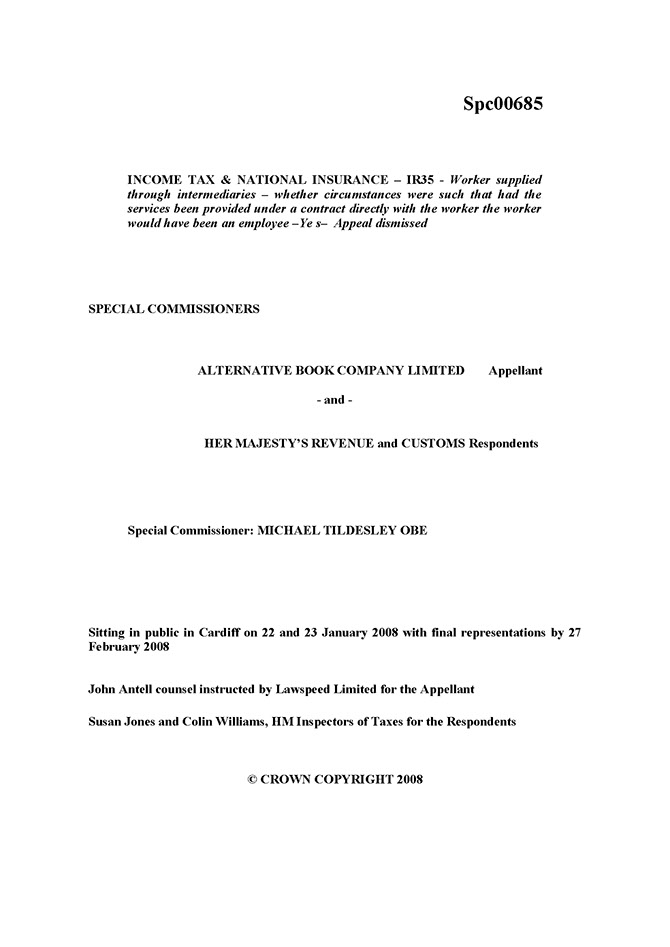
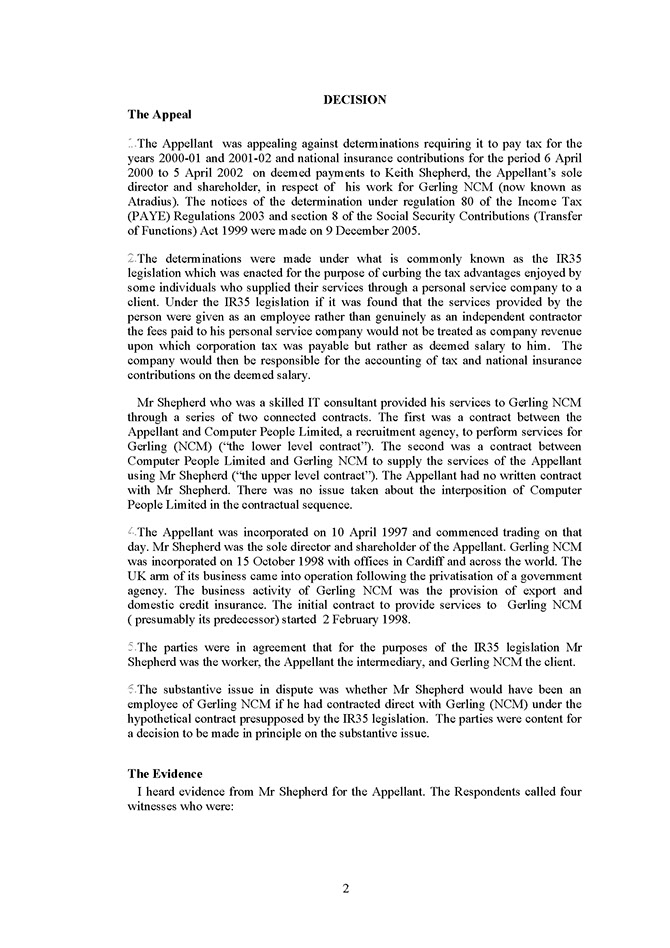
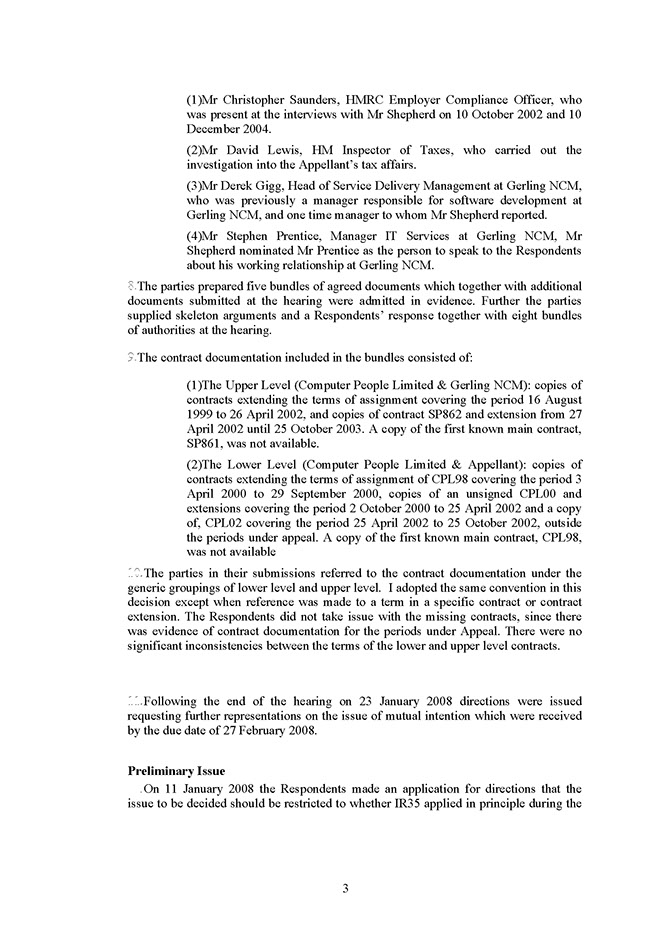
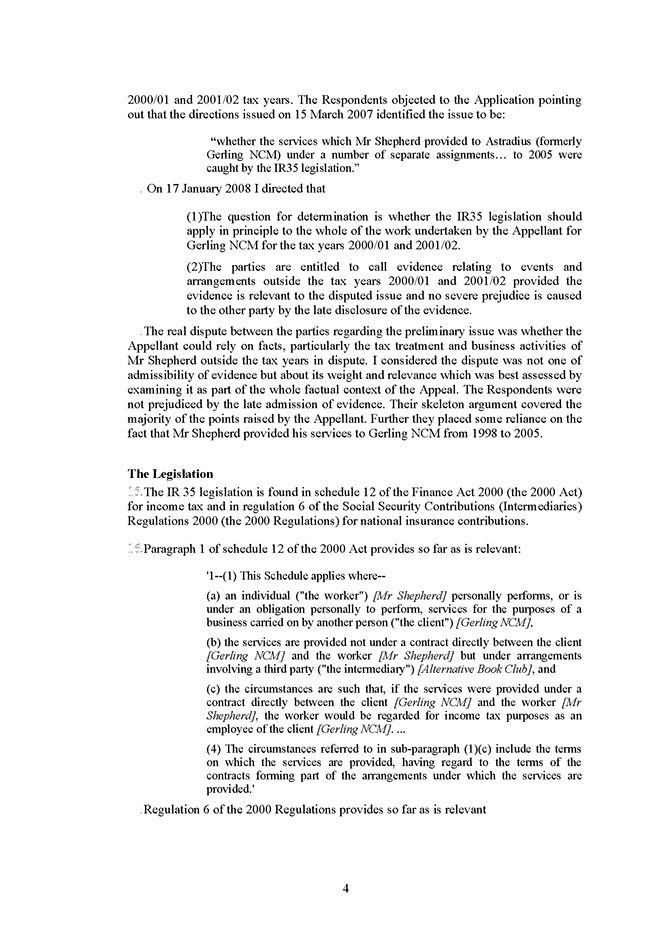
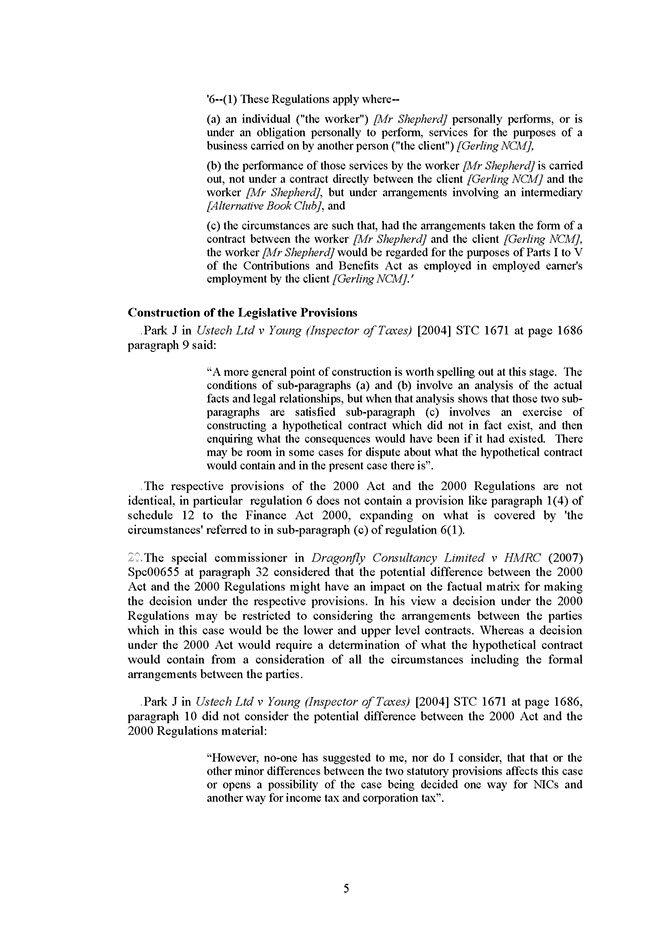
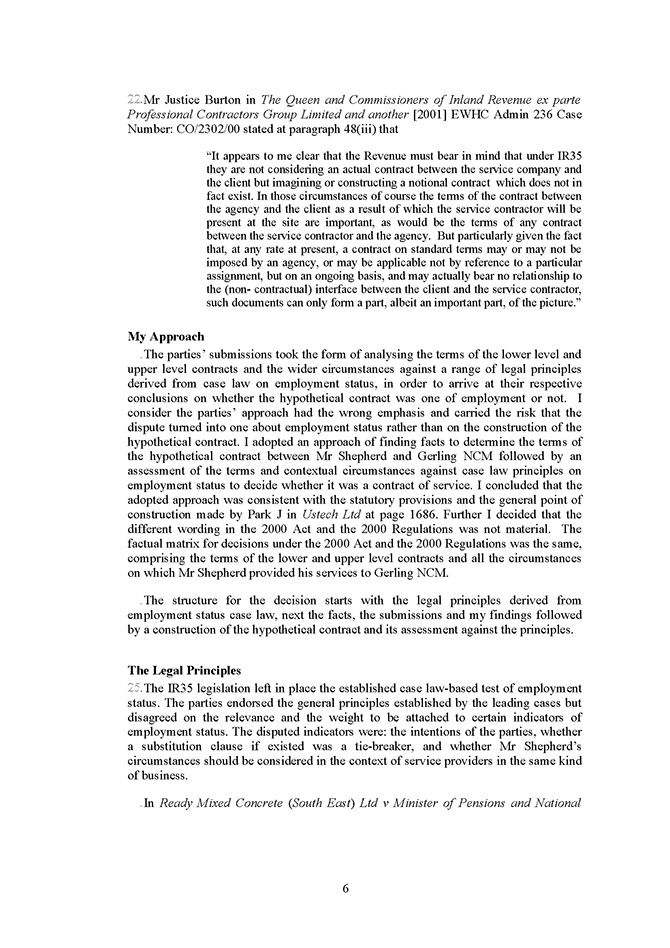
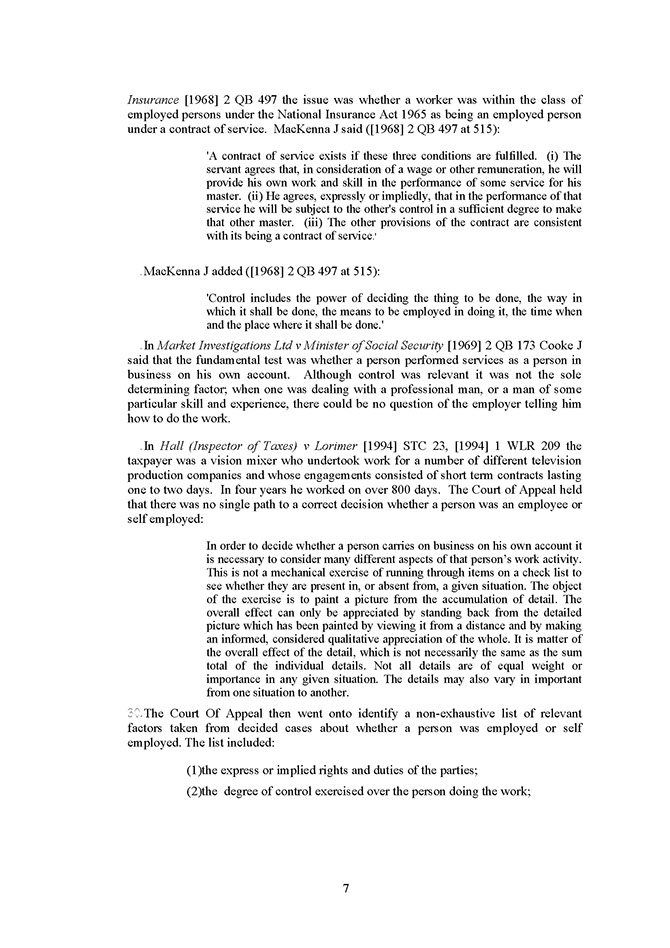
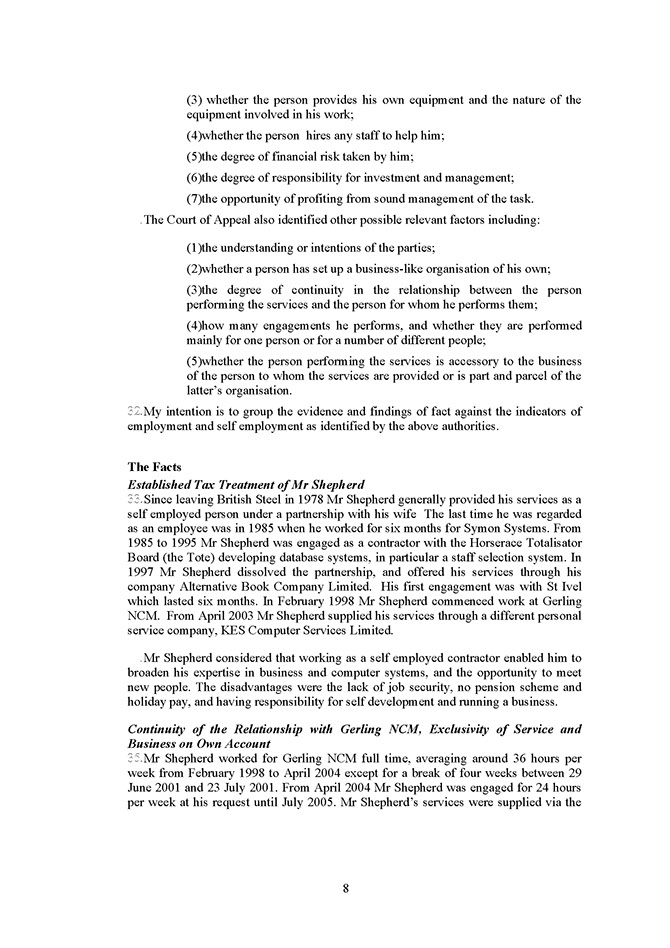
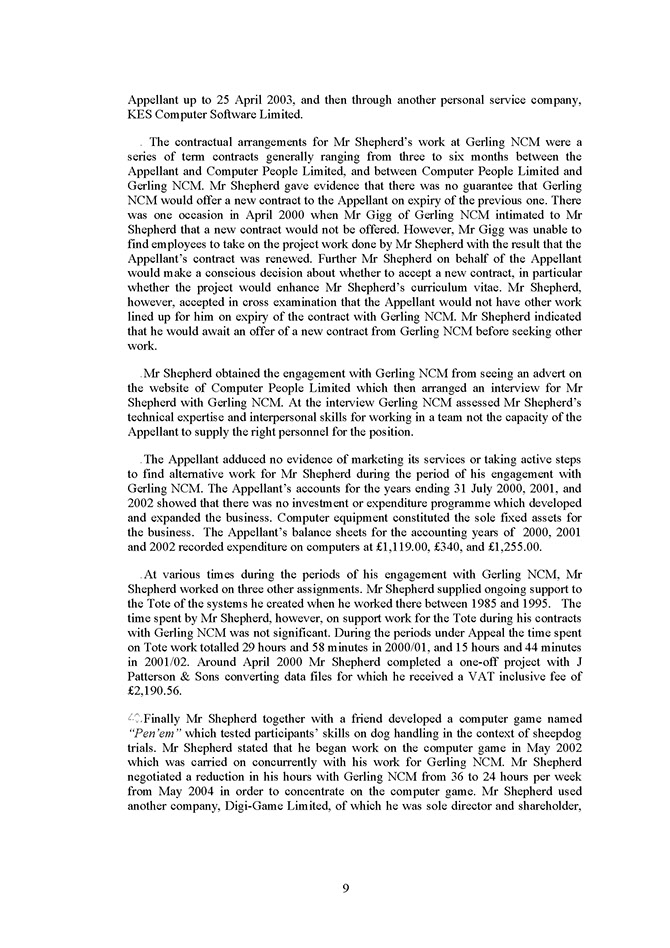
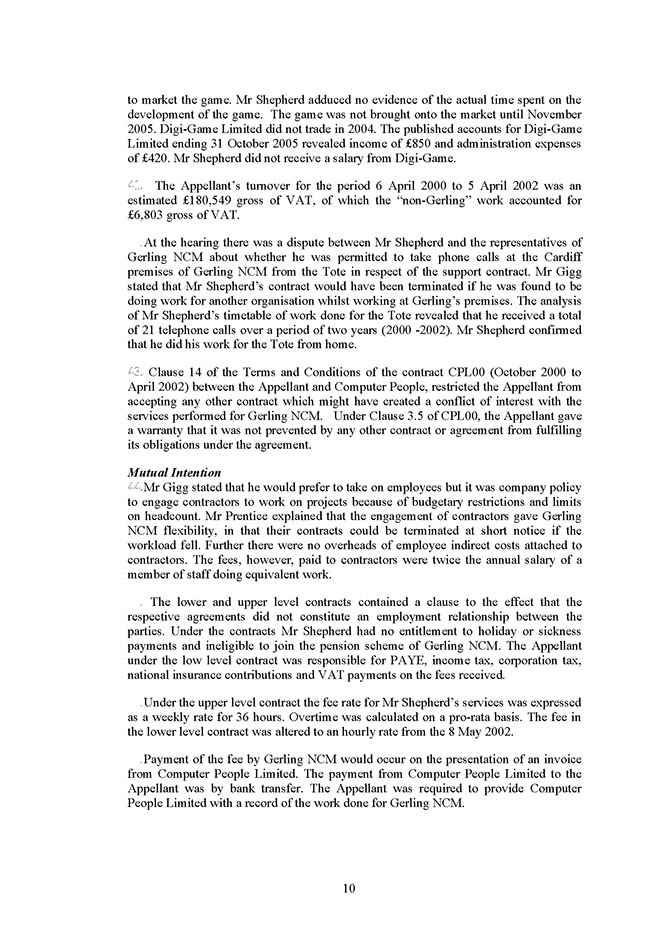
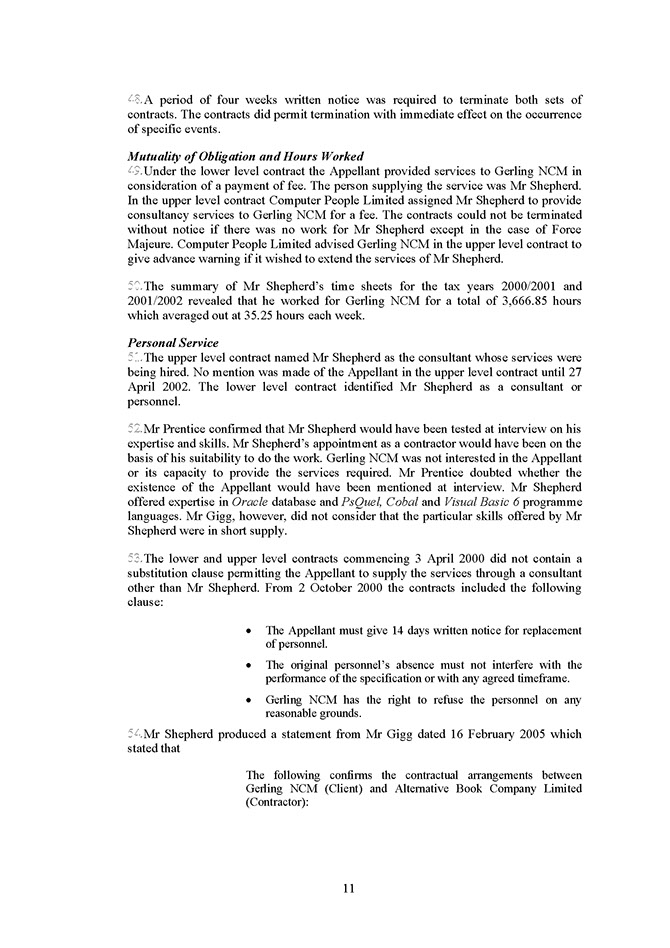
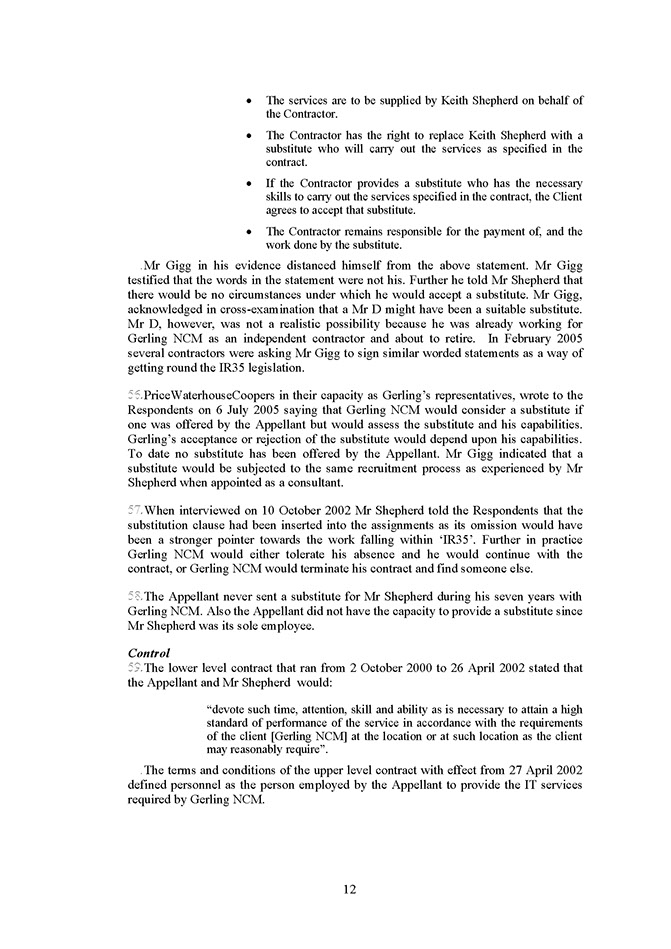
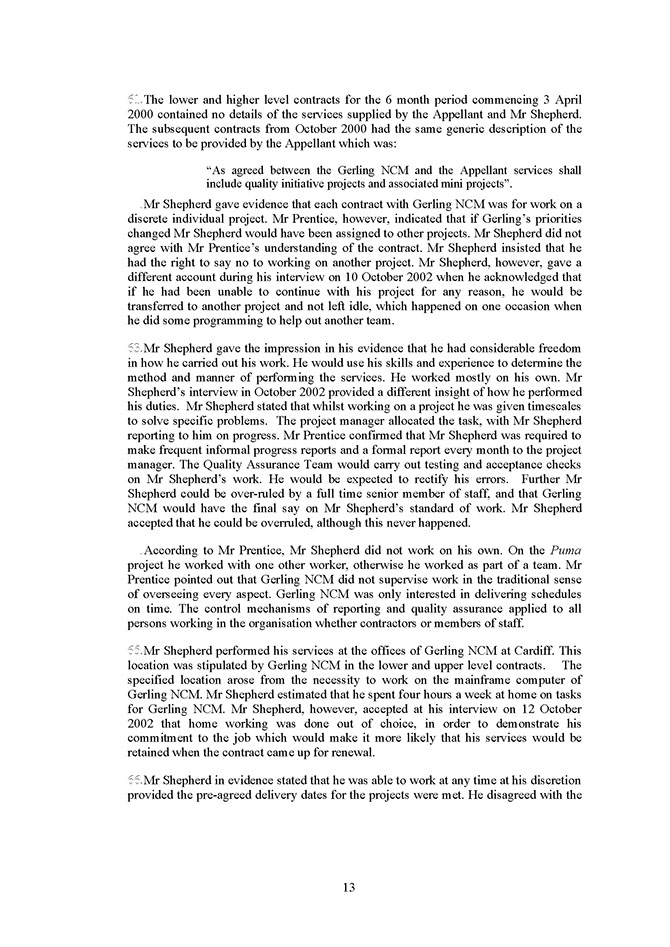
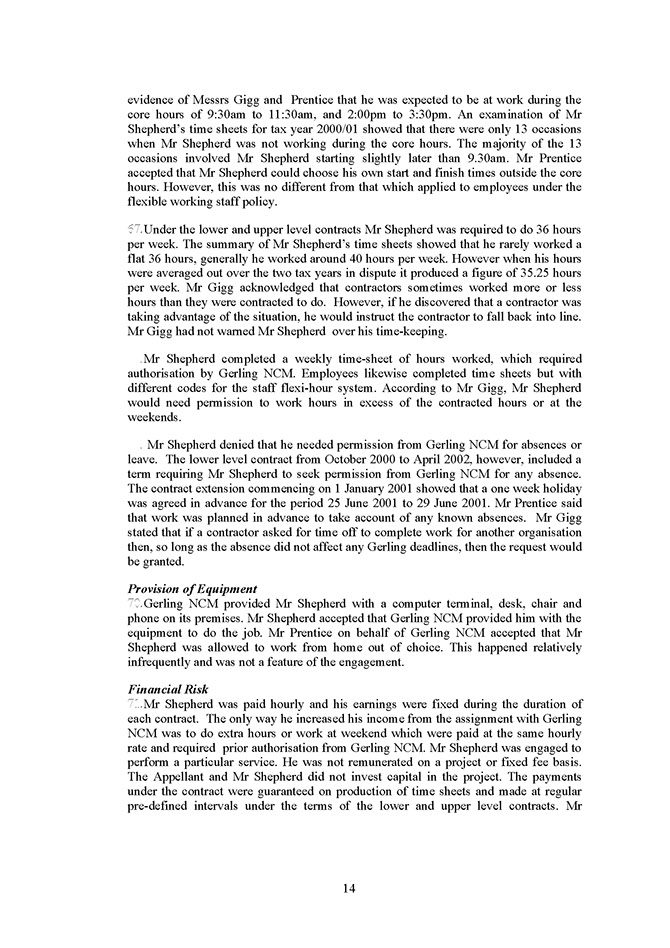
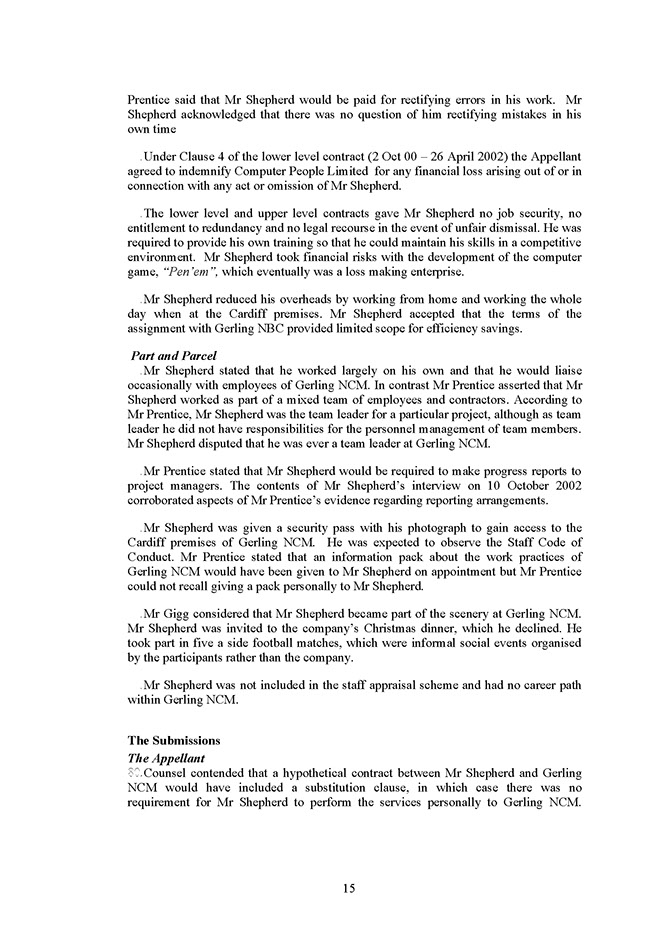
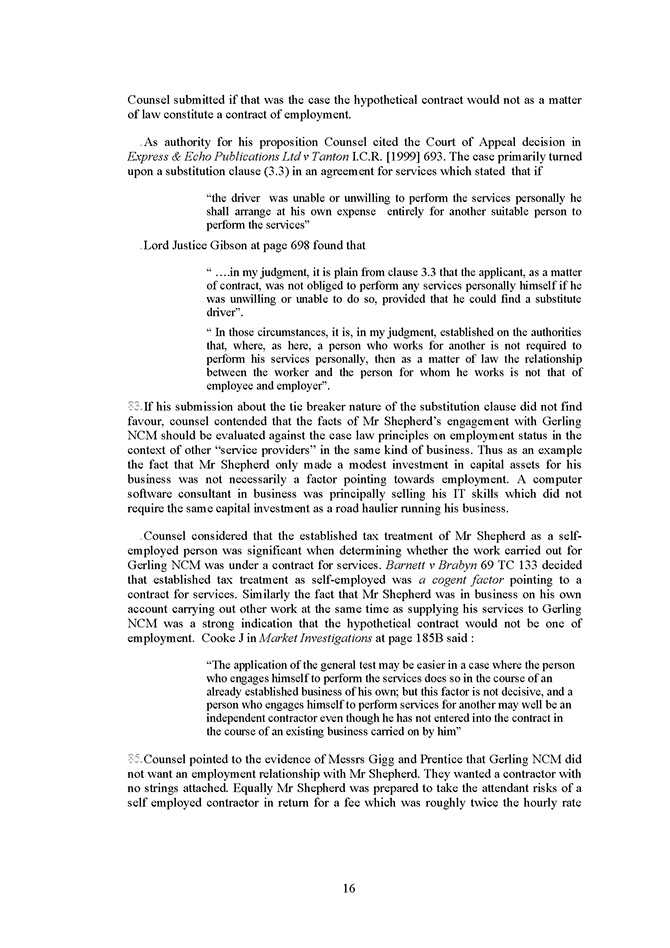
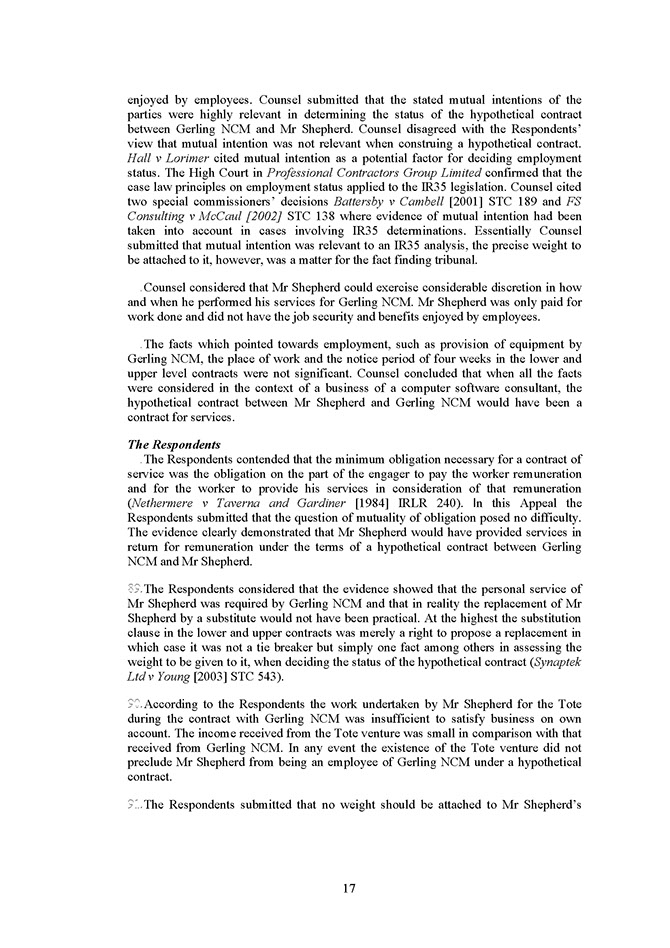
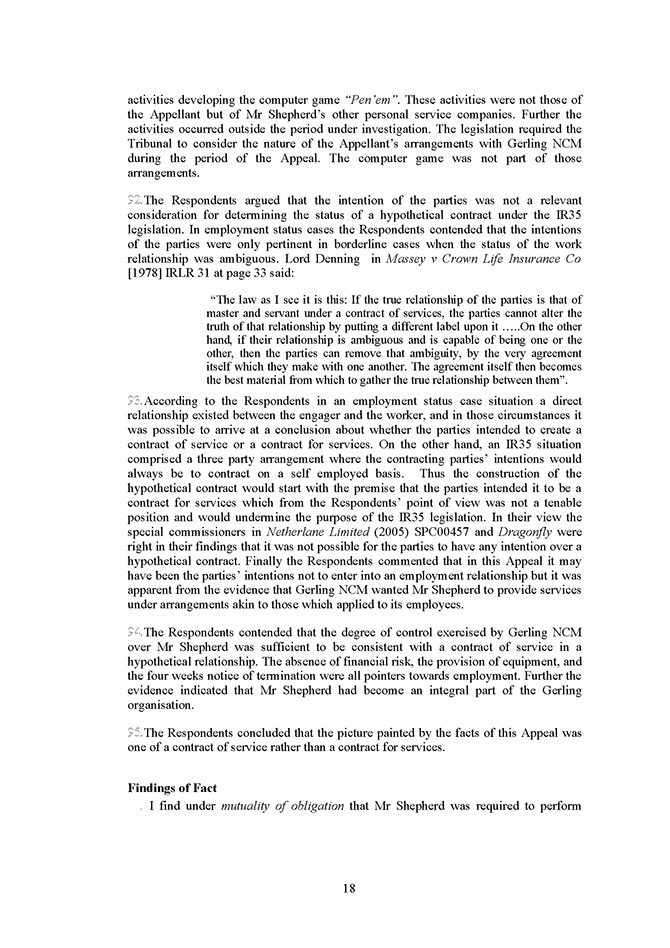
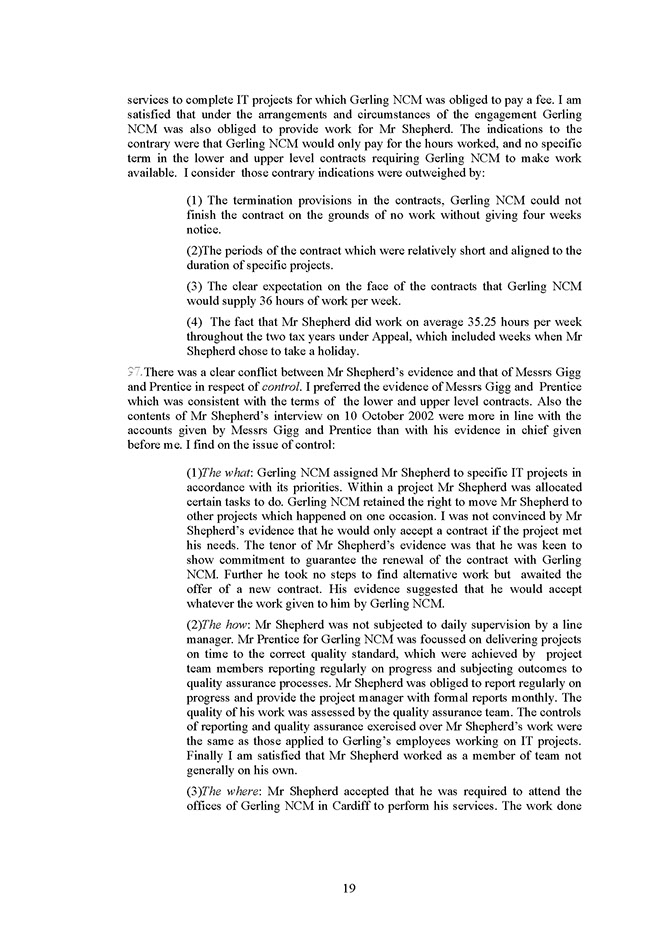
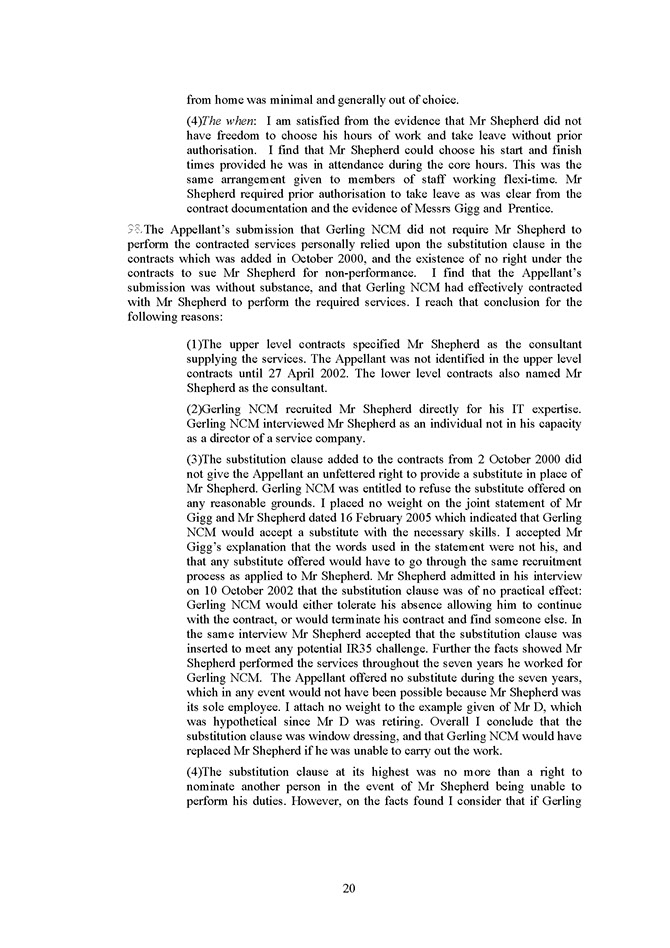
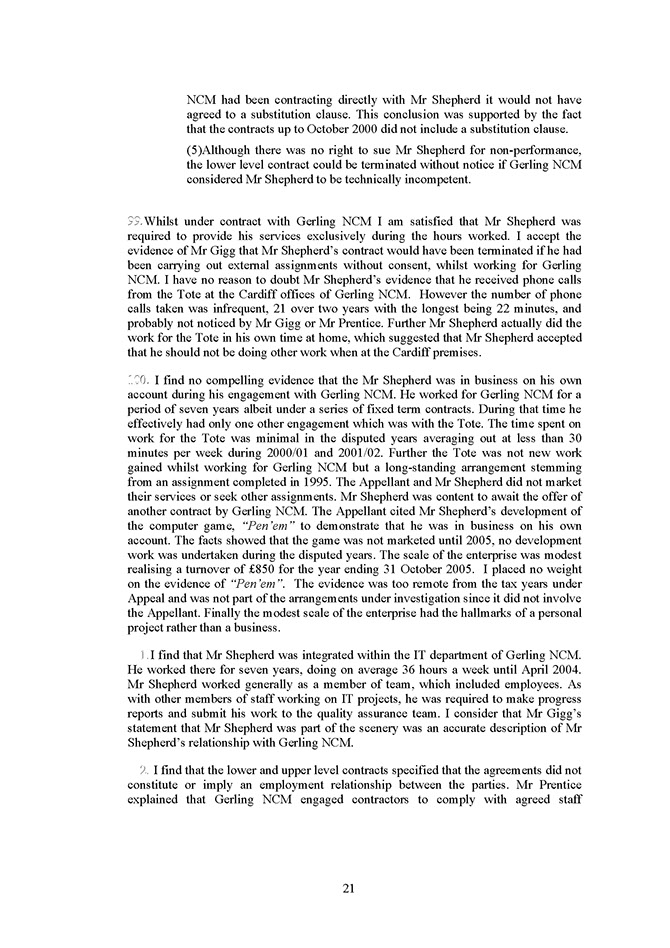
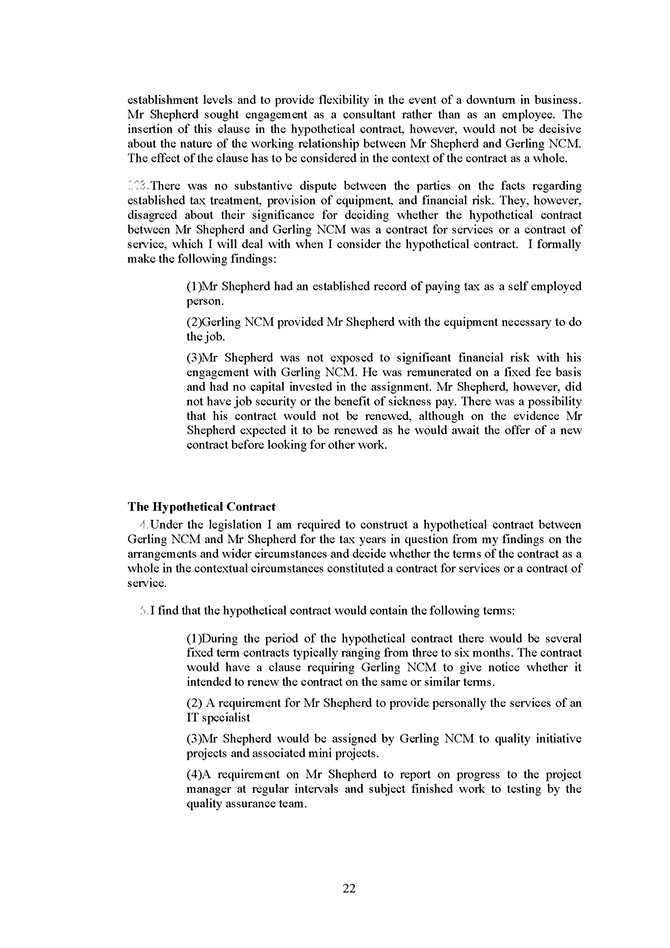
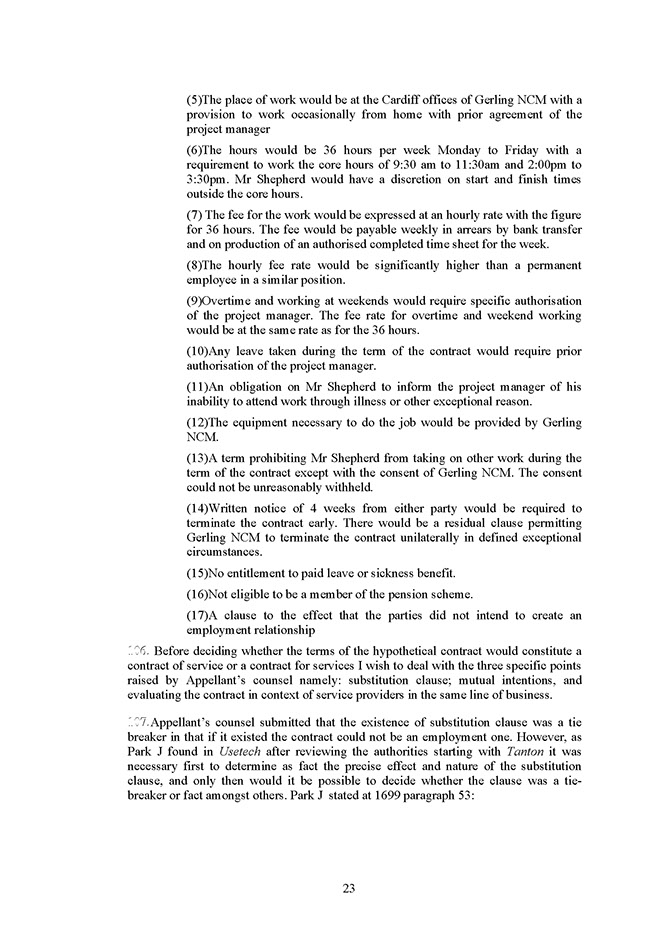
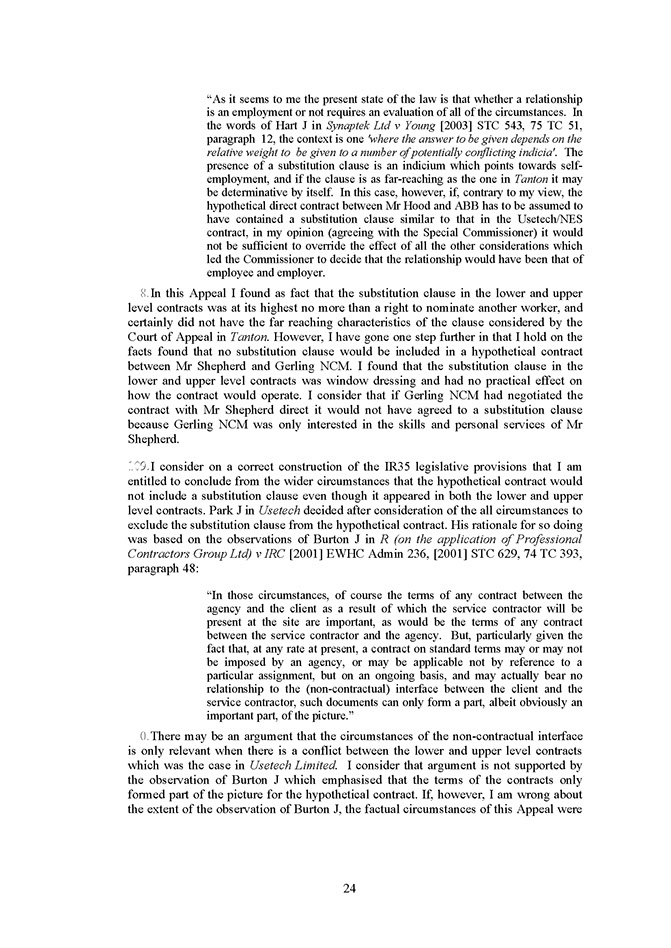
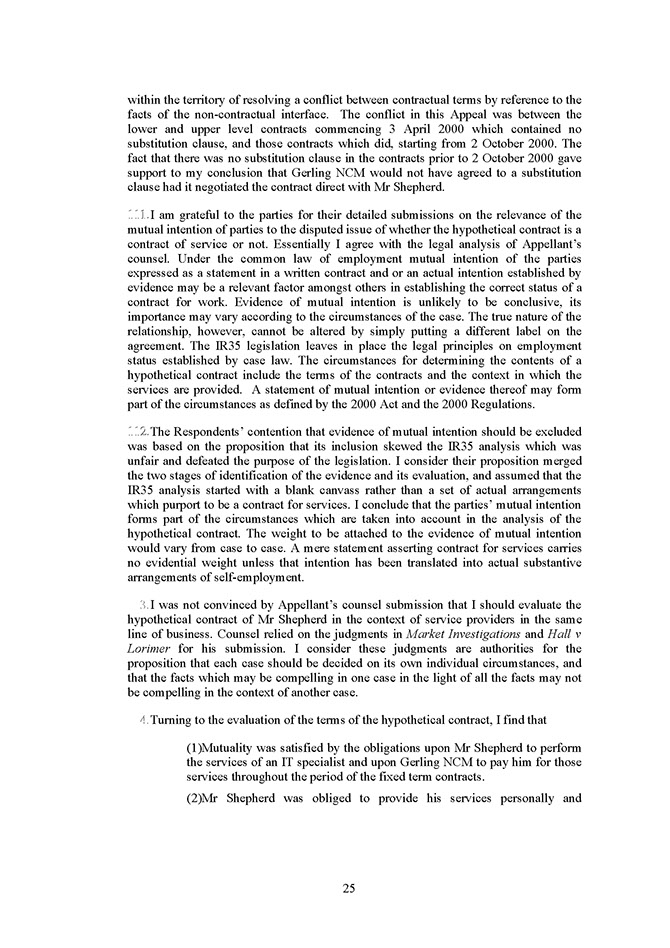
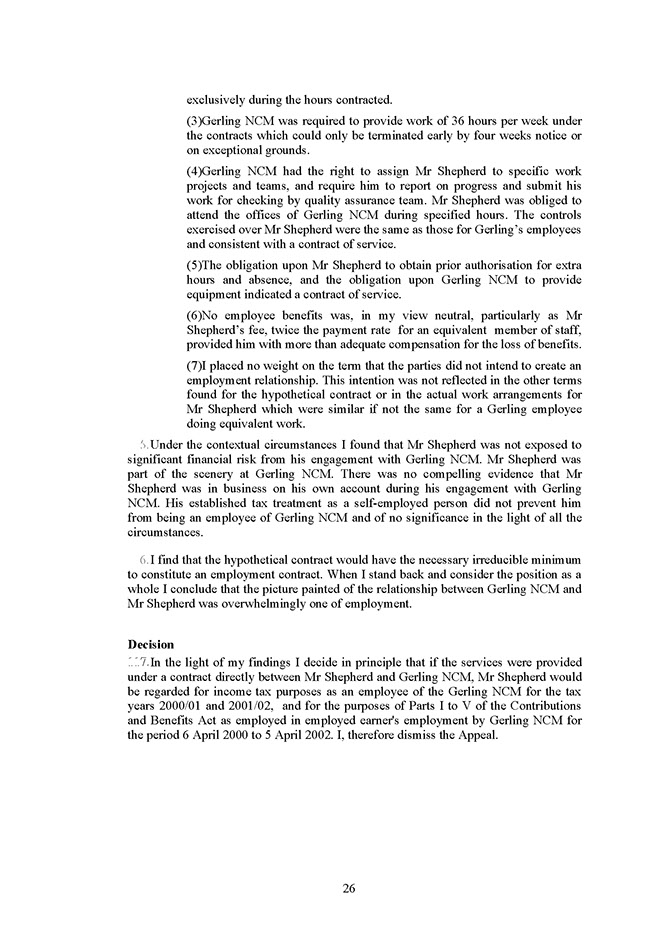
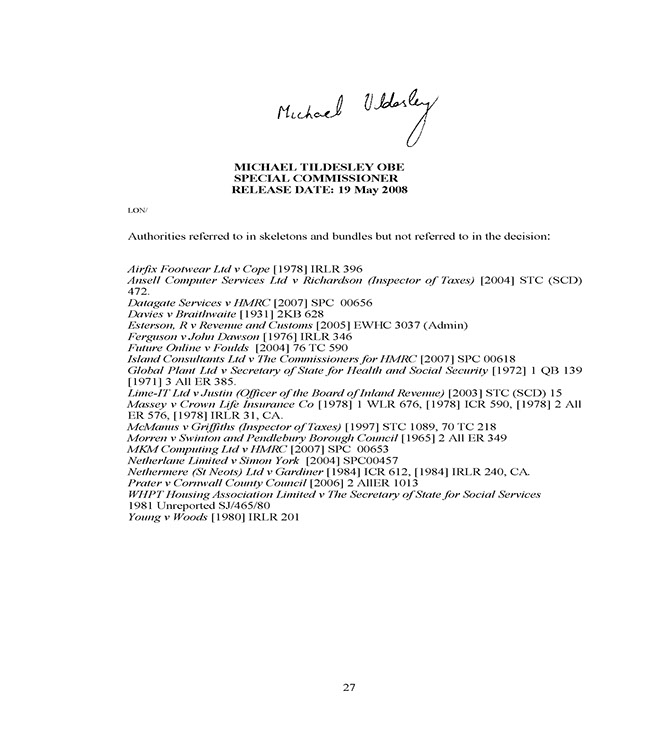
Datagate v HMRC 2007 SpC - IR35 outside
The Special Commissioner decided in the contractor’s favour.
Evidence was heard from the contractor Mr Bret Barnett of Datagate Services Limited, Mr Simon Wycherley of MBDA (the end-client) and Ms Nicole Hartland, also of MBDA.
The Special Commissioner made the following findings of fact:
Datagate entered into a contract with the agency Technology Project Services International Limited (TPS)) for the supply of services to MBDA.
The contract excluded an employment relationship.
The Special Commissioner set out clauses in the contract of material importance relating to intention and Datagate’s right to provide services to other parties during the the engagement.
Datagate was paid by the hour plus VAT.
TPS had an arrangement with MBDA for the supply of services.
The work had to be carried out by a particular person primarily for security reasons.
There was a right to substitute subject to security clearance but this right was not exercised.
There was no provision for a minimum number of hours.
Mr Barnett had discretion as to when to work and discussed time off with the team leader as a matter of courtesy.
Mr Barnett worked with the relevant team but was provided with ‘discrete sections of work’, namely projects.
MBDA wished to learn from him
The Special Commissioner then reached the conclusion that Mr Barnett’s relationship with MBDA ‘was that of a professional consultant providing independent services when looked at as a whole’.
In making these findings of fact, the Special Commissioner focused primarily on the Ansell case and the overall test of whether Mr Barnett was in business on his own account within the context of the engagements with MBDA and the other circumstances. The Special Commissioner also referred directly to factors set out in the Revenue’s Employment Status Manual.
The Special Commissioner placed considerable importance on whether there was an ultimate right of control by MBDA over Mr Barnett. However, as in the case of Ansell, the Special Commissioner took account of the strong security requirement as the projects concerned were defence-related and concluded that any right of control was not akin to that expected of employment. Similarly, the Special Commissioner dismissed HMRC’s argument that the provision of equipment by MBDA was indicative of employment within the security context. At the hearing the Special Commissioner commented on the strong similarities with Ansell.
During the hearing Mr Michael Faulkner for HMRC argued that a right of control existed over Mr Barnett as to the hours to be worked and that the work itself had to be ‘agreed’ with MBDA. The Special Commissioner did not regard this as an important factor in the outcome of the case.
The Special Commissioner provided useful comments on the issue of financial risk. During the hearing Mr Michael Faulkner for HMRC argued that Datagate was not exposed to significant financial risk. The Special Commissioner concluded that this argument is ‘somewhat circular’ and the fact that Datagate would lose its main source of income if the contract was terminated demonstrated greater financial risk than would be expected in a relationship of employment.
Equally, the Special Commissioner found that Mr Barnett could profit by sound management by organising his work effectively. The Special Commissioner placed an interesting interpretation on this test by accepting that Mr Barnett was able to organise his work to give himself the benefit of more free time rather than simply provide services to other clients concurrently and thereby profit financially. Mr Barnett gave compelling supportive evidence that MBDA did not have a right of control as to when the work was done.
Although the decision did not specifically address the fundamental issue of mutuality of obligations, the Special Commissioner found that Datagate was only entitled to payment for work done and the work was project based (in a similar manner to Ansell) and so not integrated into the end-client’s business. This emphasises the importance of defining the work as a discrete project at the outset and follows Lime-IT and Ansell. The contract with the agency TPS specified the work to be completed and, unlike Synaptek, did not place an obligation on TPS or MBDA to provide work to Datagate and Mr Barnett during the agreement or after completion of the services.
The Special Commissioner also considered that there was no requirement for personal service in the contractual documents and that Datagate had a right to substitute and engage helpers. As the conclusion was reached with the benefit of evidence from both the end-client and Mr Barnett (unlike Lime-IT), the decision does not provide further guidance on the issue of whether a substitution clause in a contractual chain involving an agency is enforceable in respect of the end-client.
In addition, the Special Commissioner did not accept HMRC’s argument that the existence of a right to terminate a contract is equivalent to a right to give notice under a contract of employment.
The intention of the parties was also considered as a relevant factor despite the requirement in the IR35 legislation to assess the hypothetical contract between the worker and the end-client.
Mr Michael Faulkner for HMRC sought to rely on generic information regarding working arrangements supplied by the end-client.
As with Lime-IT the presence of an agency in the contractual chain did not affect the assumption that MBDA was the end-client for the purpose of the hypothetical contract.
First Word v HMRC 2007 SpC - IR35 outside
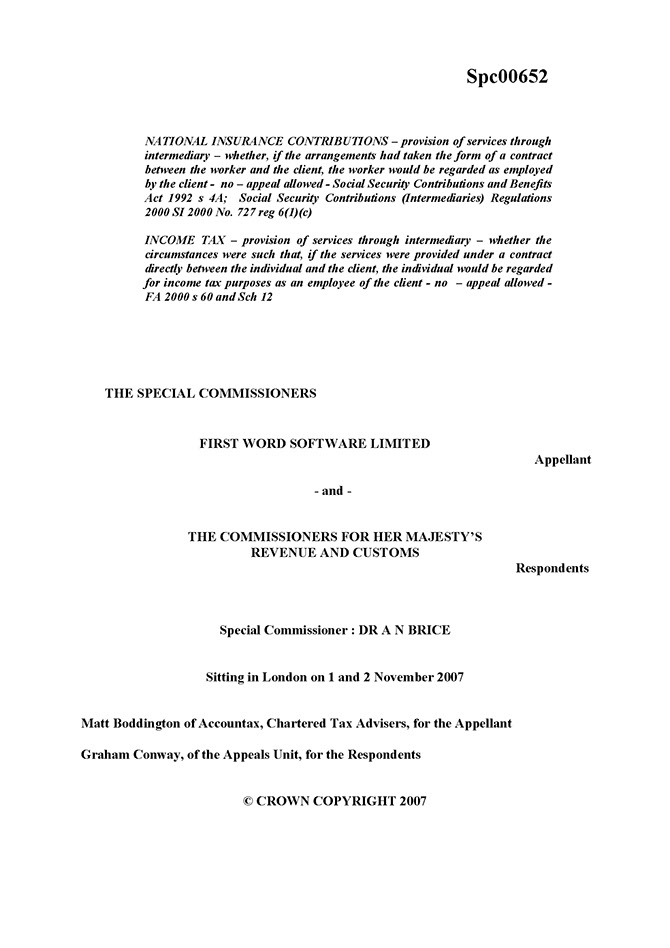
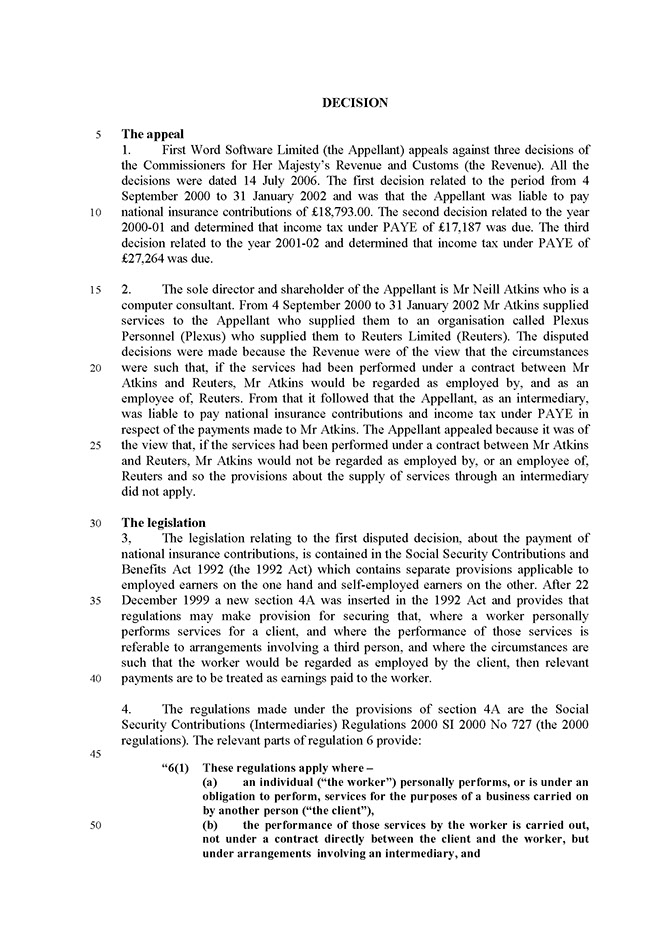
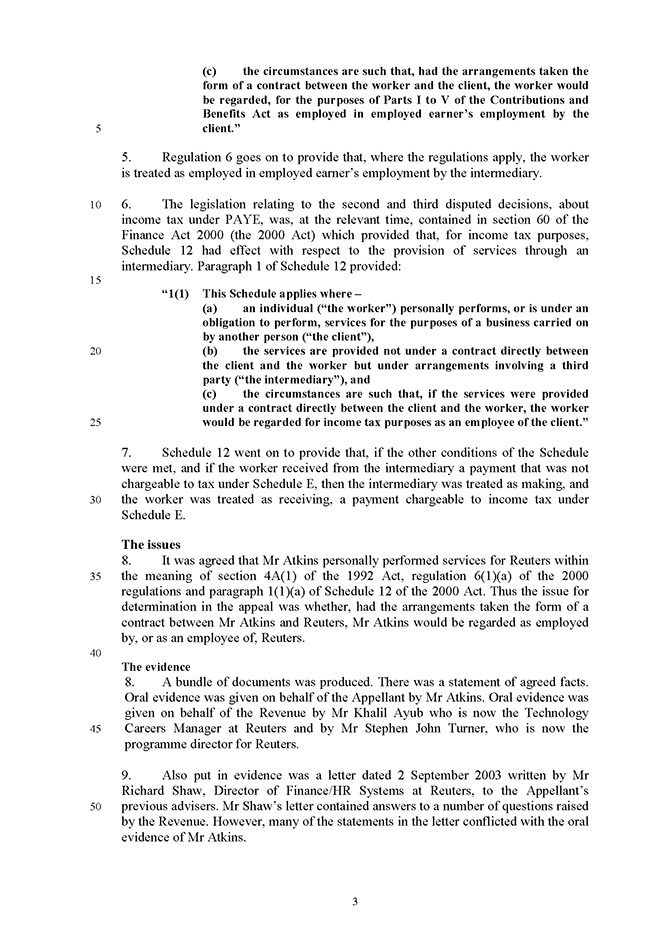
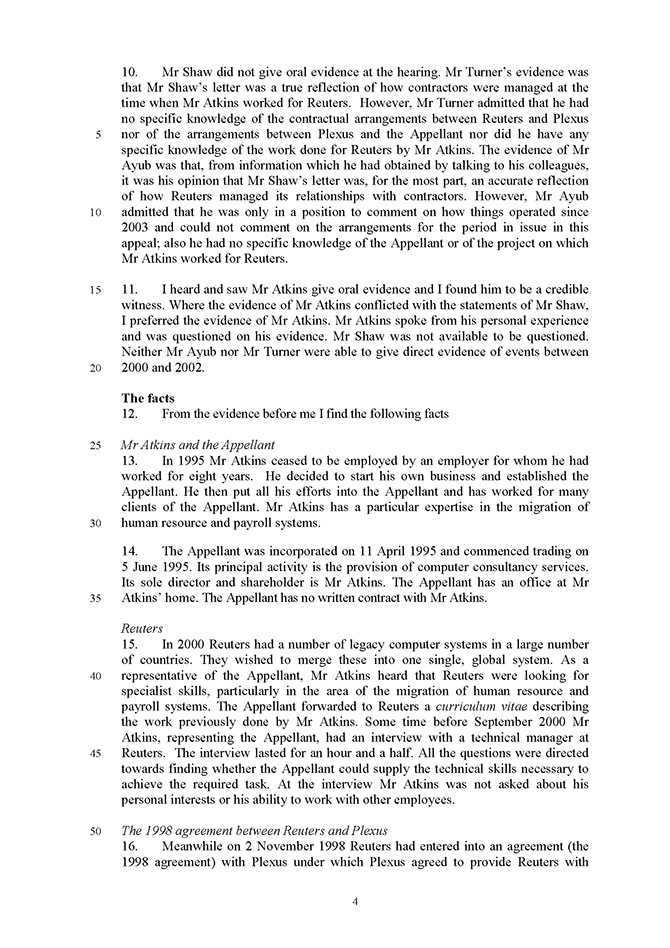
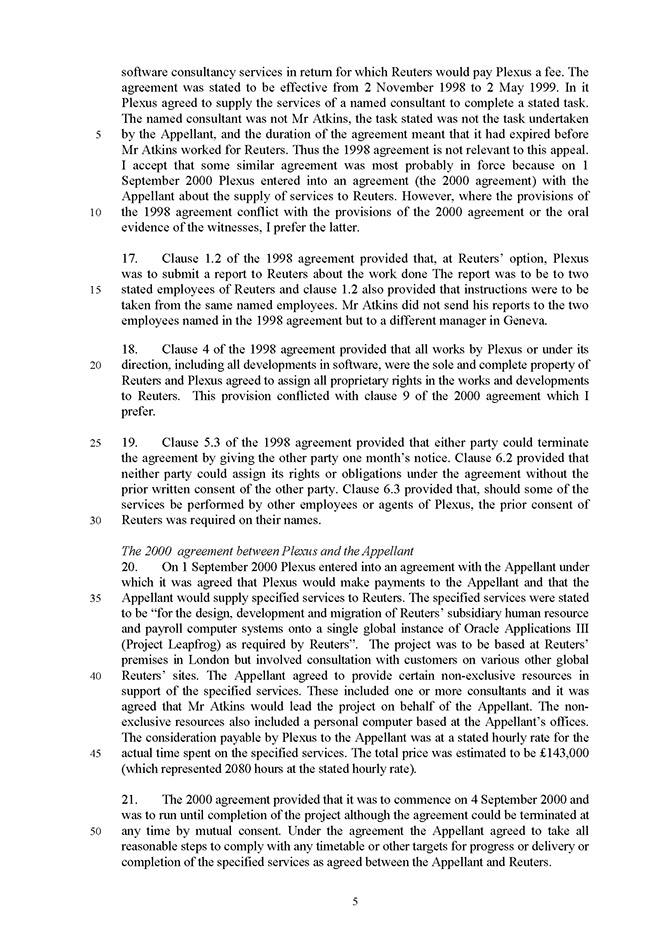
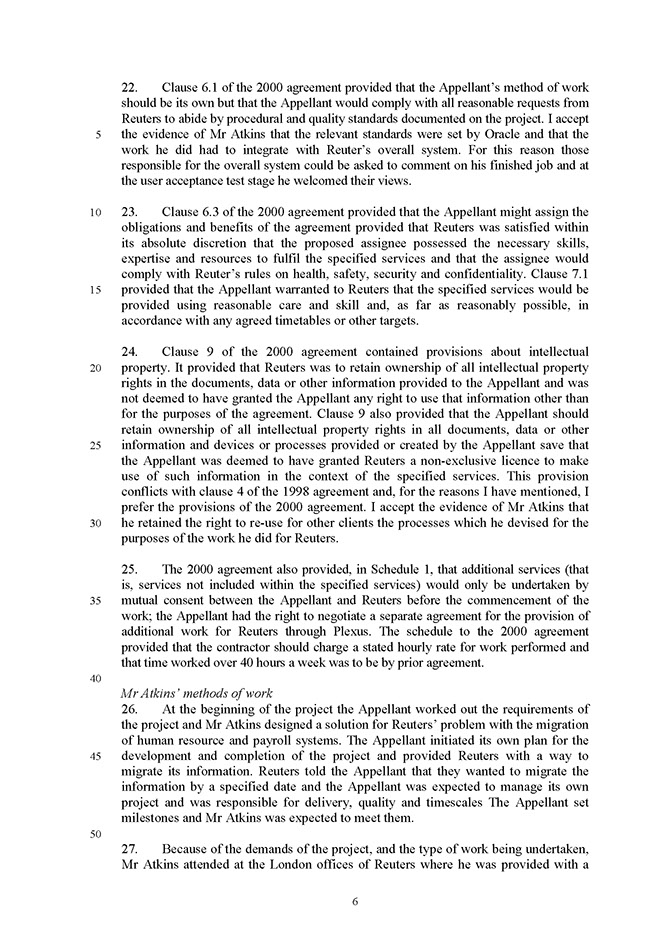
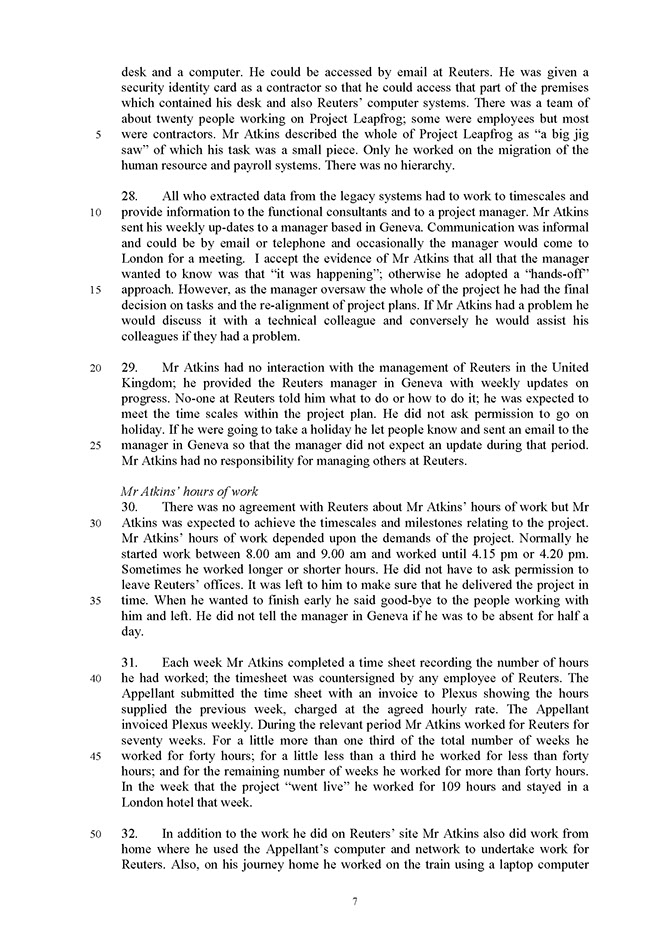
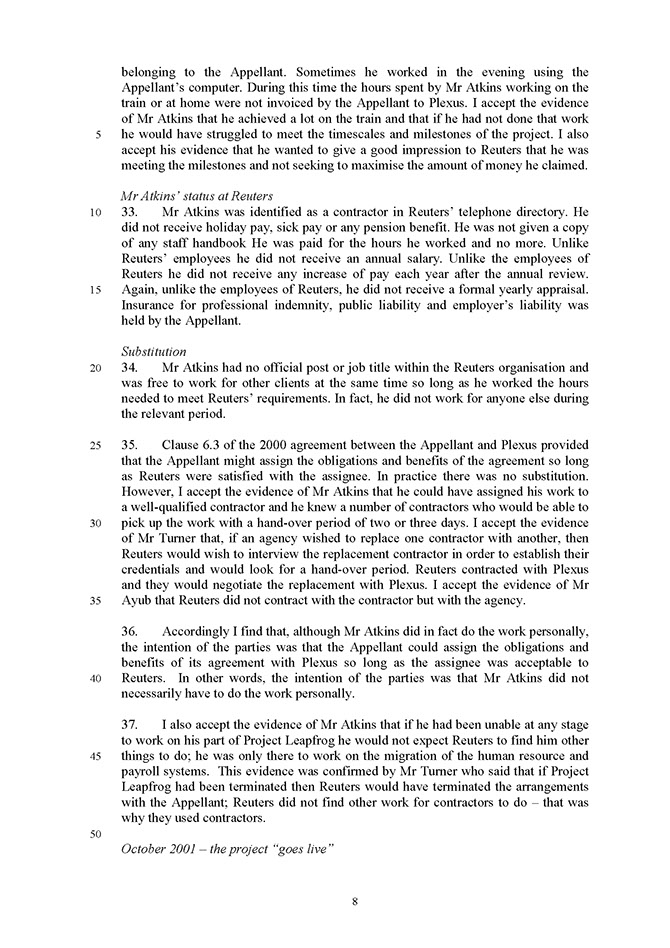
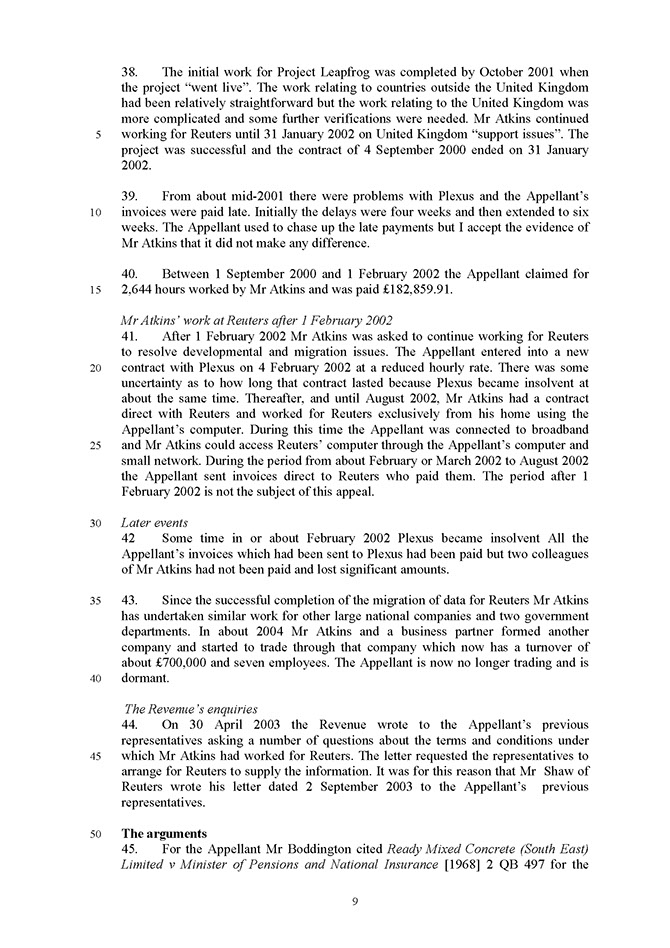
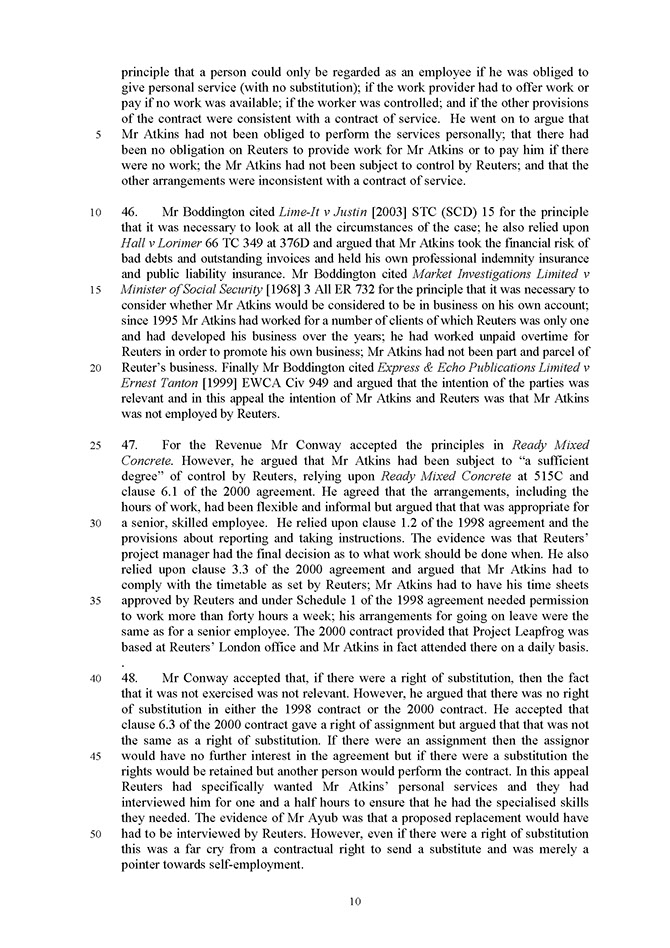
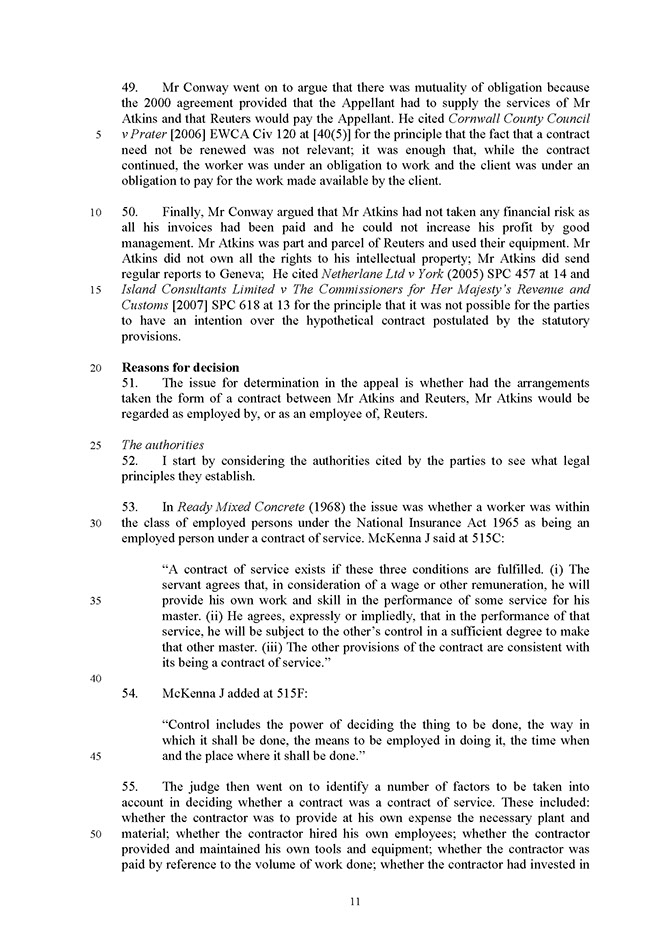
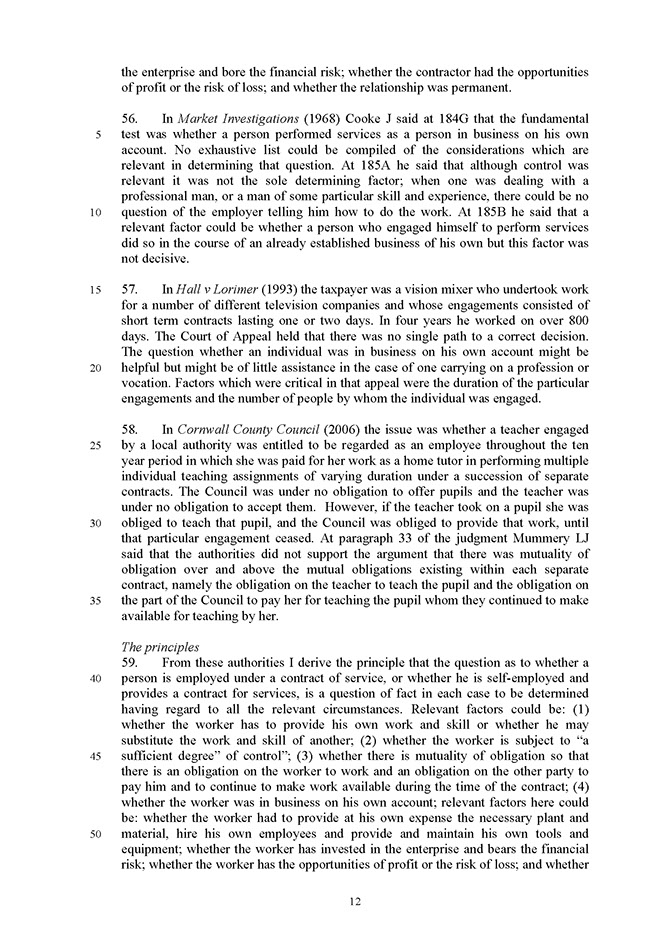
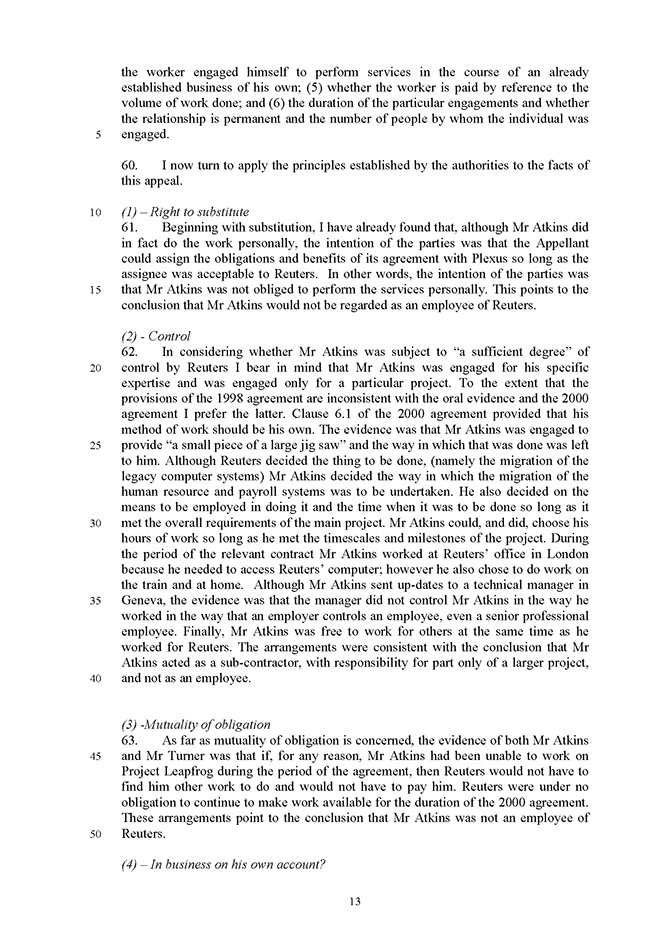
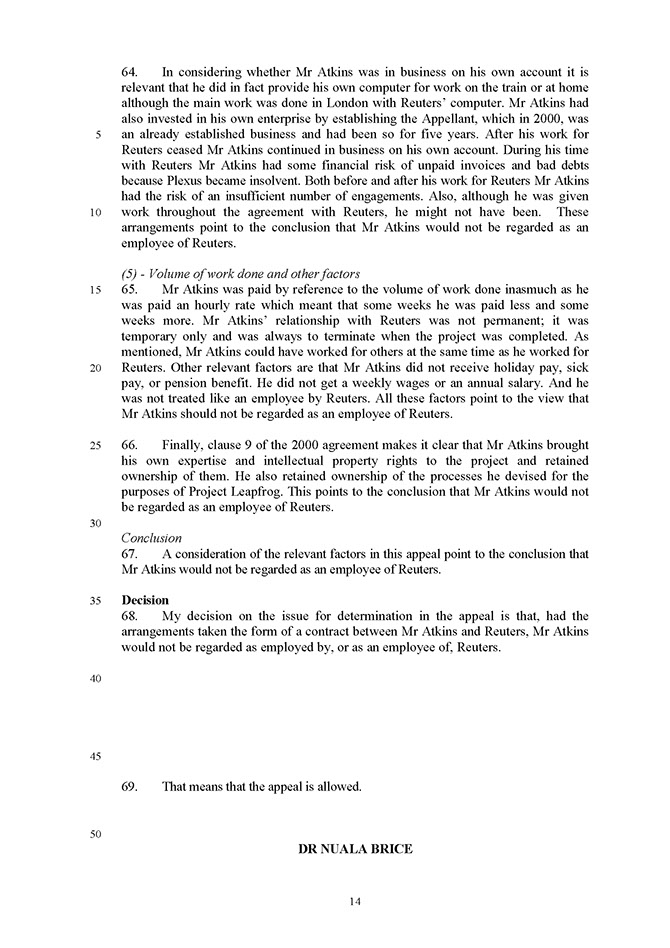
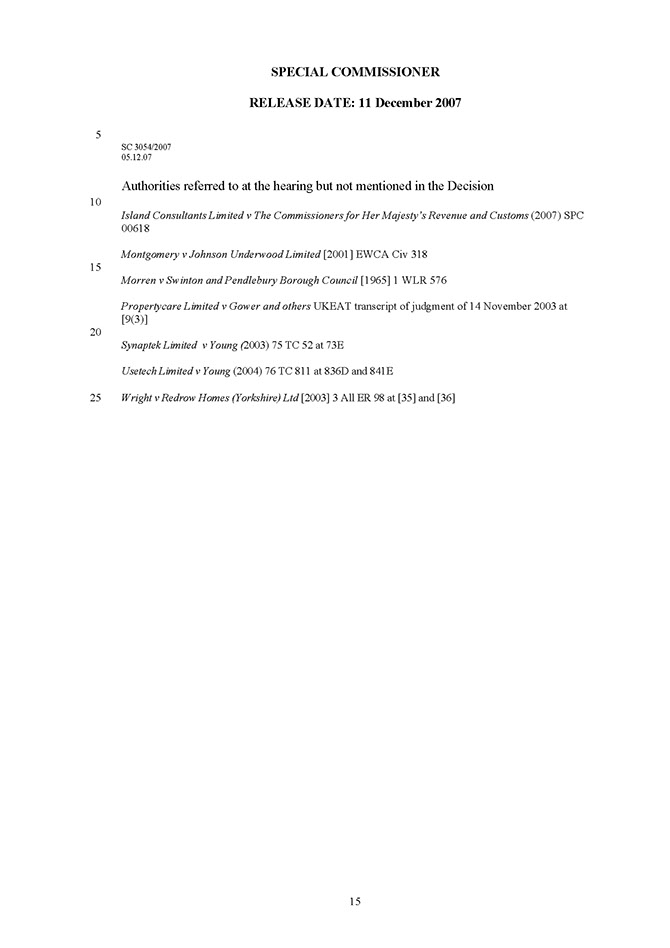
MKM v HMRC 2007 SC - IR35 inside
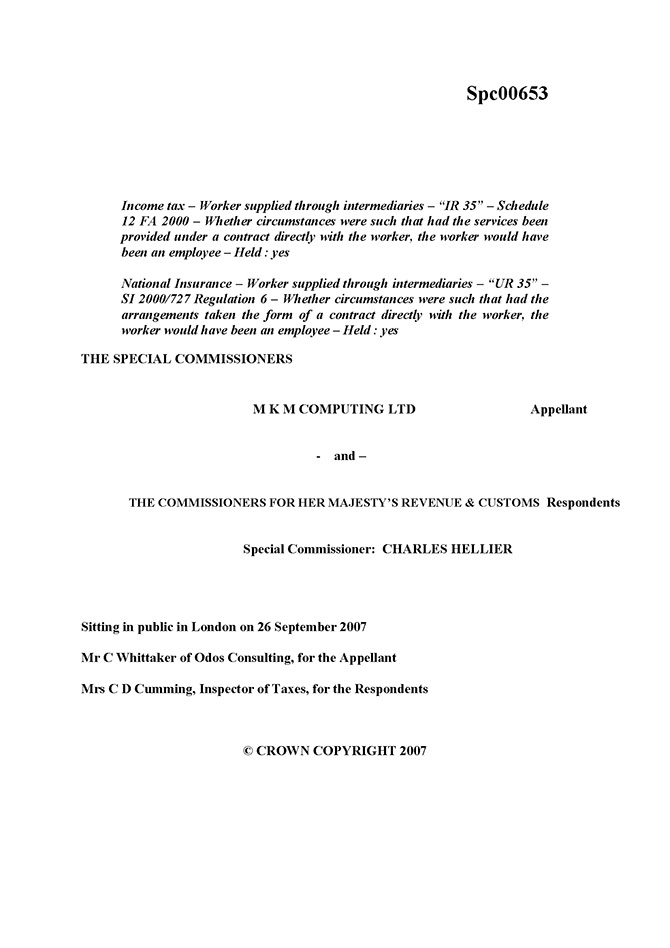
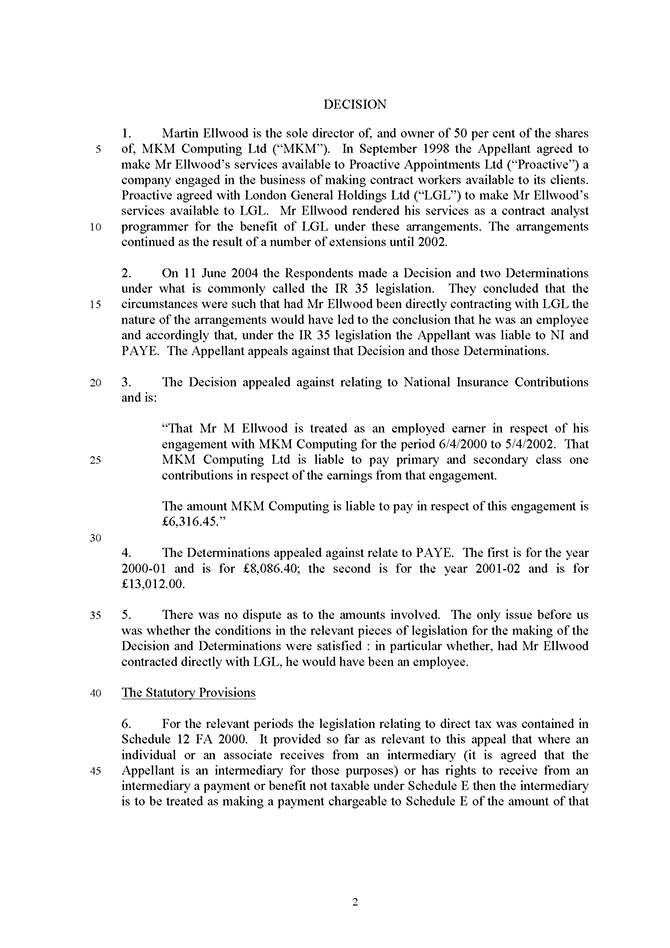
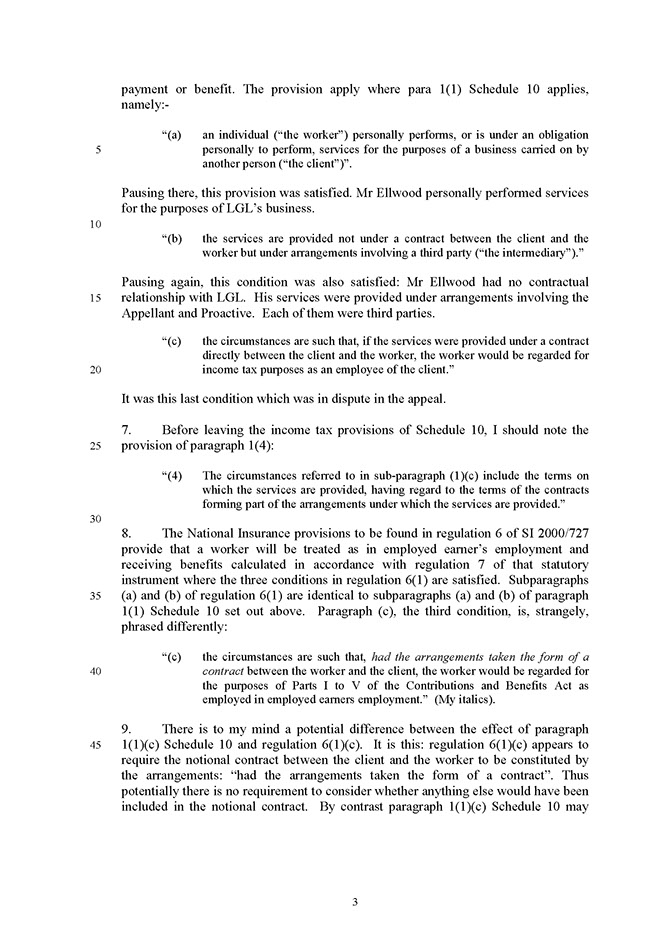
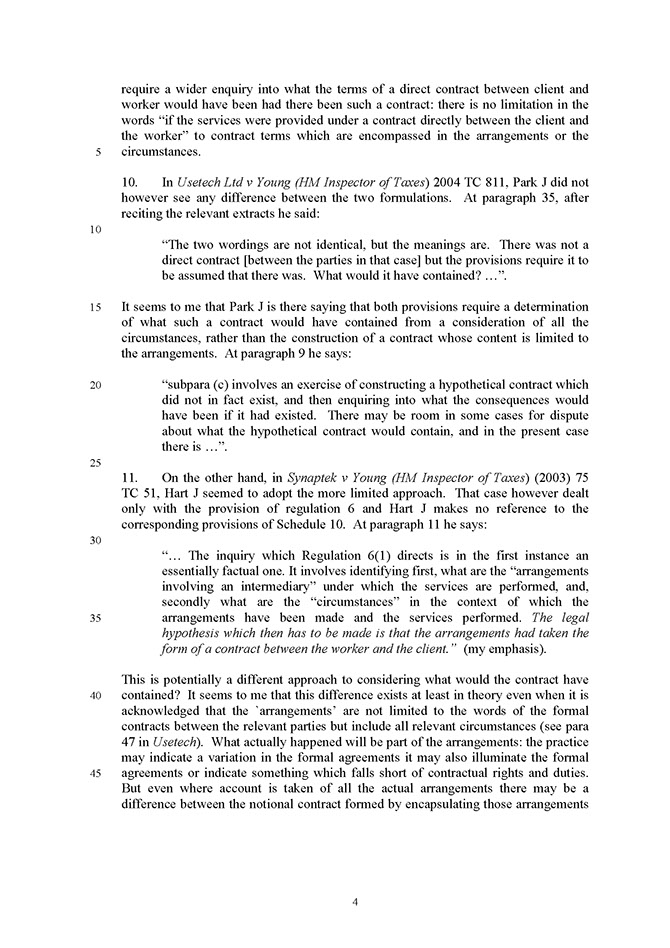
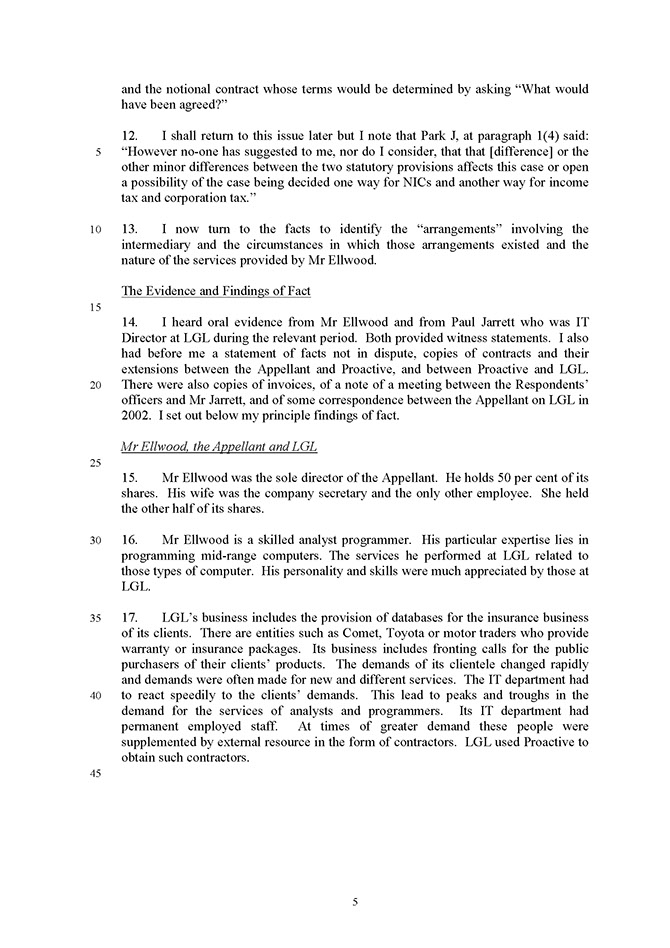
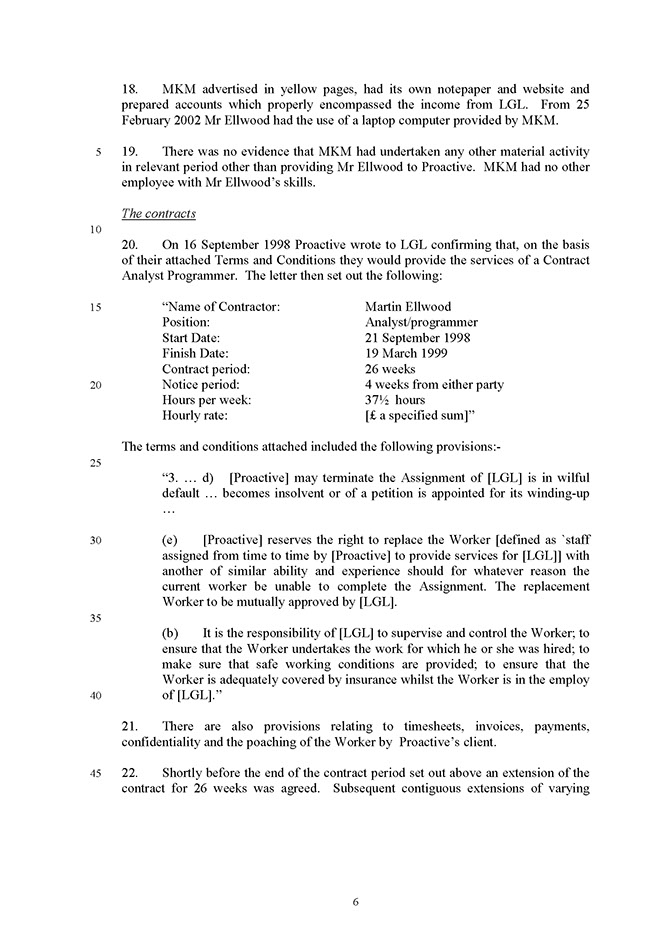
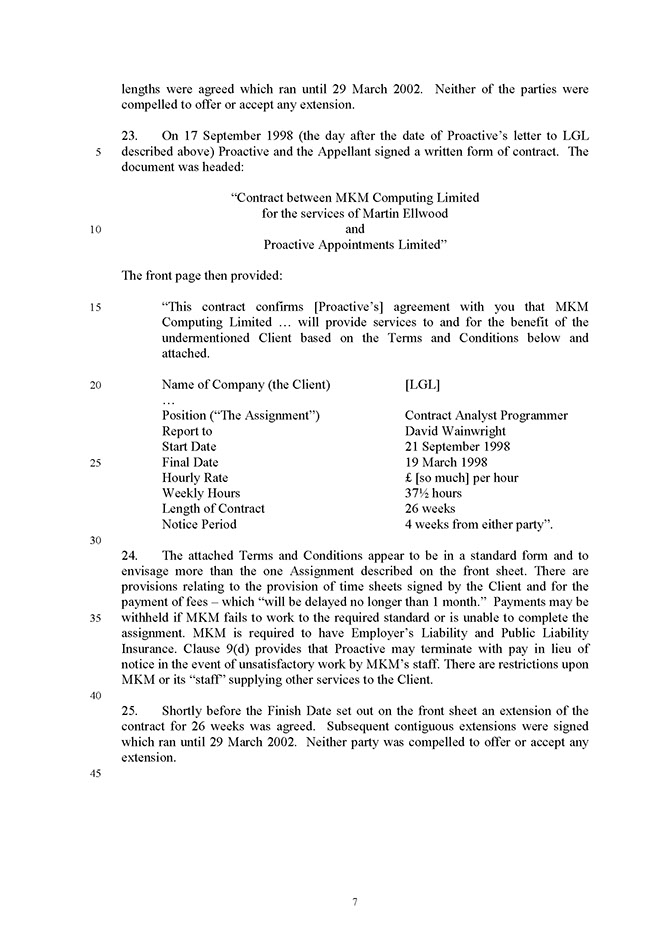
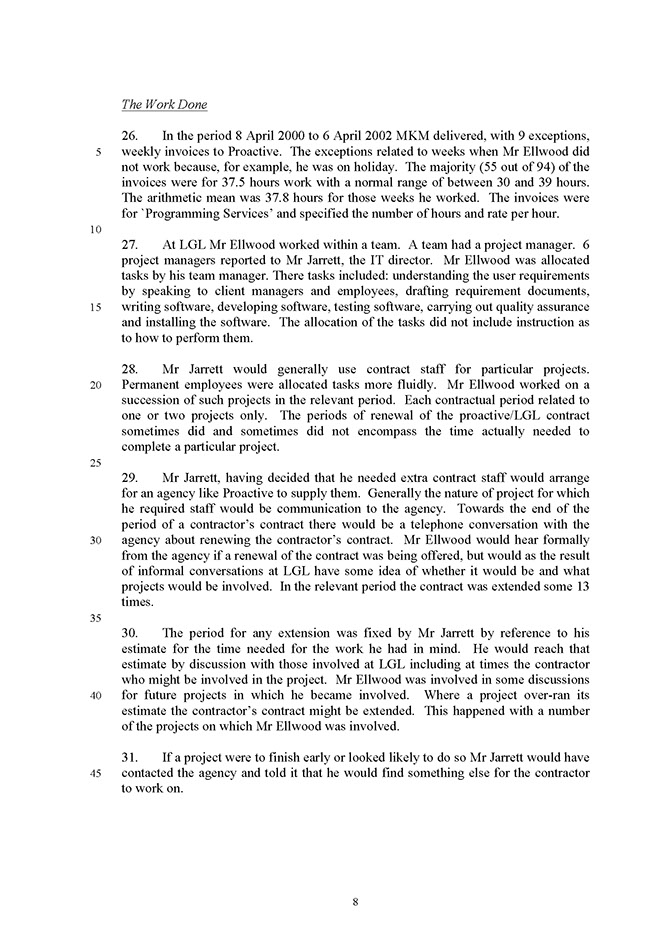
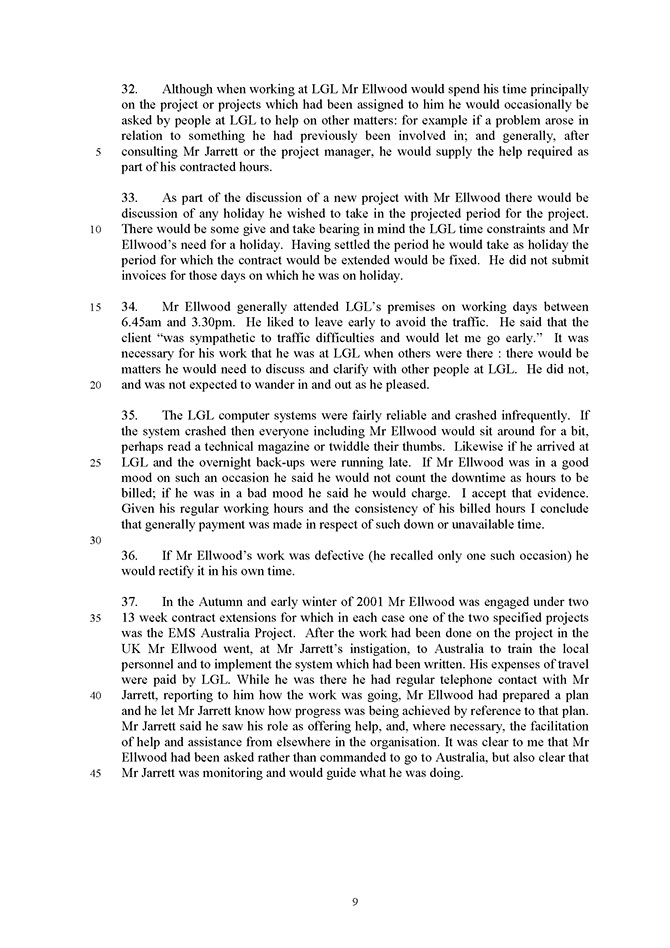
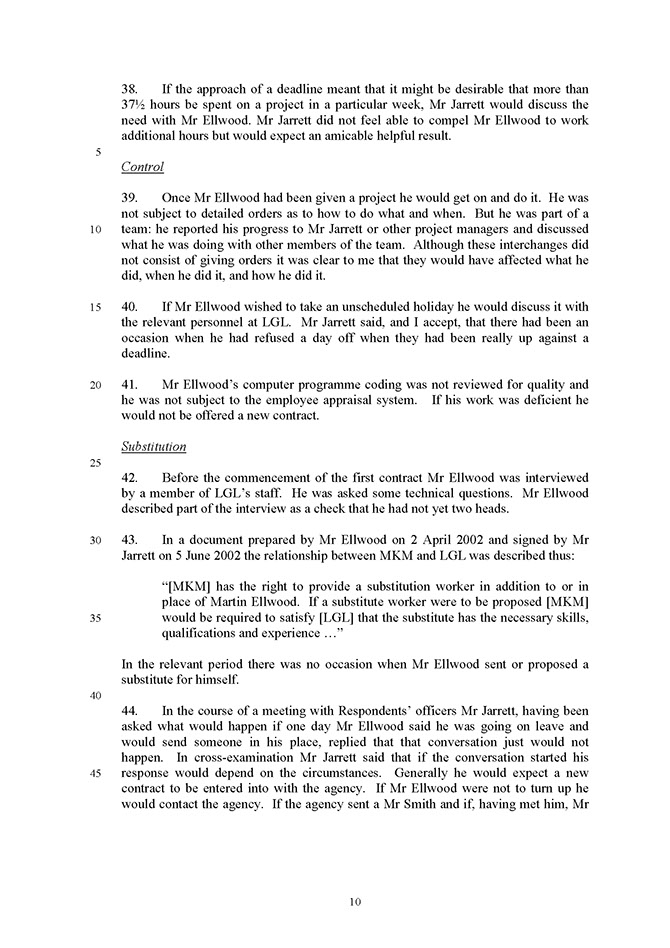
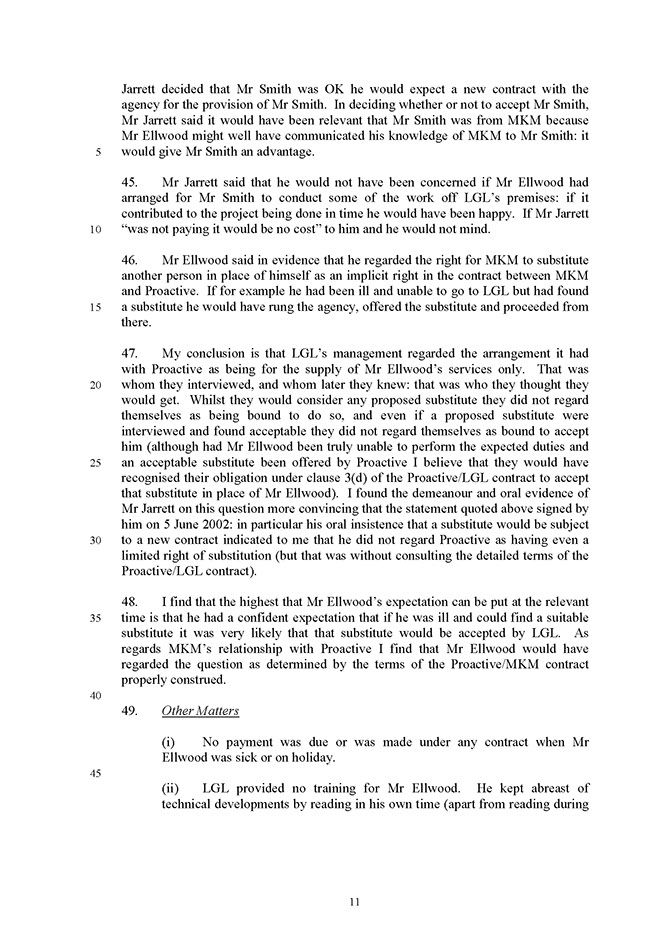
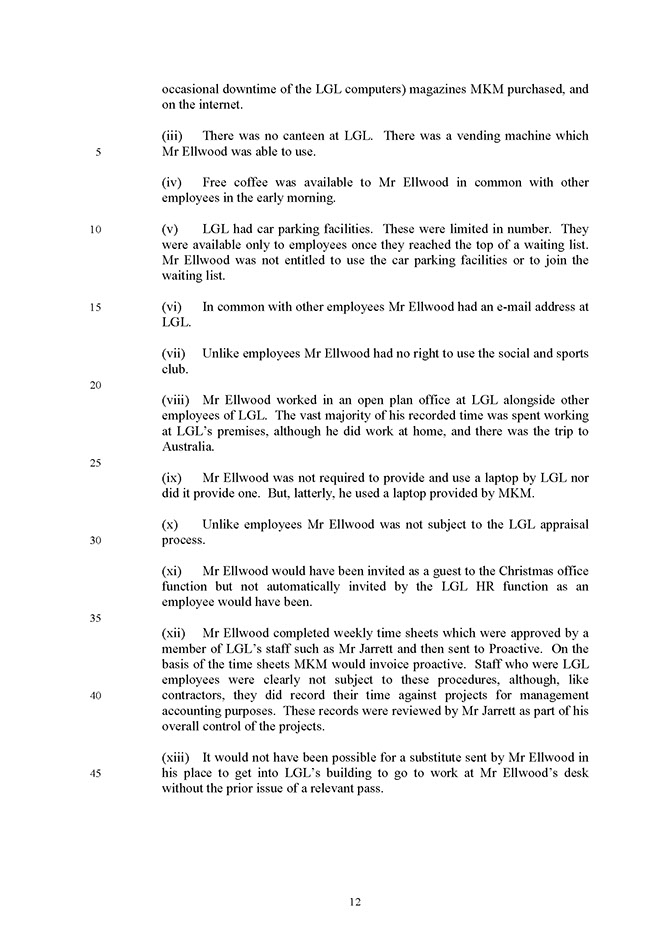
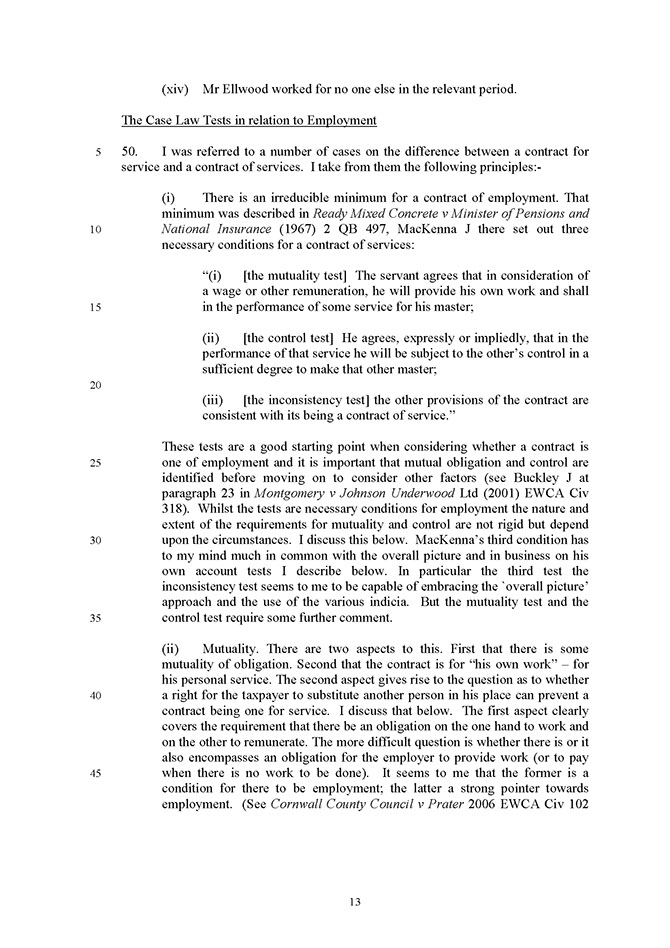
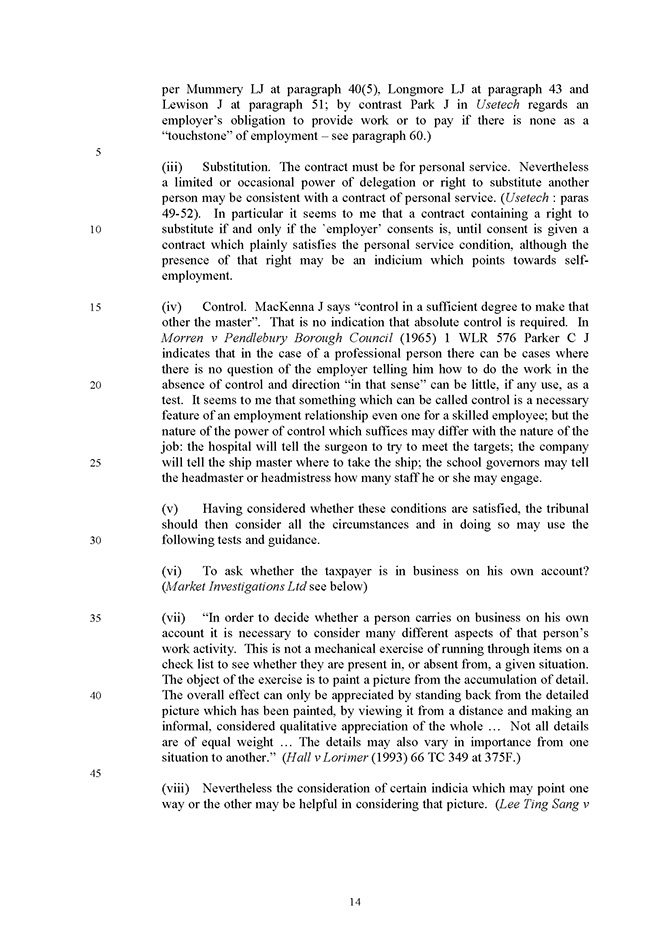
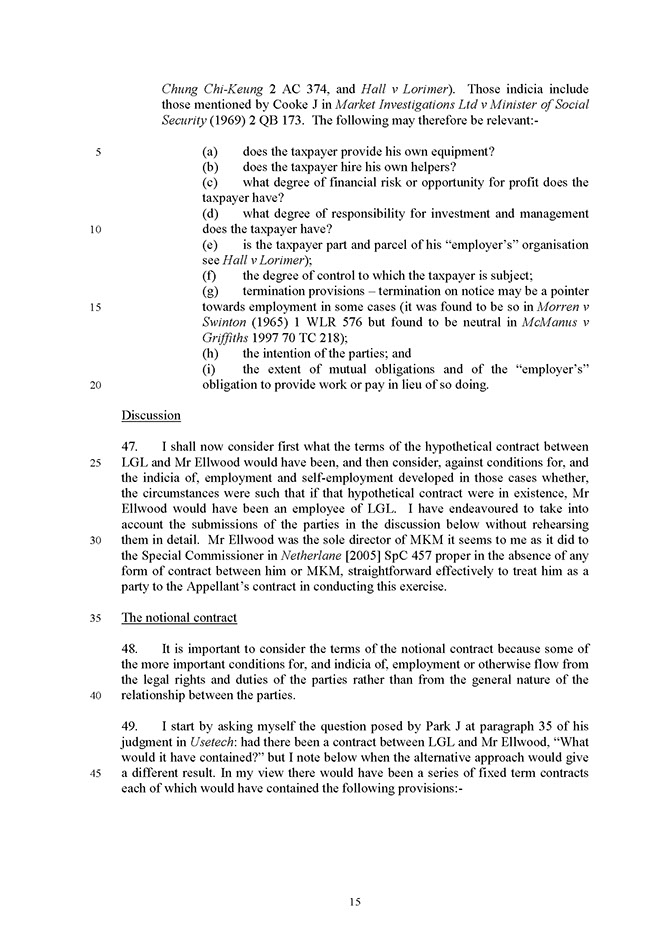
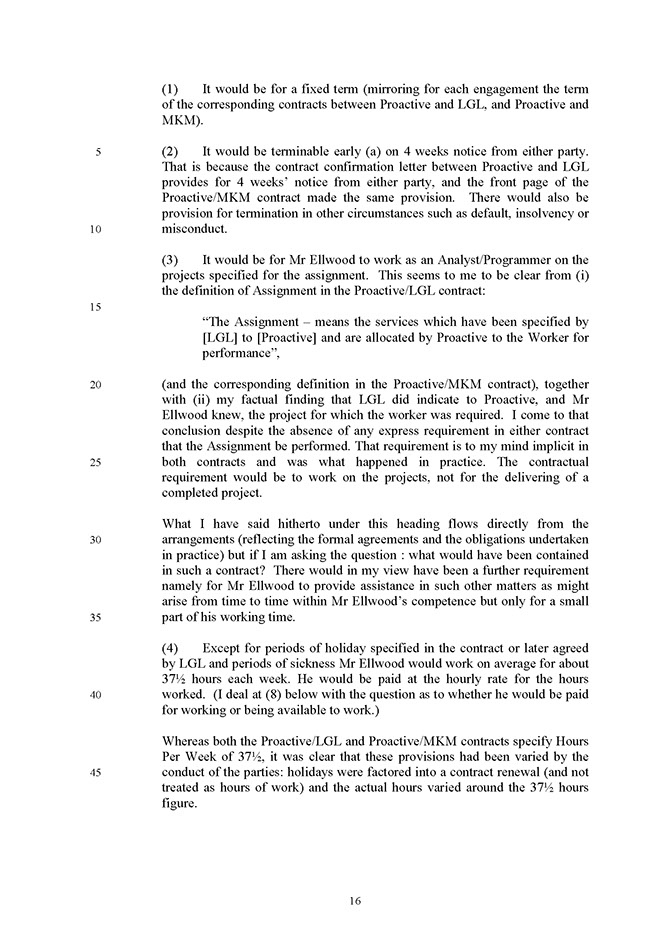
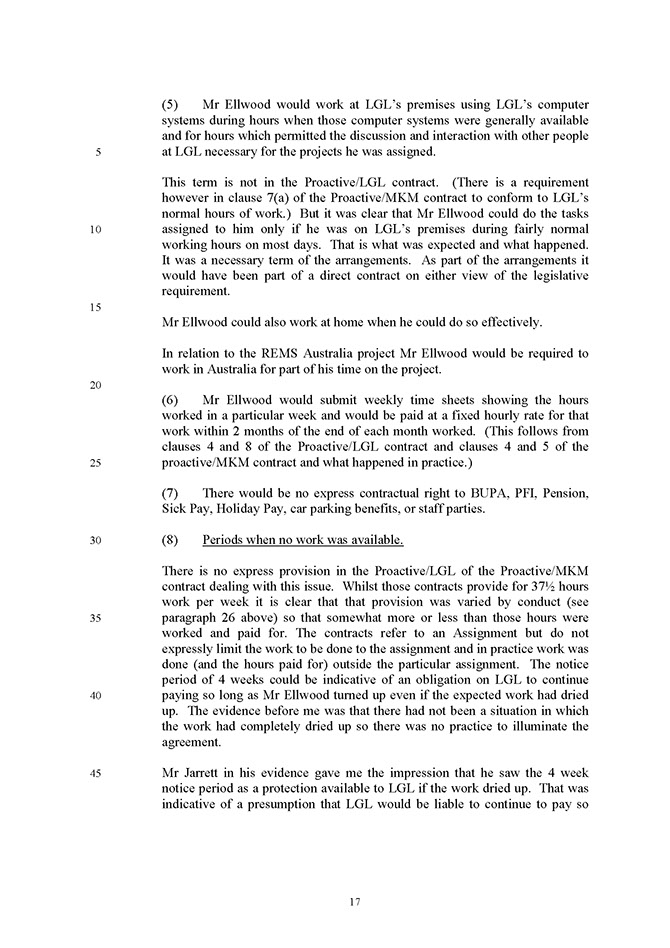
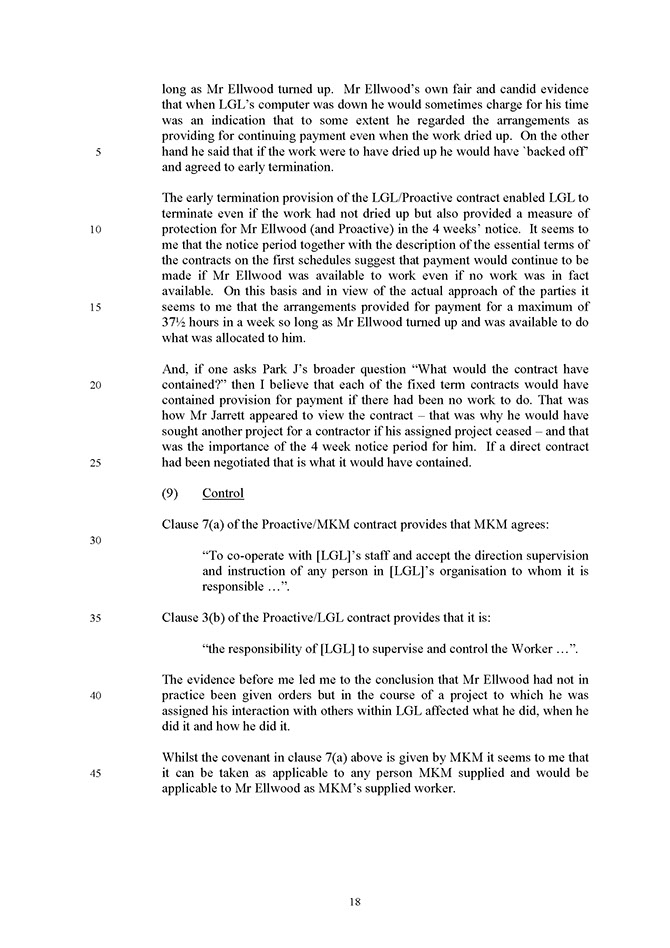
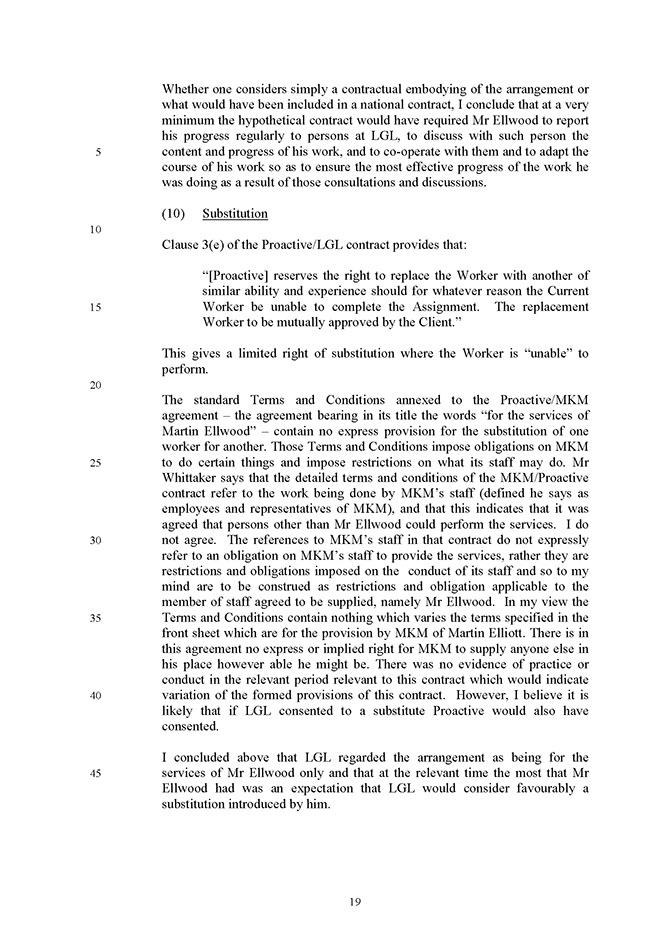
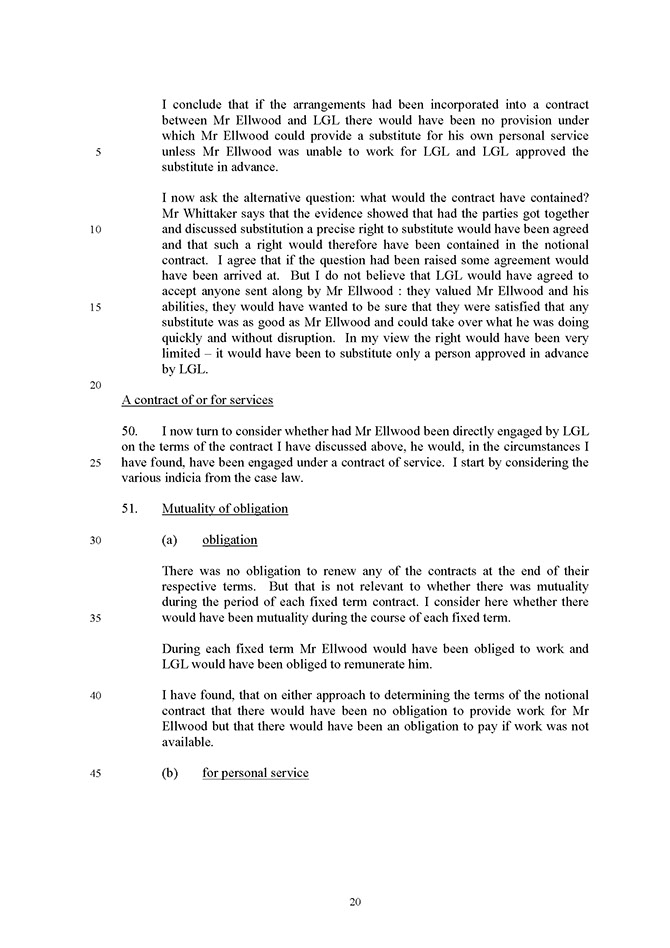
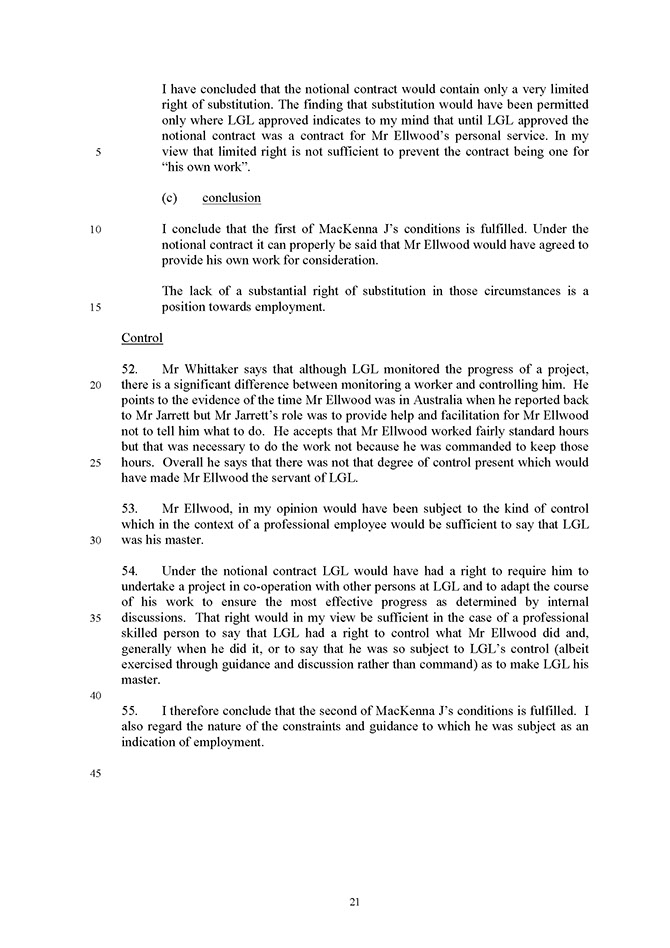
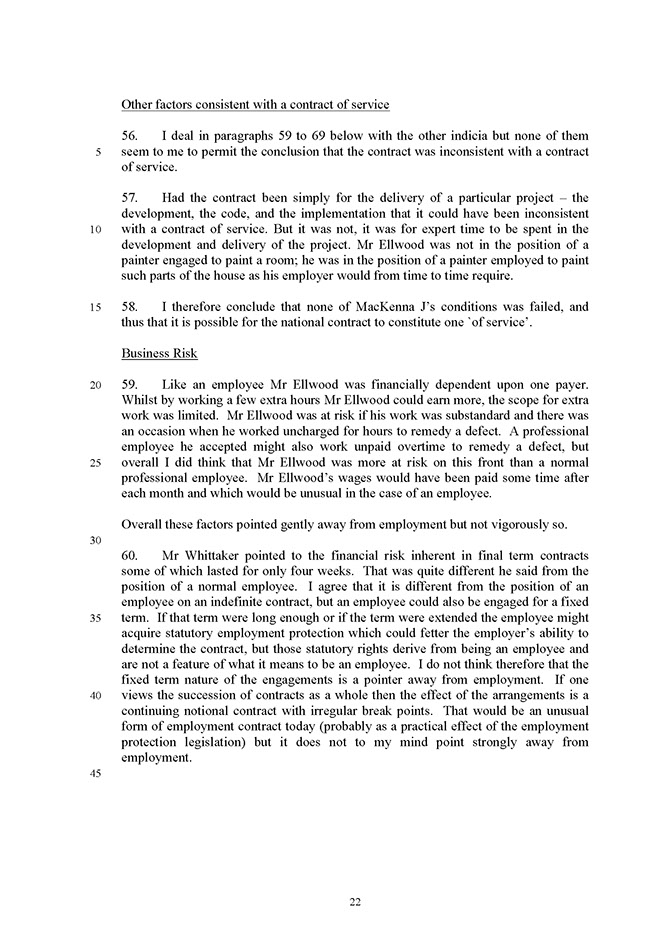
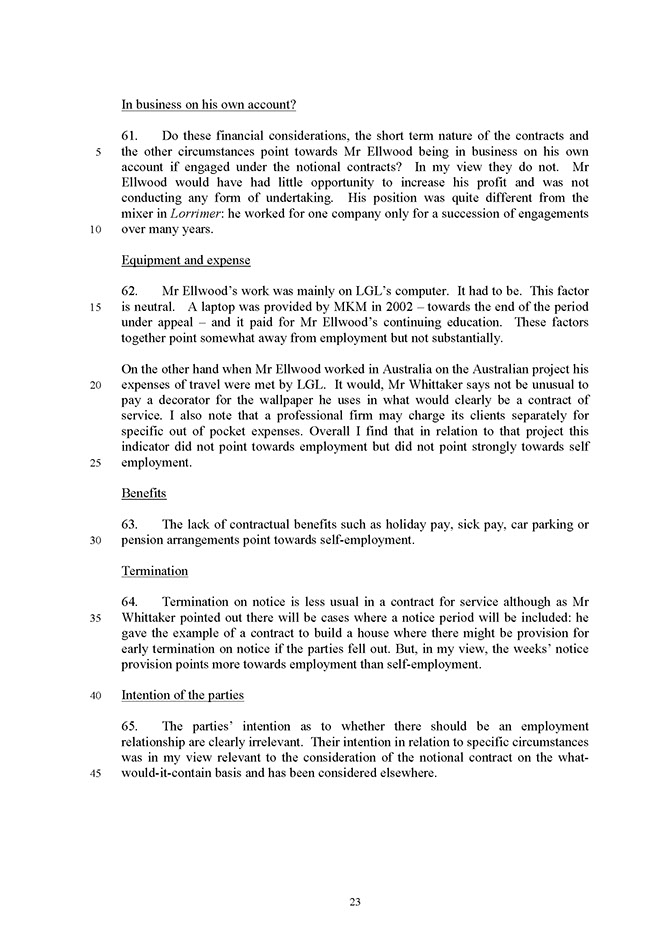
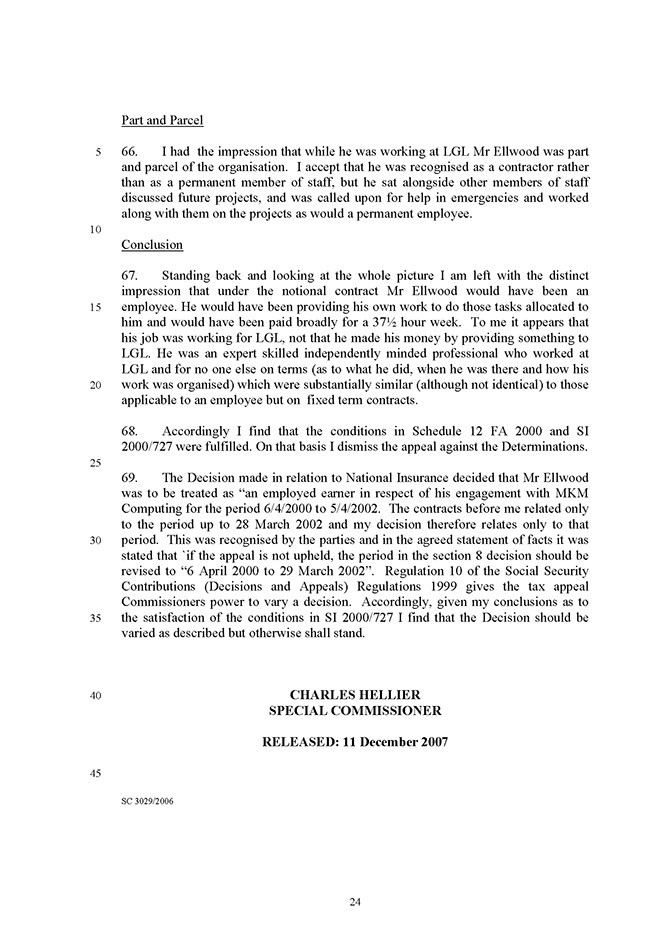

Netherlane v York 2005 SpC - IR35 inside
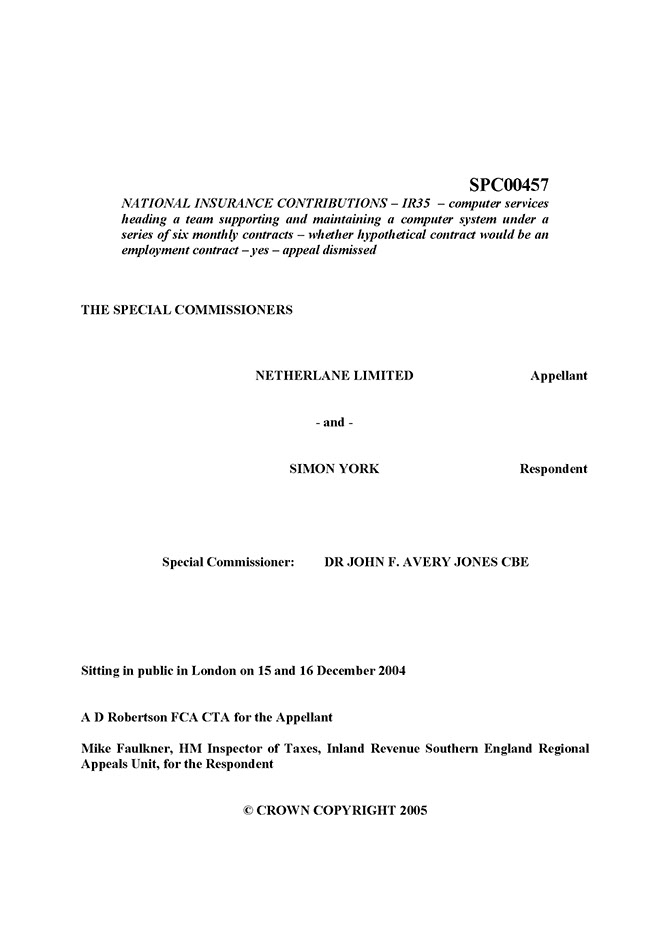
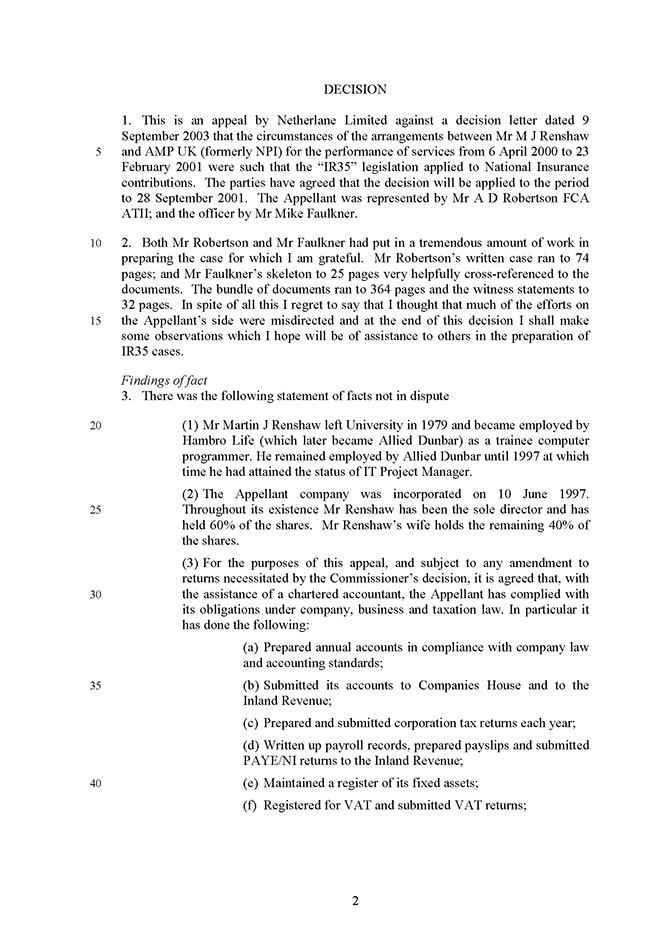
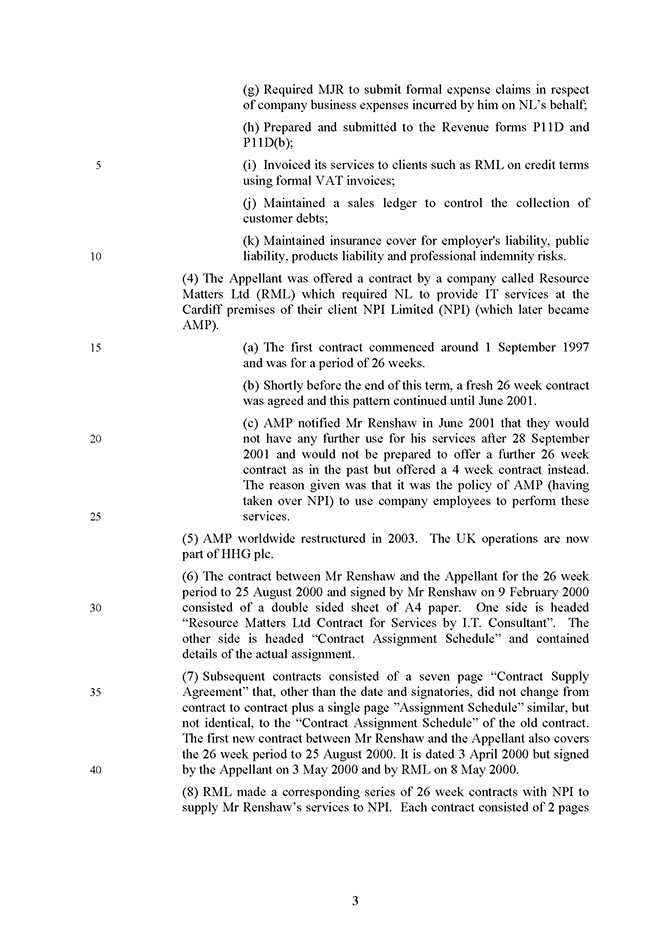
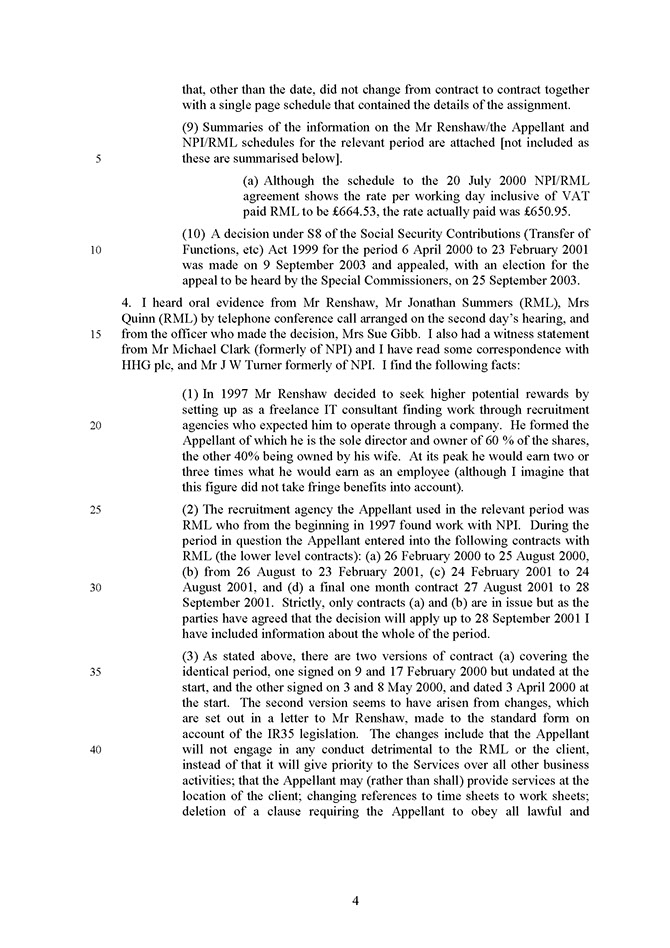
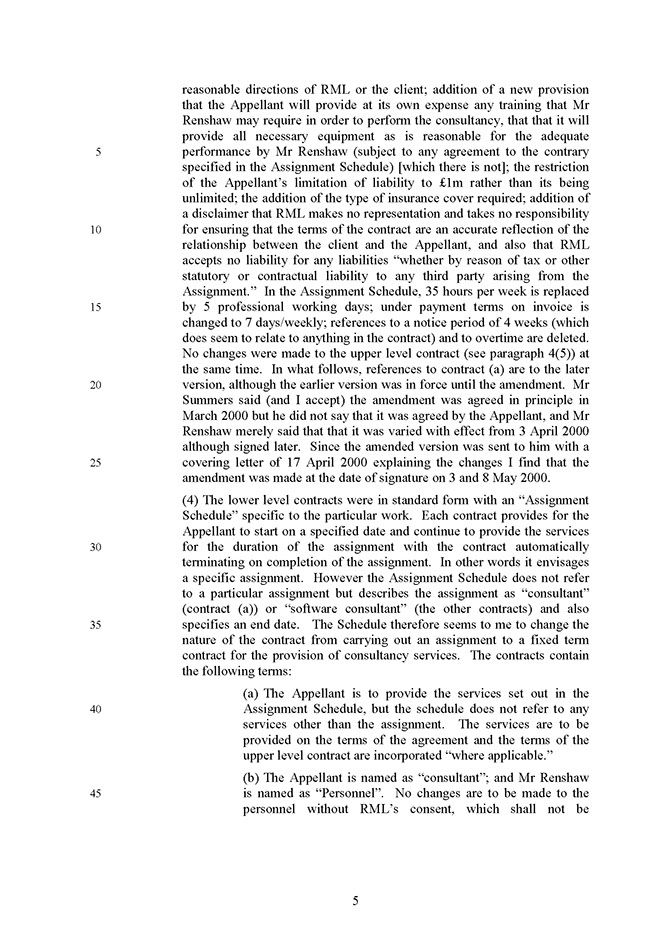
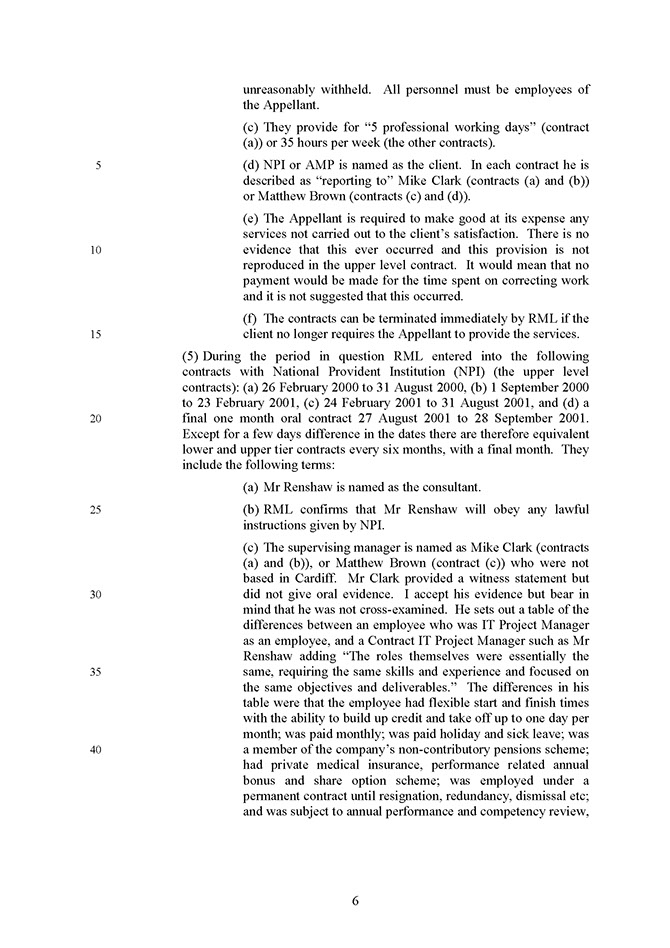
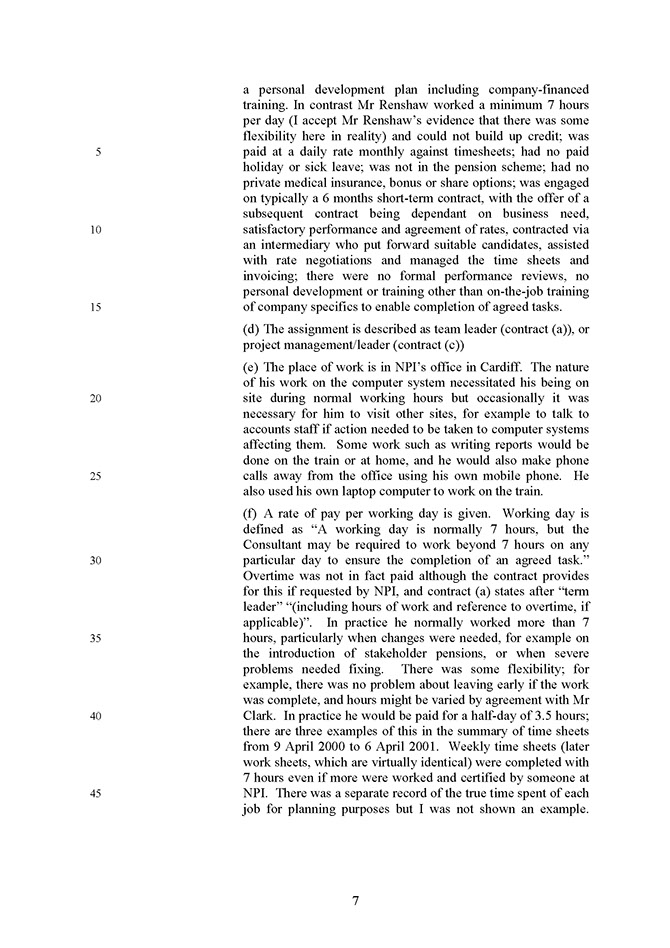
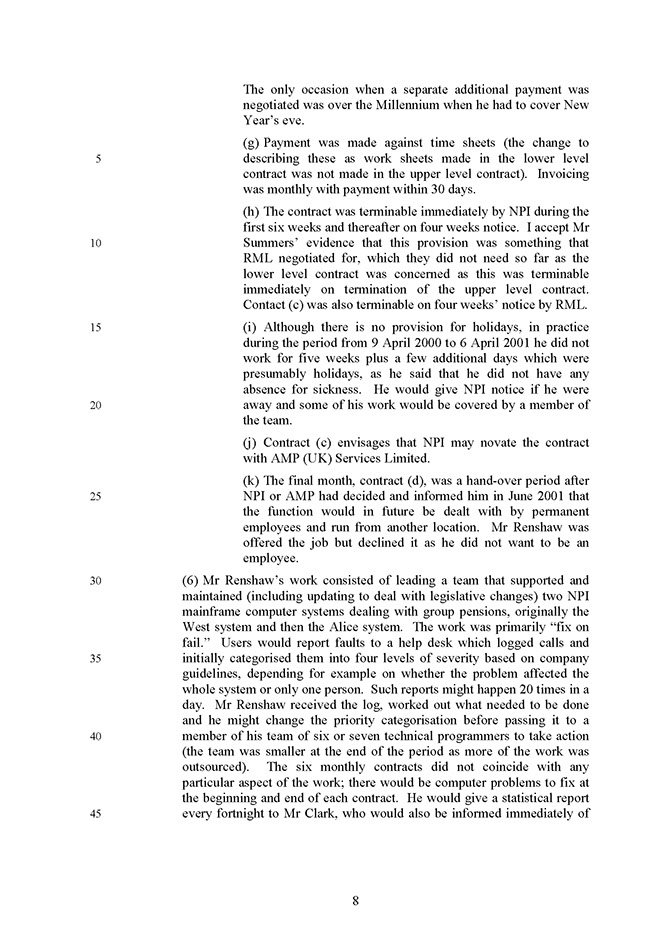
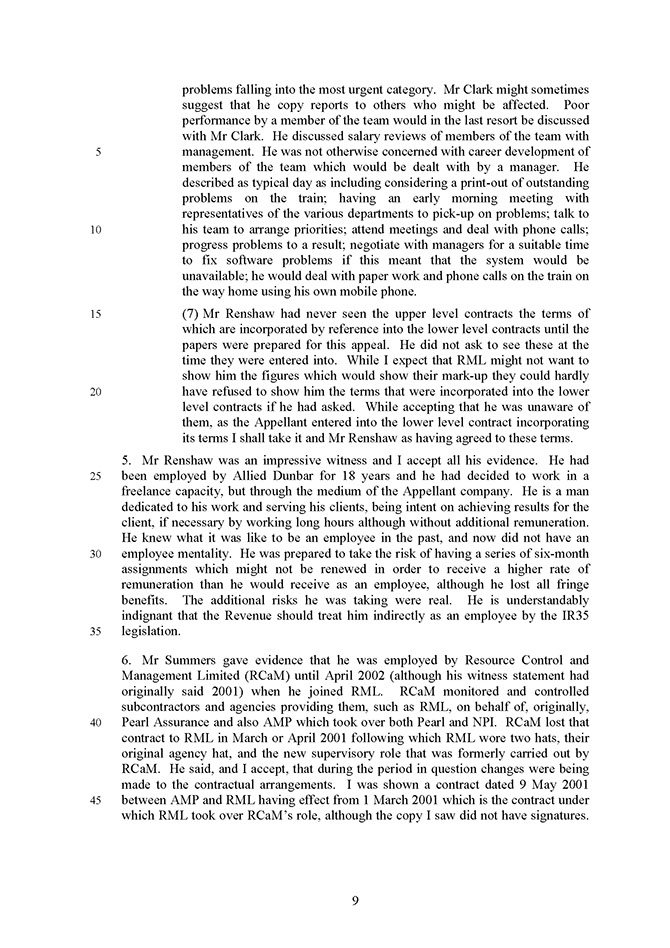
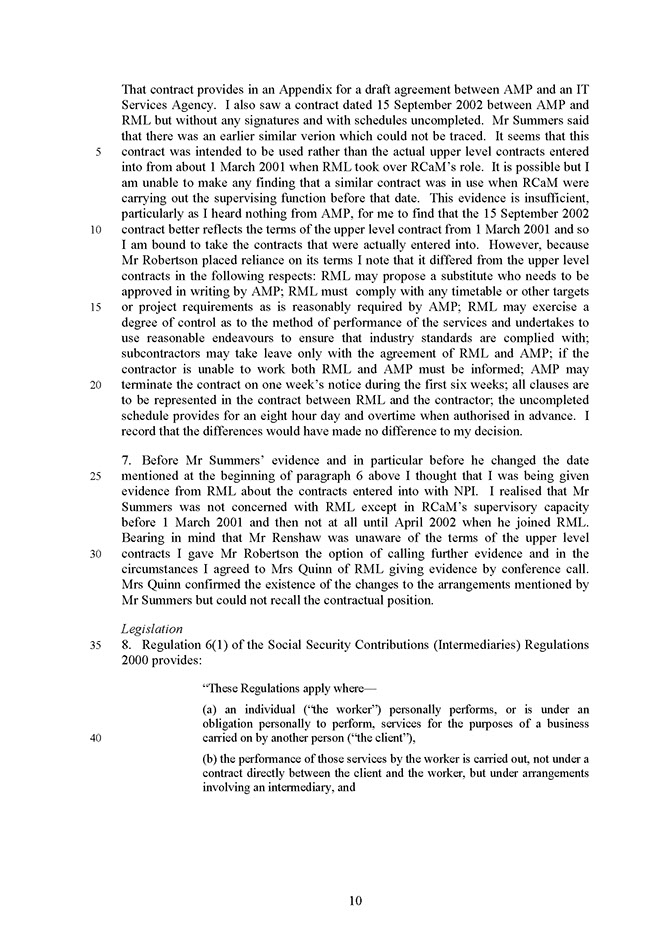
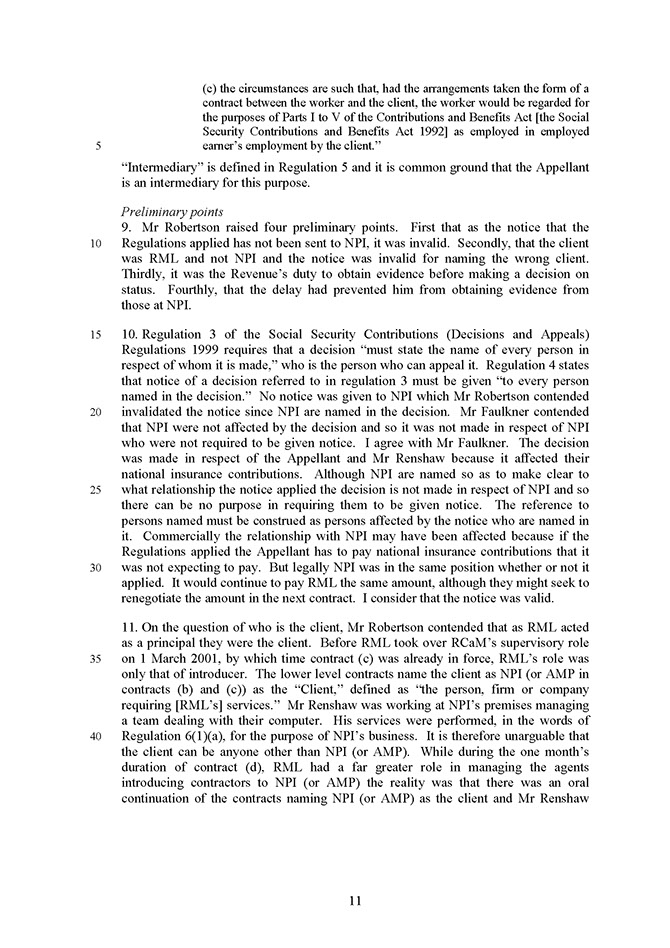
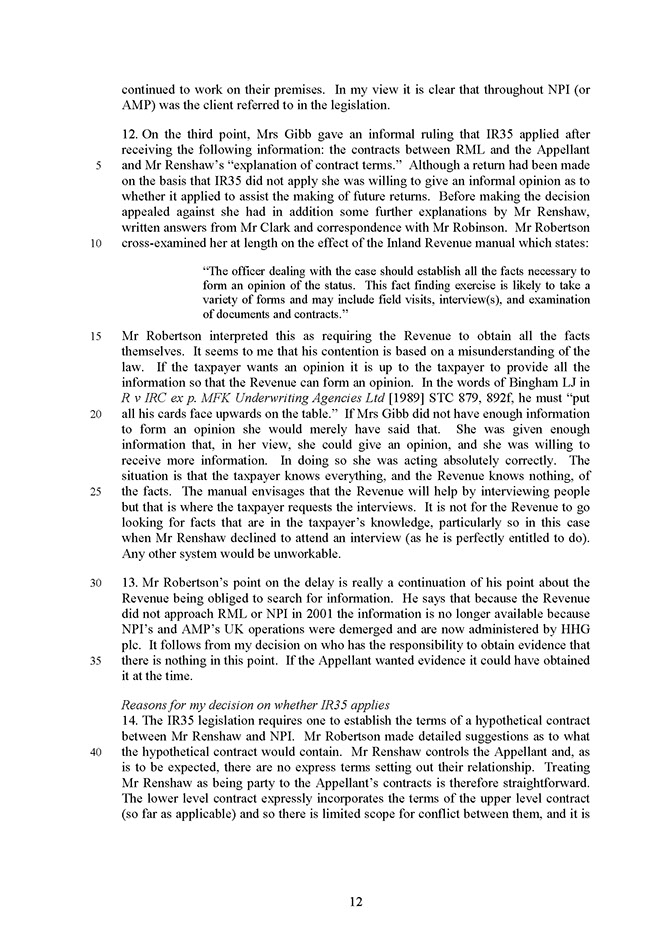
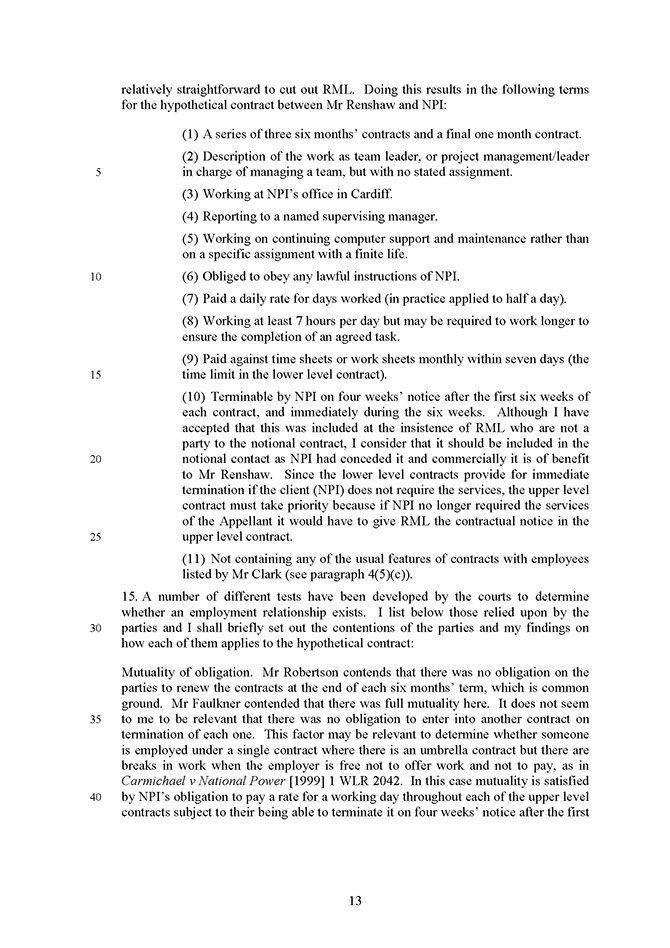
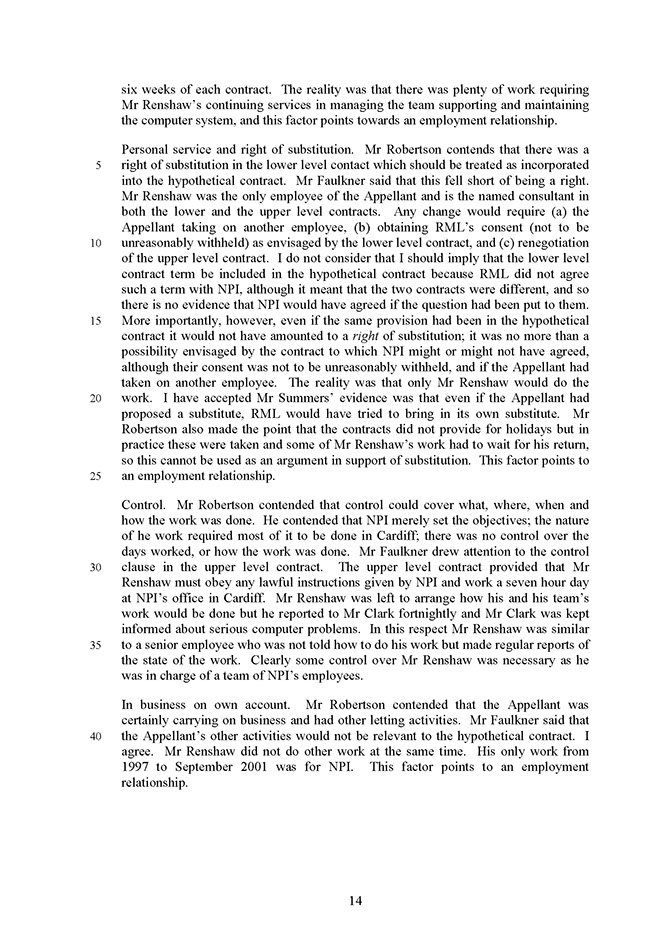
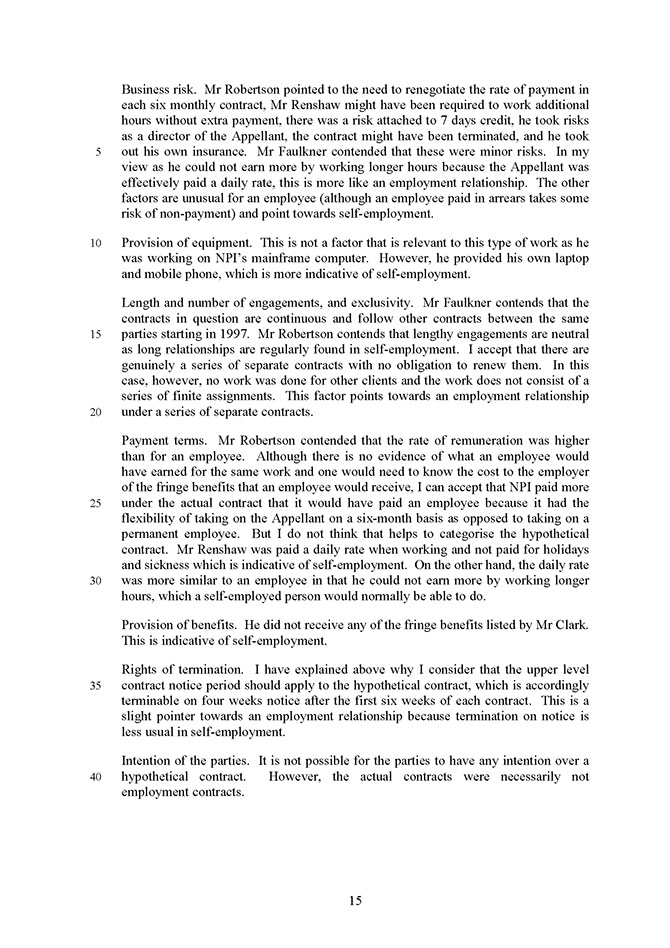
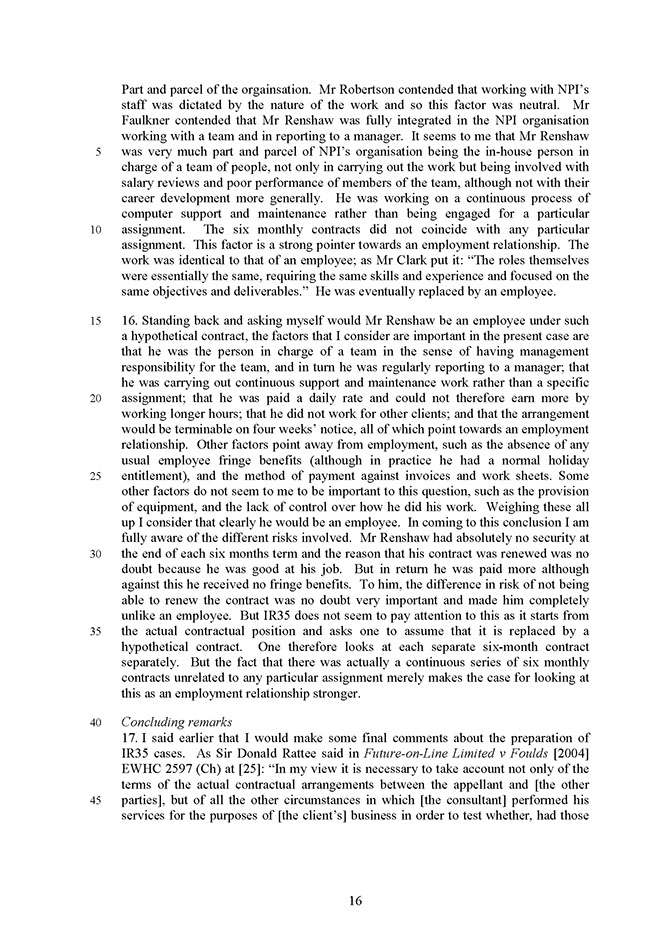
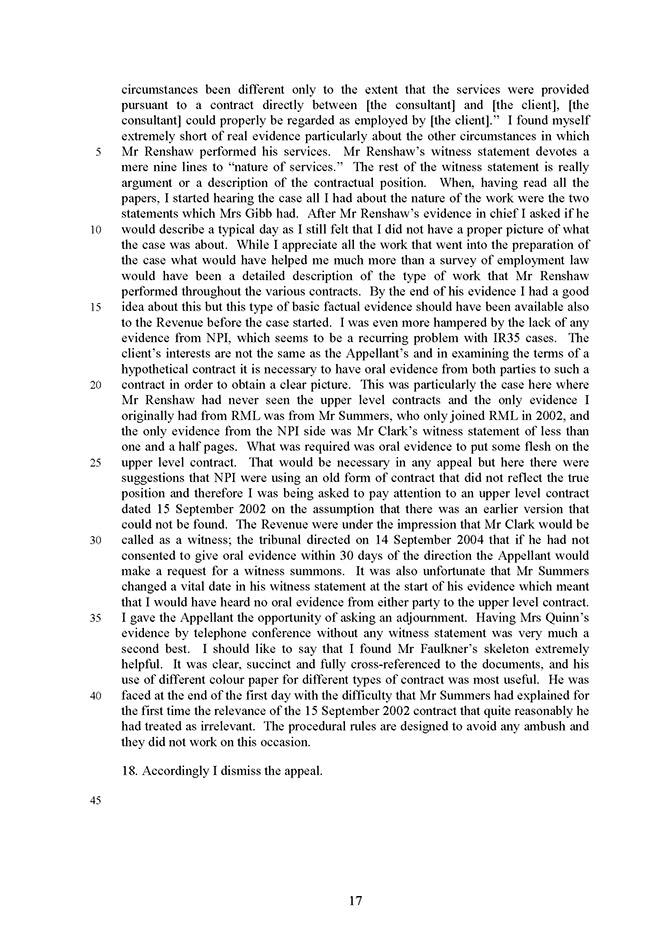
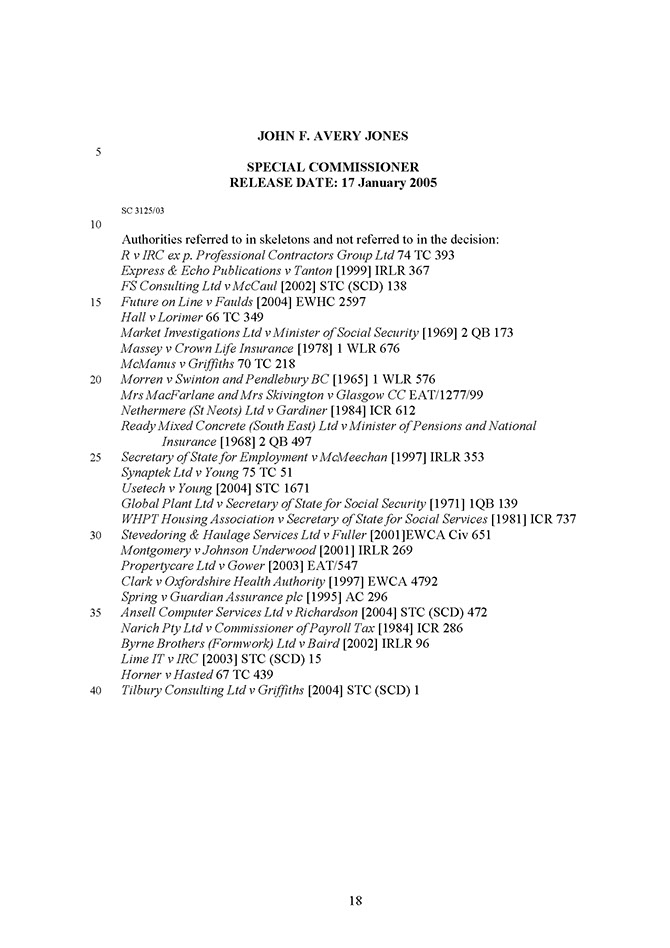
Future On-line v HMIT 2004 ChD - IR35 inside
Future Online Ltd v Foulds (2005)
Mr Roberts was an IT consultant and director of Future Online Ltd. Future Online provided its services to EDS via a contract with Elan Computing Ltd, the agency.
Having lost his appeal at the Special Commissioners, Mr Roberts took his case to the High Court and made two lines of attack on the Commissioners' decision. Firstly, he submitted that it was incorrect to regard EDS as the client and that for the purposes of the legislation, Elan was Future Online's client. The court, however, held that it was clear that EDS required the services of an IT specialist and it could not be said that Mr Roberts had performed those services for the purposes of Elan's business. EDS was the only party with whom it could be said that Mr Roberts performed services for business purposes.
Secondly, it was argued that the Special Commissioner had wrongly accepted that it was the right of control of the worker that was significant rather than whether control was actually exercised. The judge found that the Special Commissioner had correctly taken account not only of the terms of the contractual arrangements but of all the other circumstances in which Mr Roberts performed the services for EDS and found the criticism over the matter of control to be unfounded.
Mr Roberts had also claimed that the Special Commissioner had placed too much emphasis on the 'part and parcel of the organisation' test and that it had been used as an overall test. The Special Commissioner had found as fact that Mr Roberts was an integral part of the EDS organisation rather than just being part of a team working on a project but the judge found that the test had only been considered as one of the features pointing to a contract of service.
Usetech v HMIT 2004 ChD - IR35 inside
Usetech Ltd v Young (2004)
William Hood was a computer software specialist whose company, Usetech Ltd, provided services to ABB Ltd via a technical recruitment agency, NES International Ltd.
Mr Hood had argued that IR35 did not apply because a right of substitution existed in his company's contract with the agency and there was no obligation on the end client to provide him with work.
Unfortunately, the lower level contact was a standard contract that the agency used when engaging individuals through one man service companies. Whilst it contained a substitution clause this was not reflected in the upper level contract between NES and ABB. The Special Commissioner had described the right of substitution as being largely illusory and that the hypothetical contract would not have contained a substitution provision. The High Court judge went a stage further by saying that if Mr Hood had raised the substitution issue in negotiation with ABB then the end client would not have entertained this.
The minimum that ABB had to provide and pay for under its contract with the agency was 37.5 hours. There was also a termination clause that required 7 days notice by either party. The judge concluded that these terms would have also been a feature of the hypothetical contract and therefore the mutuality requirement would be satisfied.
Ansell v HMIT 2004 SpC - IR35 outside
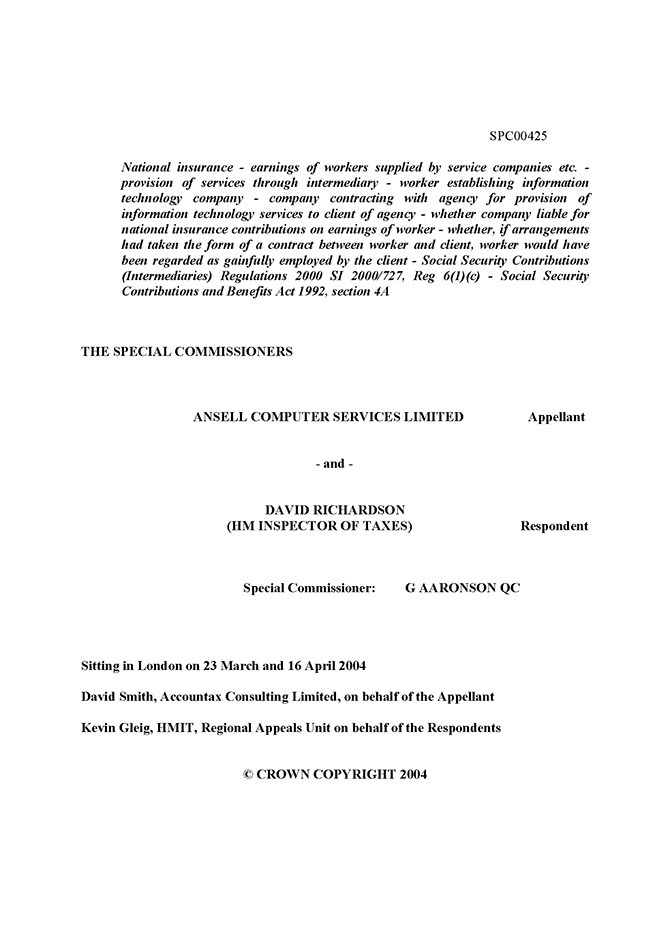
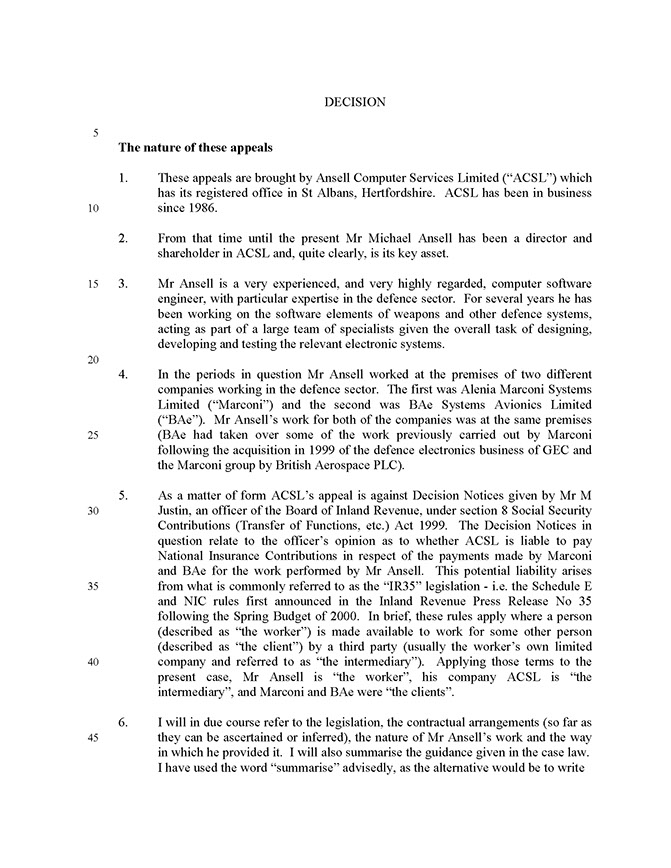
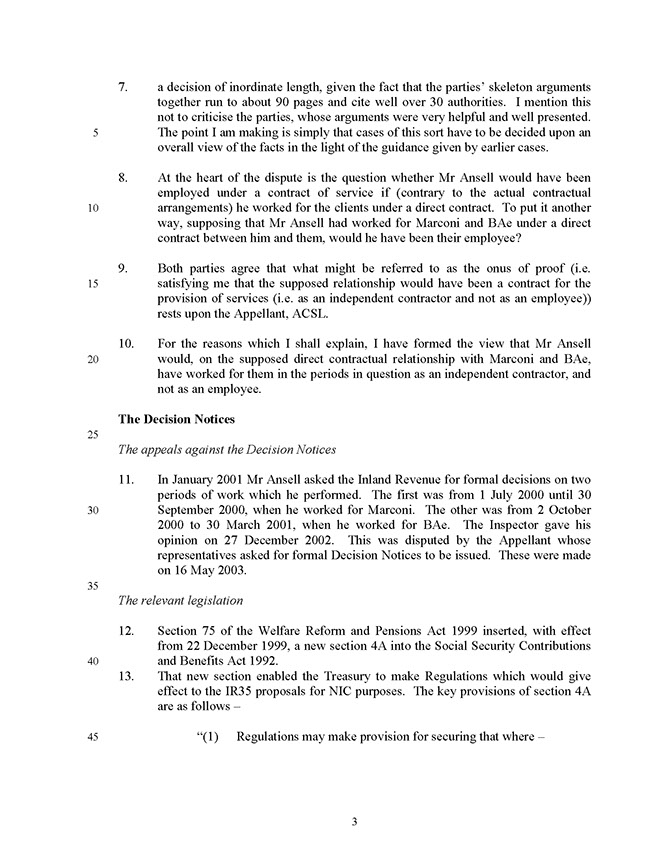
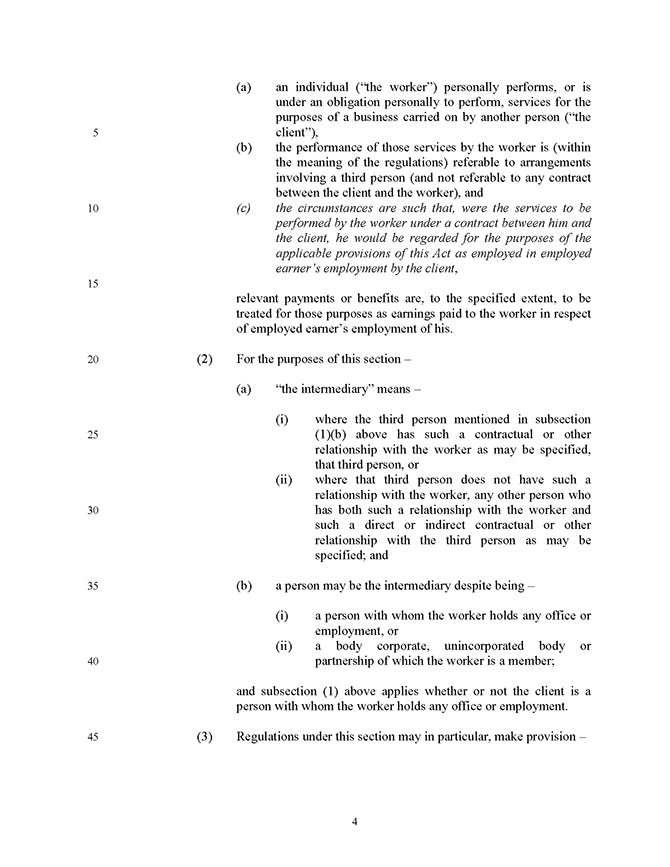
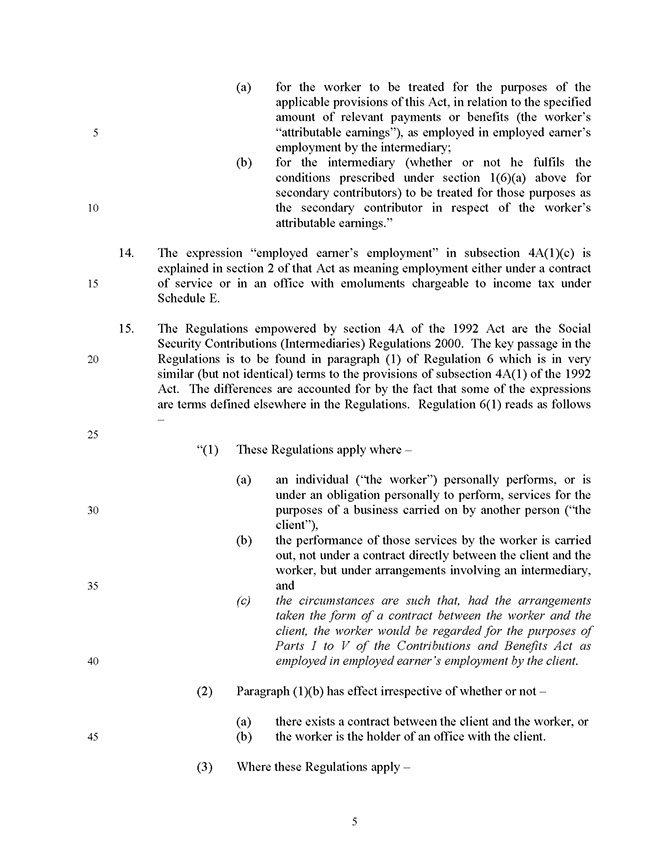
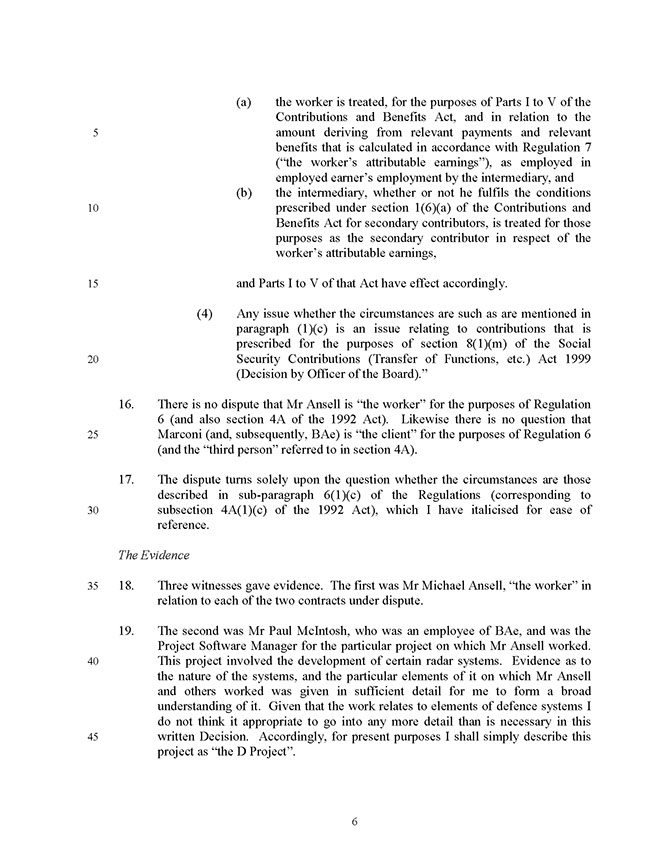
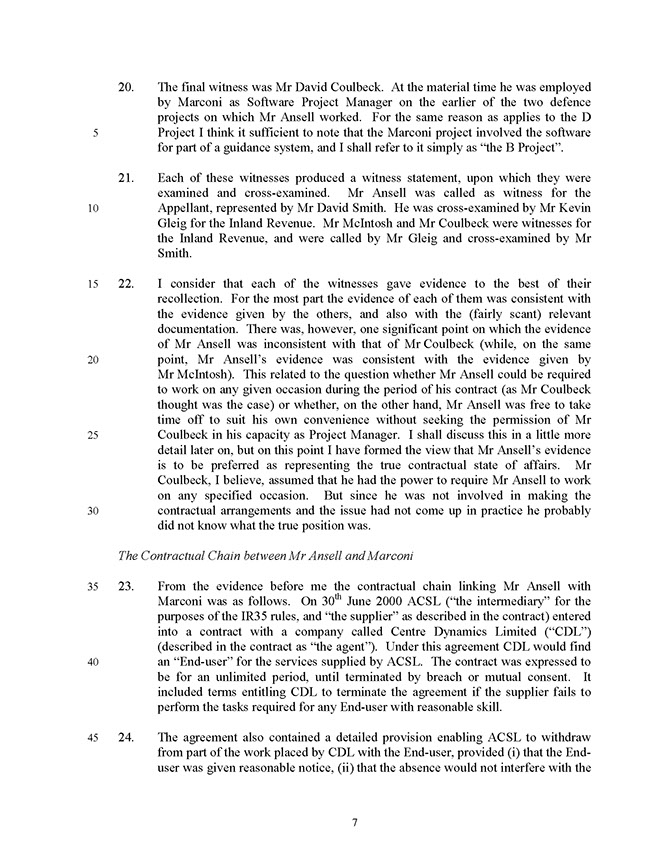
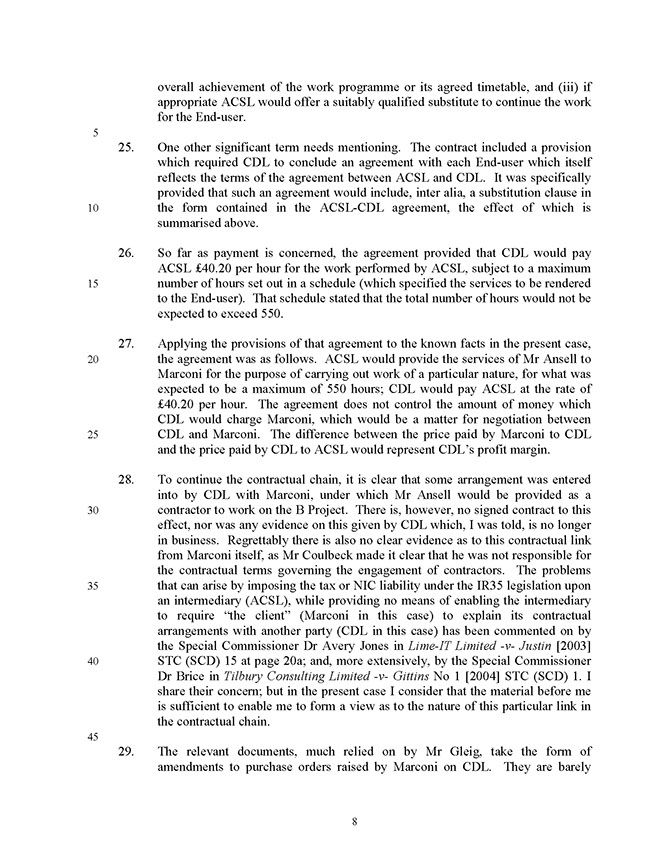
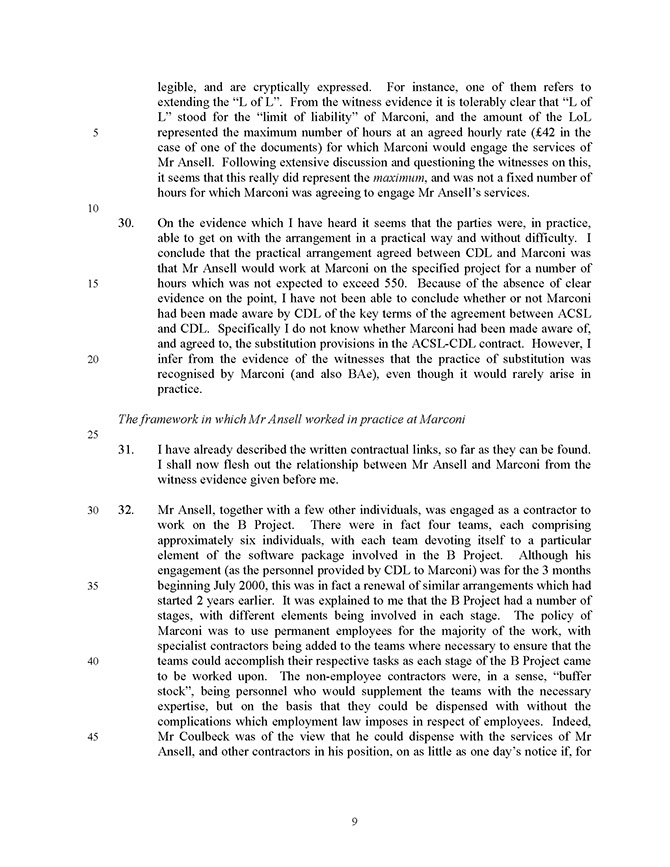
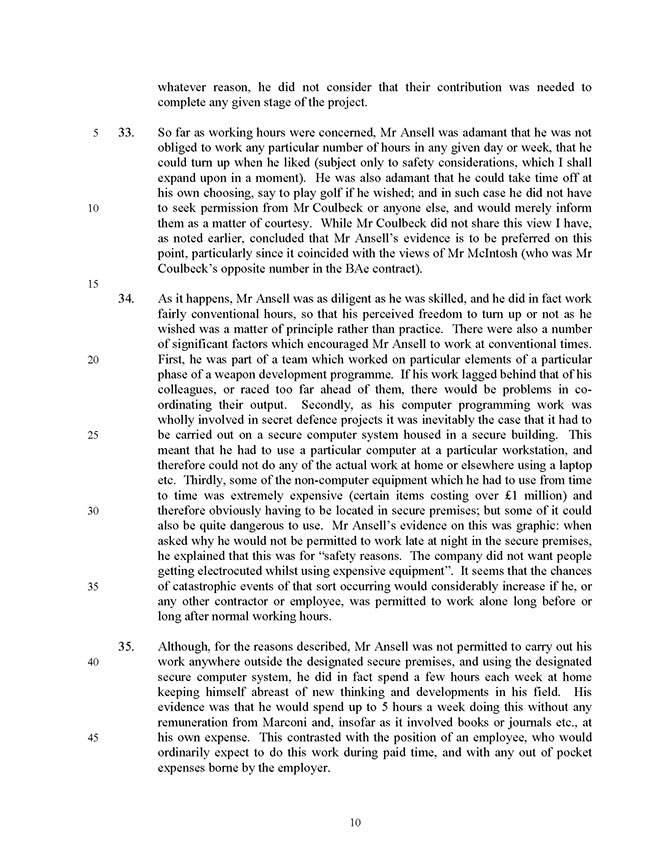
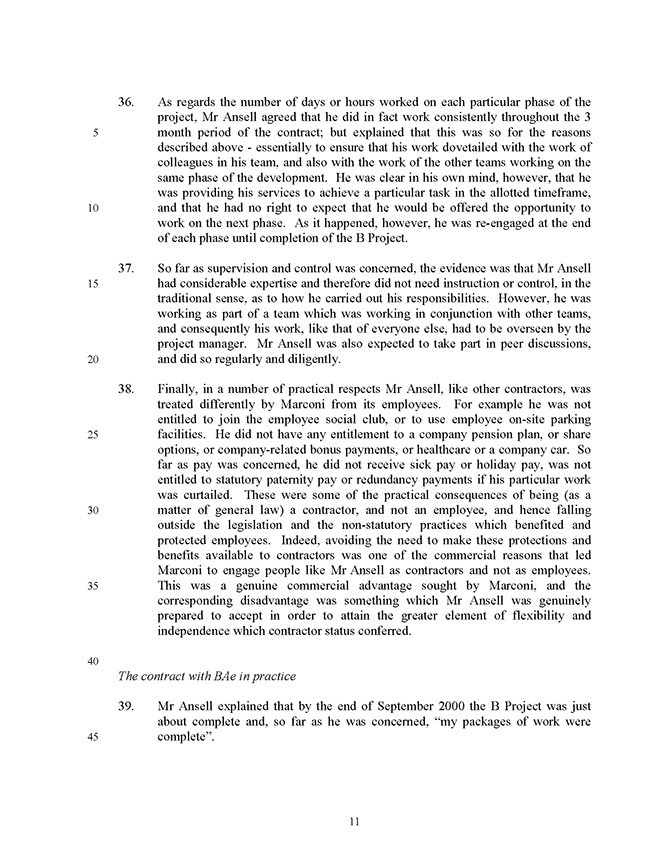
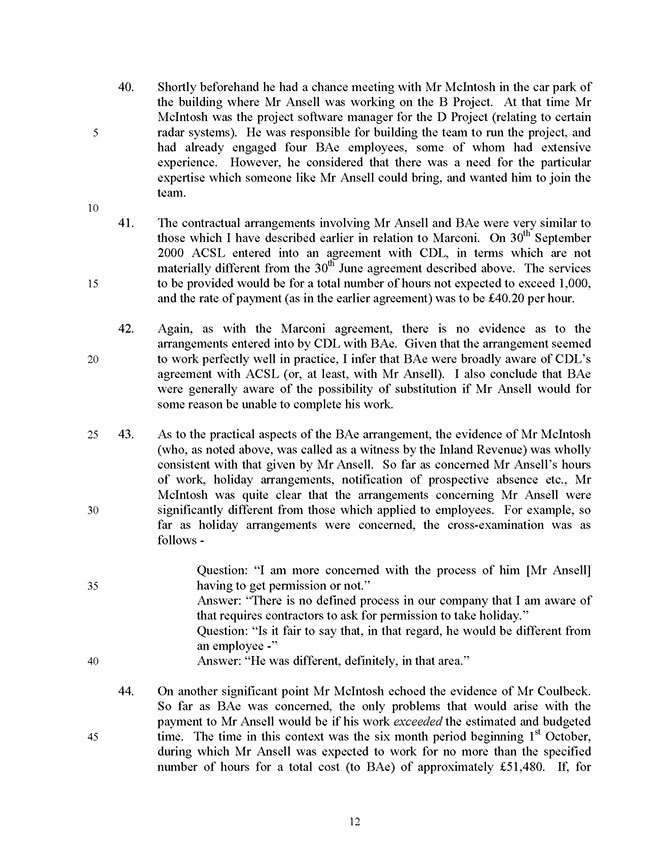
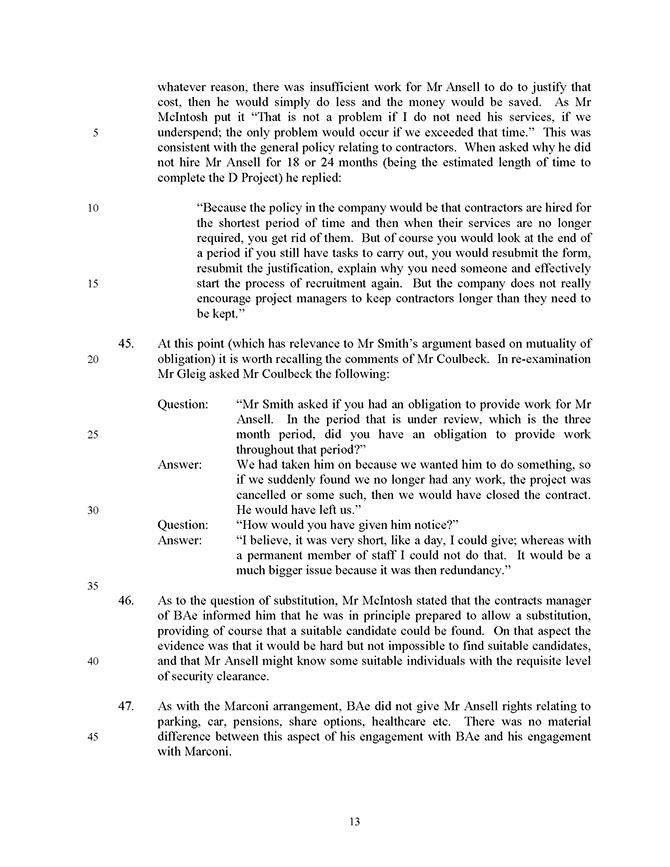
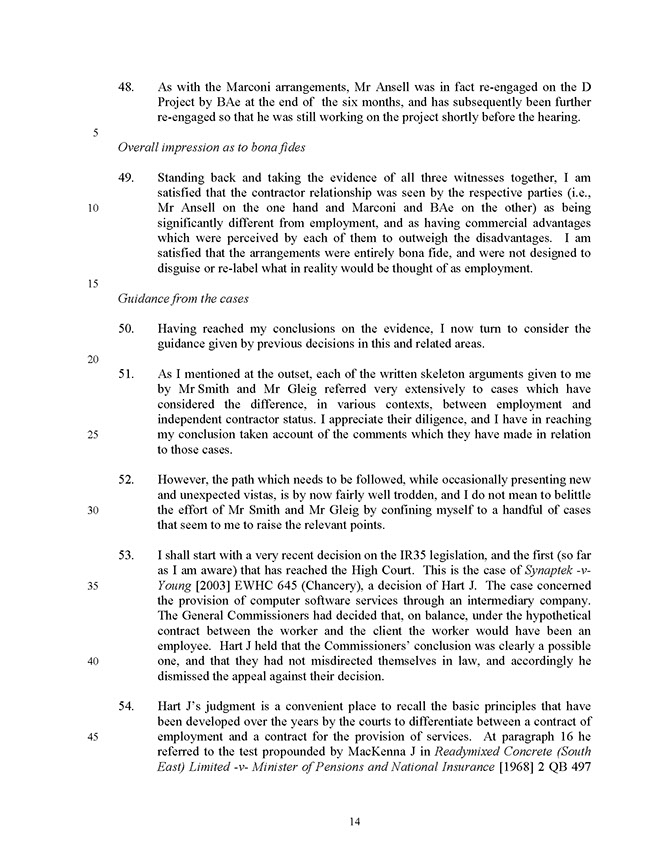
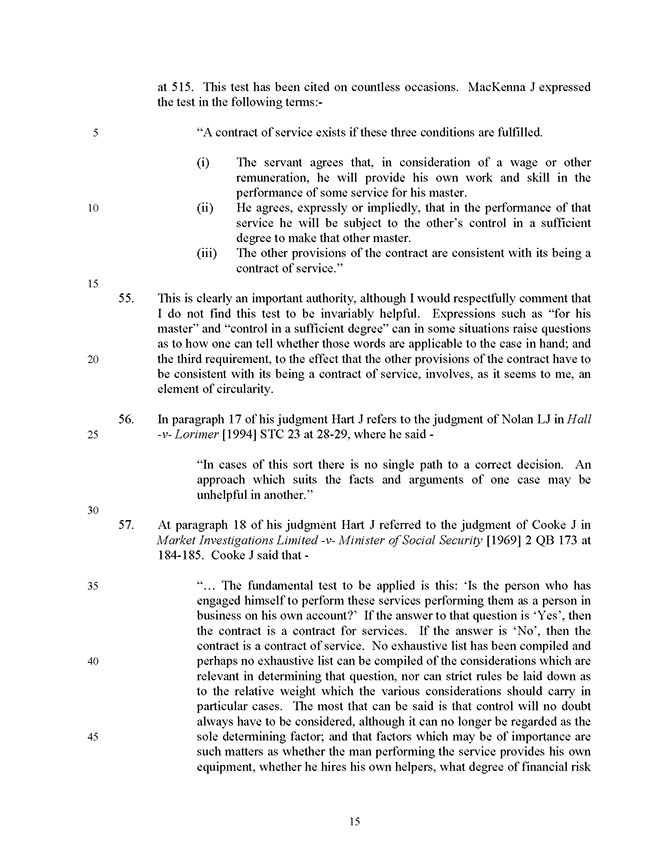
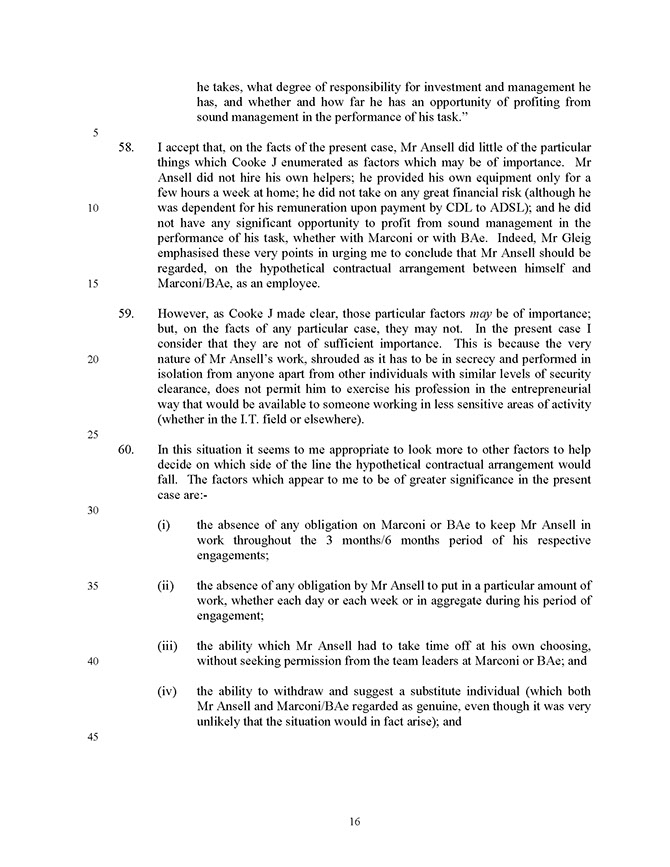
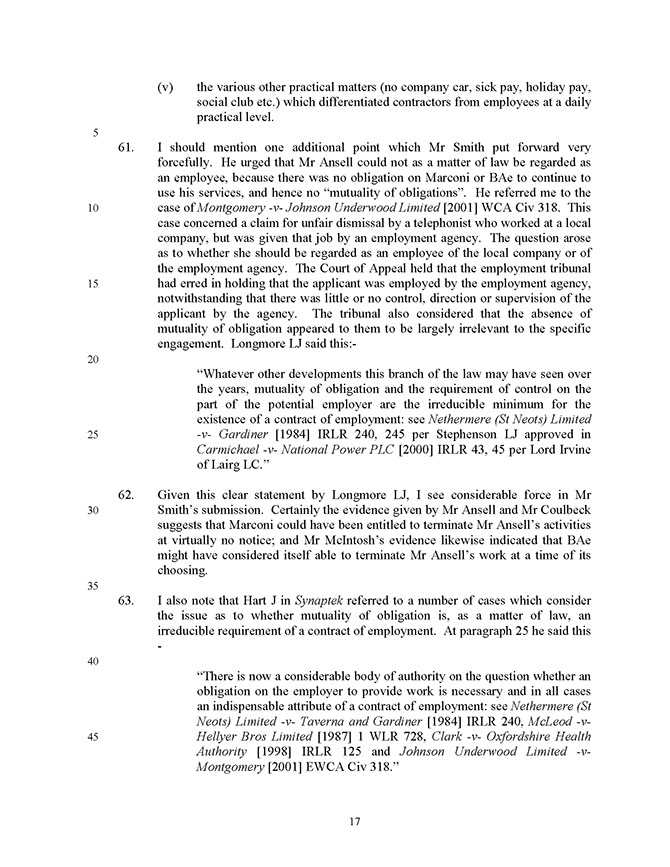
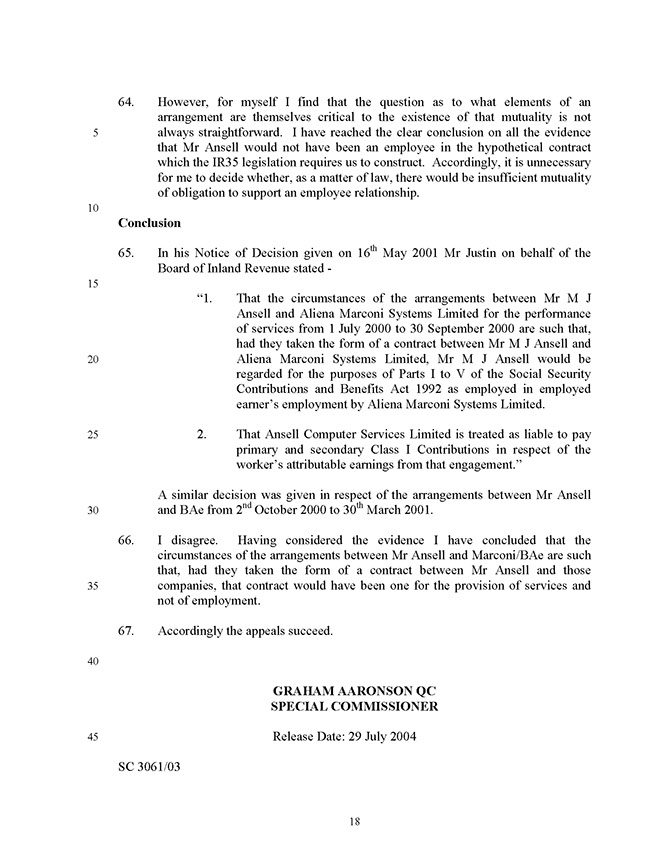
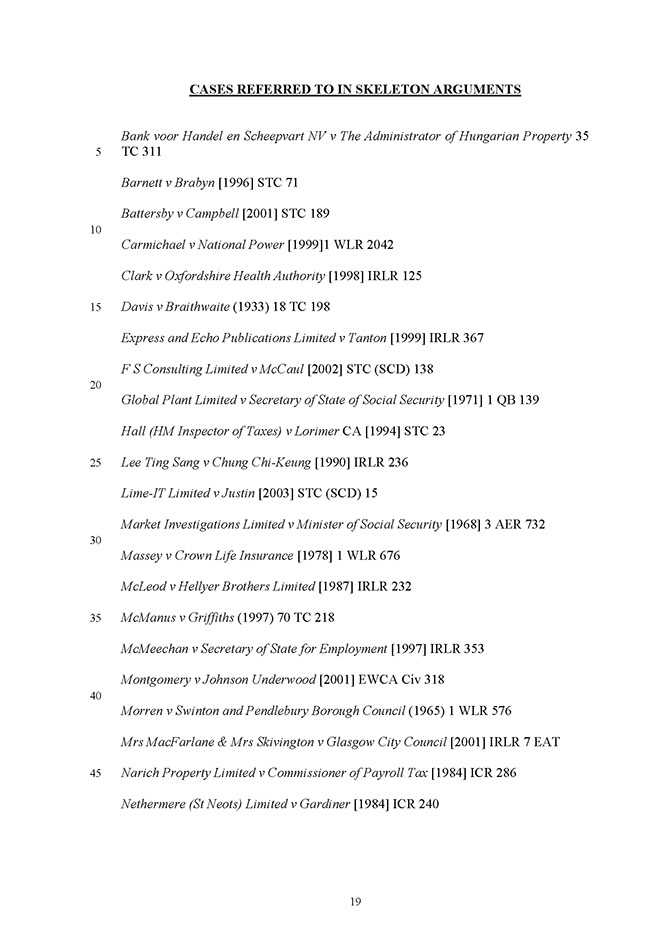
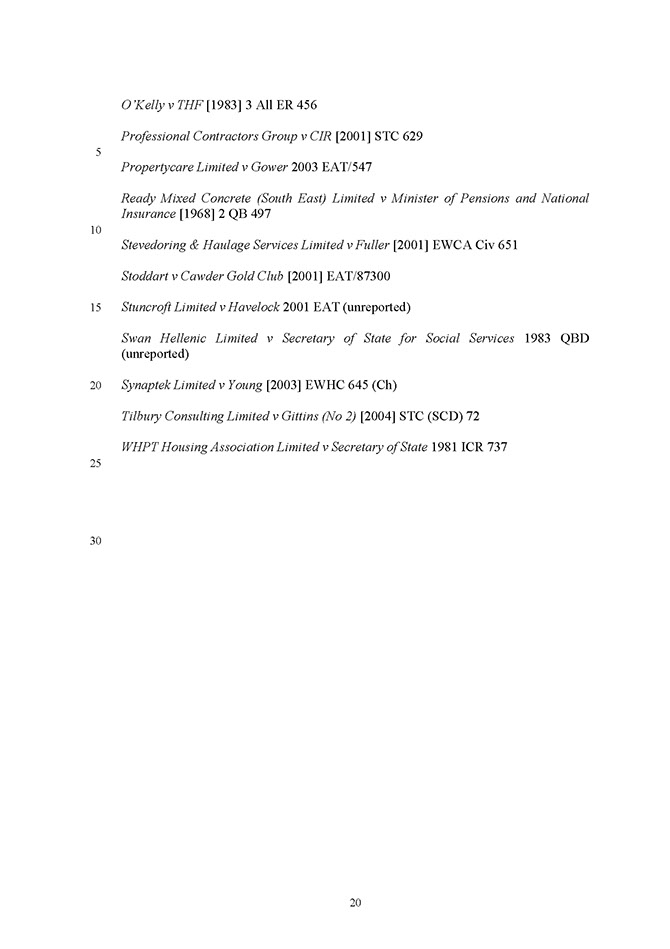
Lime IT v CIR 2002 SpC - IR35 outside
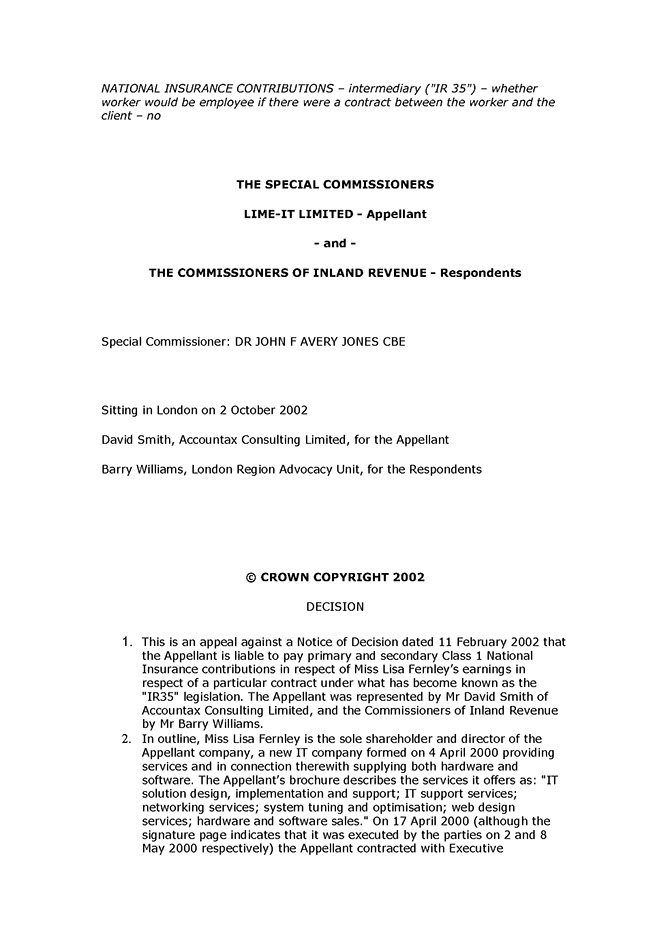
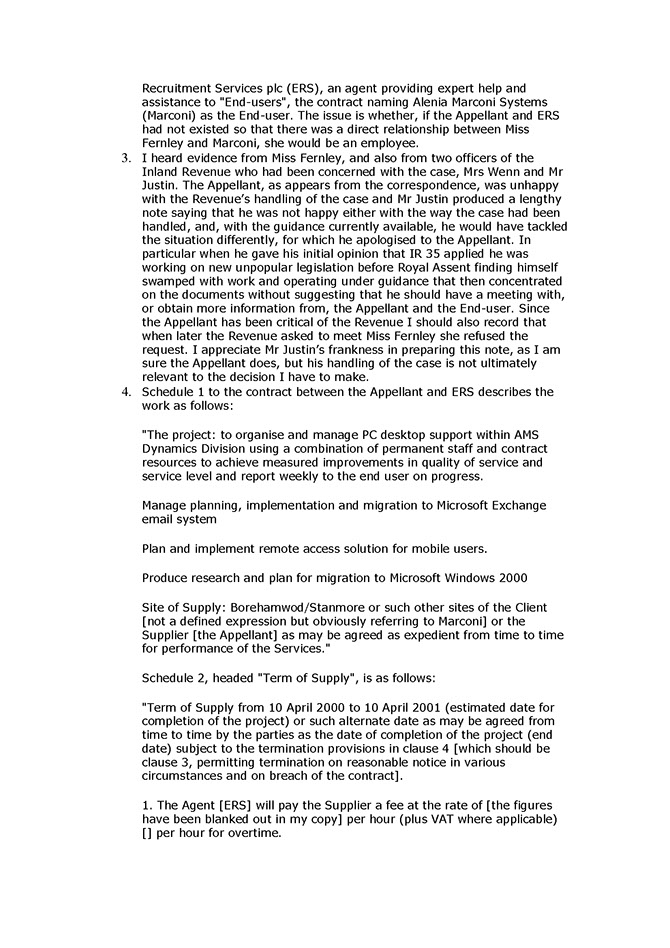
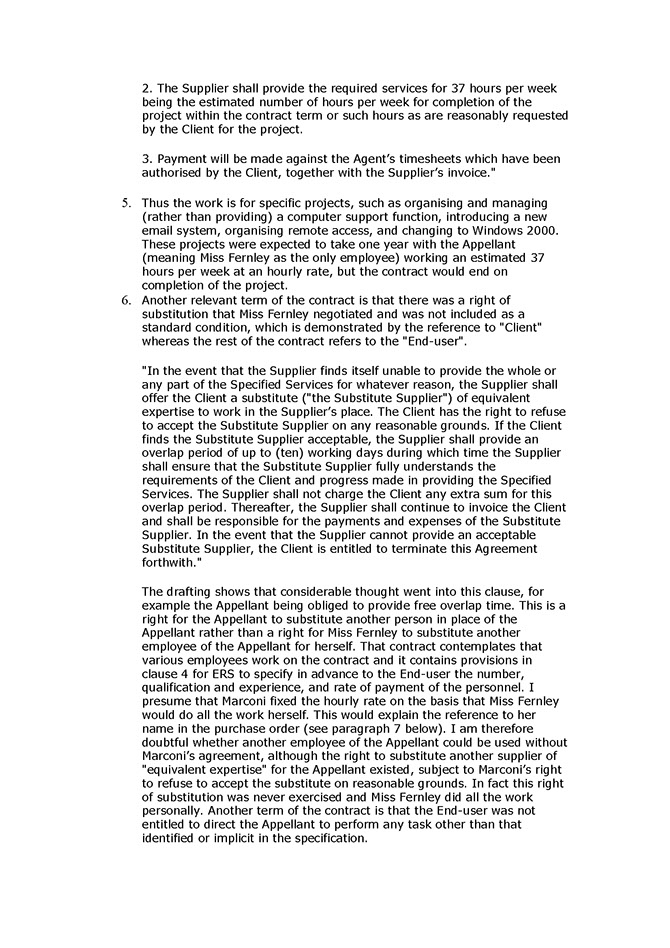
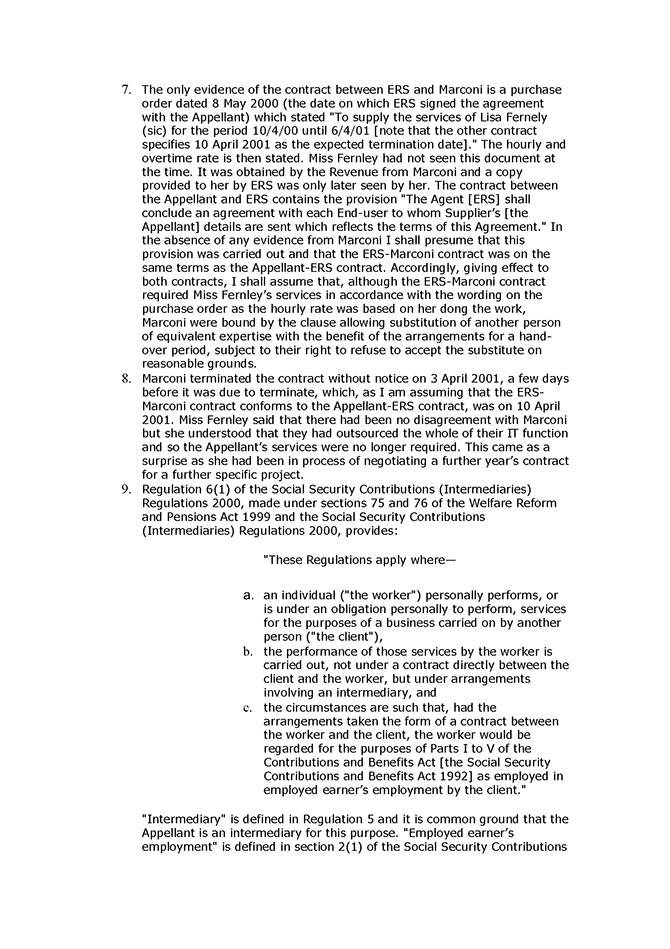
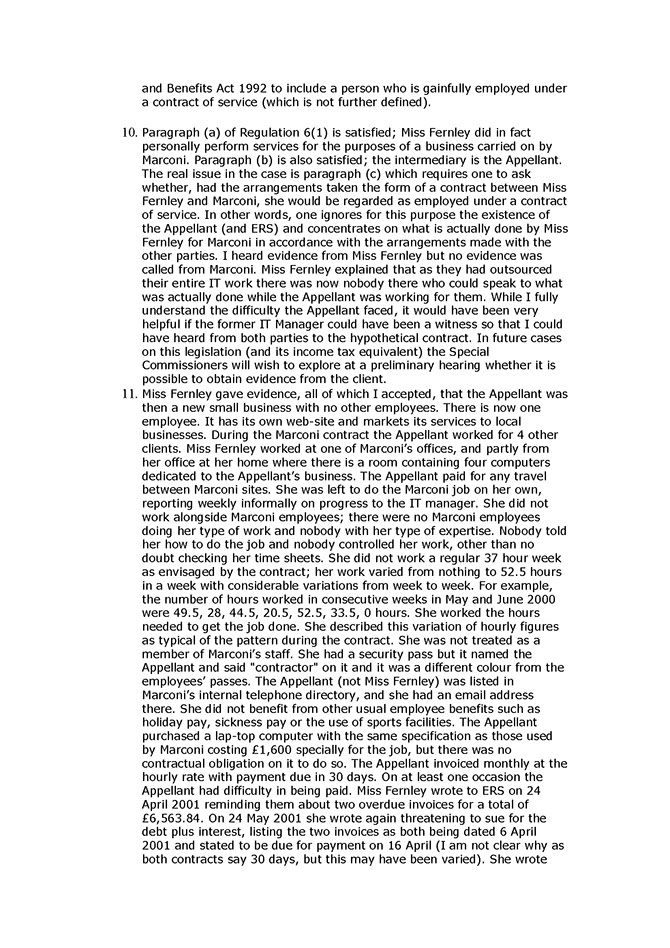
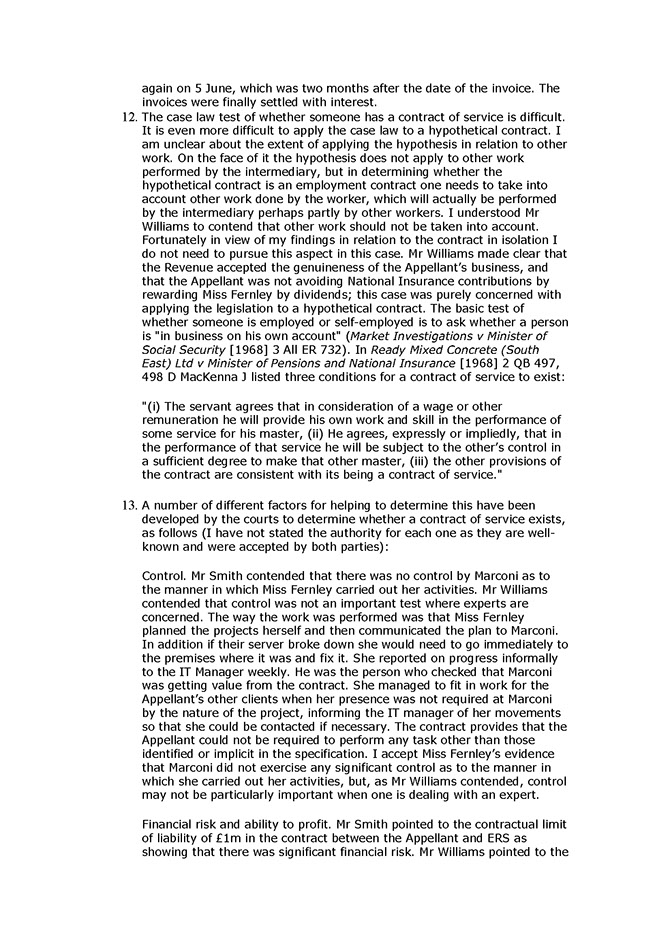
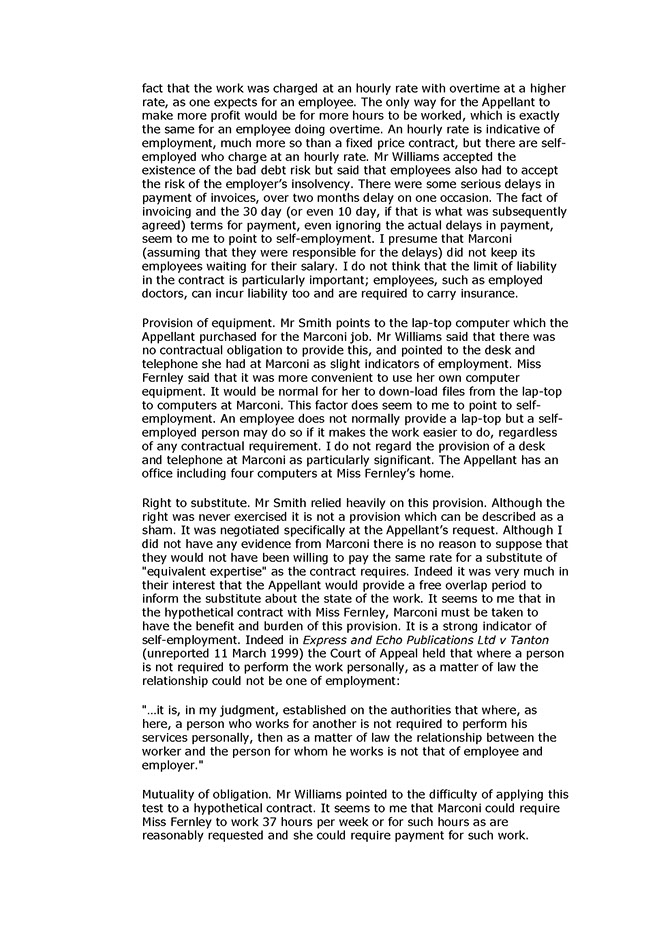
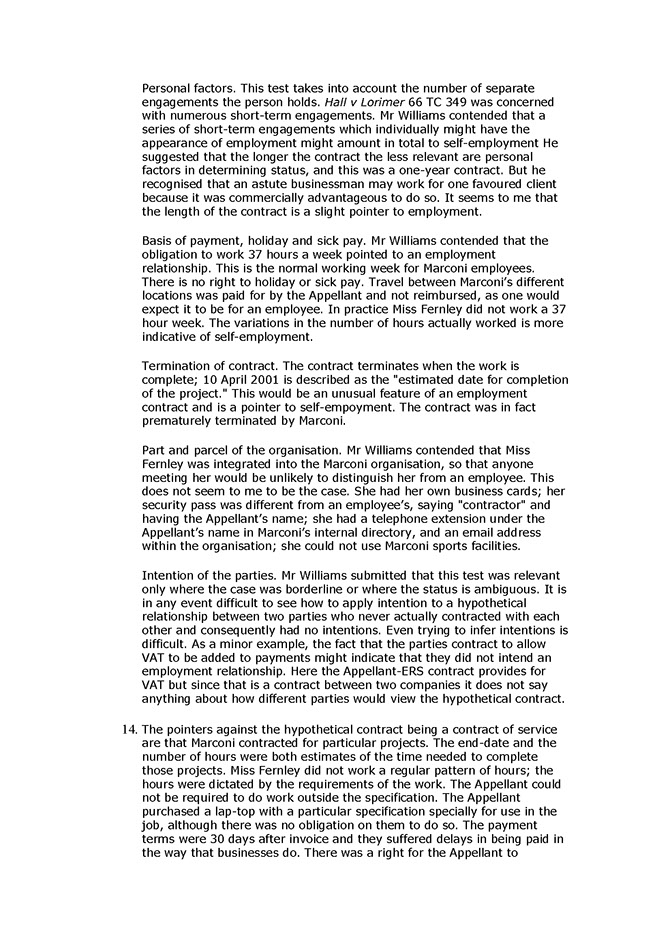
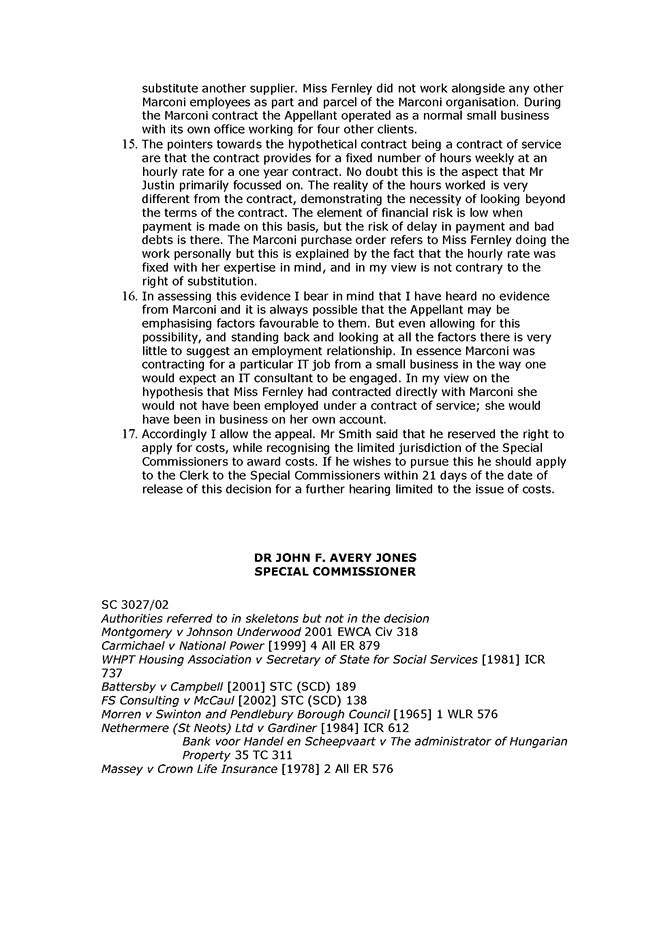
Synaptek v HMIT 2003 ChD - IR35 inside
Synaptek Ltd v Young (2003)
Gordon Stutchbury was a consultant in software engineering and through his company, Synaptek Ltd, provided services to EDS via an agency, NESCO. EDS was itself providing services to the Benefits Agency.
The judge summarised the factors in the case that pointed towards self-employment but these were outweighed by the pointers towards a contract of service:
- Minimum 37.5 hours per week required which was broadly equivalent to a “normal working week”.
- The only risk borne by the contractor was the risk of insolvency of the agency or end client, despite there being other risk factors such as the Agreement could be terminated immediately if the services were not performed to the satisfaction of EDS.
- The duration was for a fixed period of 6 months rather than being a project based contract. The contract was therefore viewed as a time and skill set.
- Mr Stutchbury worked alongside EDS employees and had an EDS line manager, suggesting that he was integrated into the business of the end client.
- Mr Stutchbury was required to comply with all EDS instructions.
Although mutuality of obligations (MOO) was not cited as a factor either for or against employment, the judge did examine this factor and took MOO one stage further. It was accepted by HMRC that if there was no obligation on the agency to provide work for the entire period of the notional contract there was not sufficient MOO for a contract of service to exist. The judge distinguished between MOO beyond the contract and MOO within the contract and that mutuality should exist during the current contract and not just whether there is an obligation to offer and accept work once the current contract expires.
More detail: From HMRC's Employment Status Manual
ESM7260 - Case law: Synaptek Ltd v Young
75TC51
Point at issue
Whether the Social Security Contributions (Intermediaries) Regulations 2000 applied to the provision of services by an IT consultant working through his own service company.
Facts
Gordon Stuchbury (Mr S) was a consultant in software engineering and he and his wife were the only directors and shareholders of the company, Synaptek Ltd. On 15.12.99, Synaptek Ltd entered into an agreement with an agency, NESCO, under which Mr S was to undertake work for ITSA - DSS at Longbenton. The role of ITSA was subsequently taken over by EDS although the terms of the agreement with ITSA continued to be observed without any material difference.
The agreement of 15.12.99 included the following features:
- Synaptek Ltd would secure that Mr S carried out the services required by EDS
- Services to be carried out at DSS building, Longbenton though location could be changed by agreement
- It was open to any of the 3 parties to terminate the agreement by giving 4 weeks written notice
The Inspector issued a Section 8 Notice of Decision that the circumstances of the arrangements between Mr S and EDS for the performance of services from 1.5.00 to 29.10.00 were such that, had they taken the form of a direct contract between them, Mr S would be regarded as employed in employed earner's employment. Synaptek Ltd appealed and that appeal was dismissed by the General Commissioners.
The company appealed against the decision of the General Commissioners by way of Case Stated to the High Court.
Decision
In the High Court Mr Justice Hart dismissed the company's appeal.
Commentary
There were several points of interest in the judgment, which have general application.
The identification of the "arrangements", and the hypothesising of those arrangements into a contract directly between the worker and the client, by the fact-finding tribunal, the General (or Special) Commissioners, was found to be a matter of fact, or of mixed fact and law. The significance of this point is that the High Court will only overturn a decision of the fact-finding tribunal if that decision was an impossible one on the facts found by them or if the tribunal misdirected itself.
The judge has confirmed the principle established by earlier courts that, although a person may be in business on his own account, a particular engagement may be either a contract of service or a contract for services. (Davies v Braithwaite; Fall v Hitchen; Hall v Lorimer)
Mutuality of obligation
There was a clause in the agency-service company agreement which stated that the client would allocate work to the service company and that the service company would in turn allocate work to Mr S. There was therefore an obligation on the client to provide work during the currency of the agreement. In addition there was another clause which provided that the contract could be terminated by any one of the 3 parties by giving written notice of 4 weeks. The judge said "if the contract is read as containing no obligation on the client to provide work, it is quite impossible to see what purpose is served by the termination provisions in Clause 8." Consequently, where a contract contains such a clause, it is likely to lead to the conclusion that there is the required minimum of obligation over the whole period of the notional contract.
The Revenue's view on mutuality of obligation remains unaltered. Basically, for there to be a global (employment) contract there needs to be an obligation on the engager's part to provide work, or perhaps pay a retainer during breaks, and on the worker's part to accept work offered over the whole period. But where there is no global contact, it is necessary to consider whether the minimum mutuality of obligation exists for each separate (shorter) engagement.
Right of substitution
The substitution clause in the agreement provided that Mr S was the one expected to provide the services but Synaptek "may with the consent of the Client substitute alternative personnel…". Mr Justice Hart confirmed the Revenue view of such clauses in saying, "The effect of the contract is that, unless and until agreed otherwise, the services do have to be performed personally by Mr Stuchbury."
In addition he added that, in considering whether the substitution clause was a pointer to employment or self-employment, "the Commissioners were entitled in my judgment to regard it as simply one fact among others and, in assessing the weight to be given to it, to take into account the extent to which the provision was utilised in practice." Consequently, where there has been no substitution in practice, the Commissioners may decide that such a substitution clause will carry little weight as a pointer to self-employment.
Principles identified by Special Commissioner in the F S Consulting case
The judge said that 23 authorities had been cited to the General Commissioners. He considered that the fact that they had referred to the principles identified by Dr Brice in the case of F S Consulting Ltd v McCaul (set out at paragraph 44 to 51 of her Decision) seemed to him to have been no more than an efficient and economical way of encapsulating the relevant principles. By implication he was approving all of those identified by Dr Brice. In the context of IR35, paragraph 51 is important. That paragraph indicates that in constructing the notional contract it is necessary to have regard to substance over form.
The judge listed eight factors pointing to a contract for services and five pointing to a contract of service. This illustrates that the weight of those pointing to employment must have been much greater than those pointing to self-employment. This is in line with the judicial comments made in the case of Hall v Lorimer (66TC349).



.png?crc=484381513)







